Young Protesters in Nepal Recover Looted Goods for Shopkeepers

© Shanta Nepali for The New York Times


© Shanta Nepali for The New York Times


© PA


Western sanctions against Russia are working and are already hitting the aggressor’s economy hard, according to Ukraine’s Foreign Intelligence Service, which cited declines in key sectors. At the same time, the Kremlin is trying to offset its losses by looting temporarily occupied Ukrainian lands.
Business activity in Russia continues to fall. The manufacturing PMI, calculated by S&P Global, dropped to 48.7 in August out of 100 points, marking the third consecutive month in contraction territory.
Sunflower oil production in Russia also fell by 11% year-on-year. The coal sector is even worse off: 23 enterprises have halted operations due to the crisis, while 129 mines and open-pit sites, responsible for up to 85% of the country’s coal output, are seeking government support.
Despite the crisis, Russia is trying to keep its economy afloat by plundering Ukrainian lands. New images from temporarily occupied Mariupol have shown how Russian forces are loading ships with stolen grain and coal.
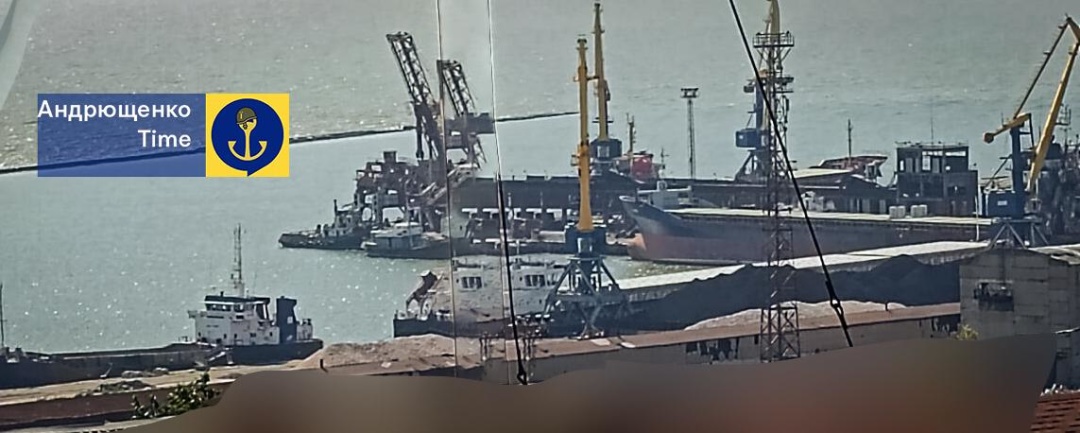
“Mariupol port. Two ships are being loaded at the same time… We expect the coal ship to head to the port of Temryuk for export clearance to Algeria, and the bulk carrier with grain to go to Egypt. Looting has predictably resumed,” reported Petro Andriushchenko, head of the Center for the Study of Occupation.
According to the Center for National Resistance, Russia has turned stolen Ukrainian grain into a global business. Wheat that Moscow claims as “Russian” is purchased by 70 countries, including Egypt, Türkiye, and Iran.


© PA Wire


© Meng Delong/VCG, via Getty


© Andrea Verdelli for The New York Times


© PA Wire




© Alamy/PA
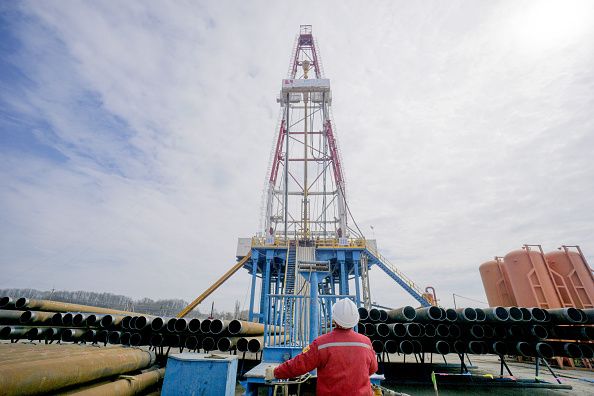

Ukraine's state energy giant Naftogaz has commissioned a new exploration well producing 383,000 cubic meters of natural gas per day through its subsidiary Ukrgazvydobuvannya, CEO Sergii Koretskyi announced on July 8.
The 5.7-kilometer deviated well was drilled and commissioned six weeks ahead of schedule as Ukraine works to boost domestic production amid Russian attacks on its energy infrastructure, including gas storage facilities in western Ukraine.
"This is a significant achievement, given the country's need for gas," Koretskyi said.
Naftogaz produces the lion's share of Ukrainian gas, but its production facilities were severely damaged in a series of Russian missile strikes earlier this year, reducing production by as much as 40%.
According to data from Naftogaz, Ukrgazvydobuvannya lost about 50% of its production due to shelling.
Ukrgazvydobuvannya managed to increase commercial gas production to 13.9 billion cubic meters (bcm) in 2024 compared to 13.2 bcm in 2023, commissioning 83 new wells despite wartime conditions.
Ukraine previously produced 52 million cubic meters daily before Russia's full-scale invasion, but required 110-140 million cubic meters during winter months, covering the shortfall from underground storage.
Russian strikes have repeatedly targeted Ukraine's gas infrastructure, including a February 11 combined missile and drone attack that damaged Naftogaz production facilities in Poltava Oblast.
To secure winter supplies, Naftogaz has signed four contracts with Poland's Orlen for delivery of 440 million cubic meters of U.S. liquefied natural gas. The latest agreement, announced July 2, covers an additional 140 million cubic meters.
According to Bloomberg estimates, in 2025 Ukraine may import a record 5 billion cubic meters of gas from Europe.
Ukraine's gas storage situation has also deteriorated significantly, with underground reserves falling to 6.02 bcm as of May 11 — the lowest level in at least 11 years.
The facilities are operating at just 19.4% capacity, with 2.79 billion cubic meters less gas available than the previous year.
 The Kyiv IndependentDominic Culverwell
The Kyiv IndependentDominic Culverwell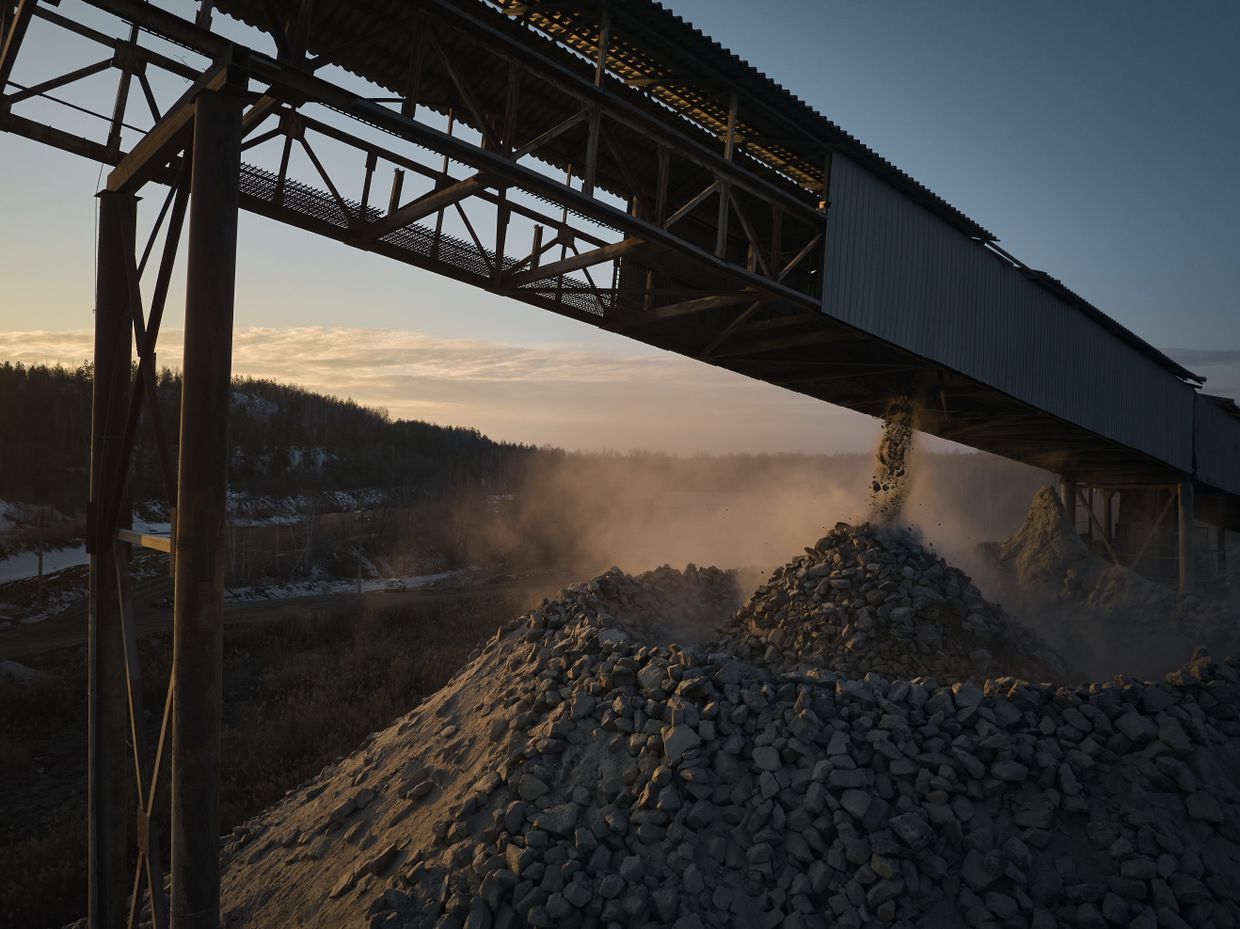
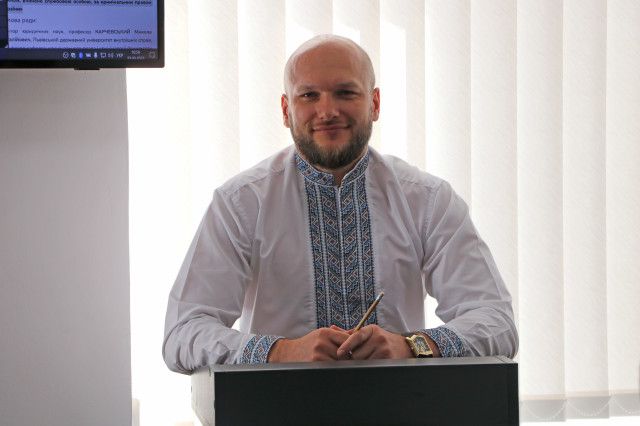

Ukraine's Cabinet of Ministers rejected a nominee to lead the economic crimes agency, drawing swift criticism from lawmakers and businesses over alleged interference in the selection process.
The agency, the Bureau of Economic Security, was created in 2021 to investigate economic crimes. It has since faced accusations of being used to pressure — and in some cases extort — businesses, prompting multiple calls and efforts to overhaul it.
Selecting a new director of the agency by the end of July is one of Ukraine's obligations to the EU and International Monetary Fund as part of international financing packages extended to the war-torn country by the institutions.
As part of a recent attempt to relaunch the bureau, Oleksandr Tsyvinsky on June 30 was officially nominated by the bureau's selection commission that consists of six members — three from the government and three international experts. Tsyvinsky is known for exposing schemes involving illegal land seizures in Kyiv..
But Ukraine's government on July 8 said it had rejected Tsyvinsky following alleged concerns raised by the country's intelligence service of potential Russian connections.
The government unanimously decided to ask the commission to submit two new candidates who meet all security requirements, the government press service wrote on its official Telegram channel, a move it claims aligns with the law.
Following Tsyvinsky's nomination, it was revealed that his father holds a Russian passport. He has said he hasn't spoken to his father, who lives in Russia, in years.
Tsyvinsky holds clearance for state secrets and has passed special vetting, backed by over 20 years in law enforcement, including nearly a decade at the National Anti-Corruption Bureau of Ukraine (NABU).
Opposition lawmaker Yaroslav Zhelizniak, said the government had no grounds to reject a properly nominated candidate, claiming President Volodymyr Zelensky's office is behind the blocking of the nomination.
"The (bureau's) legislation provides no legal grounds for the cabinet to demand a new shortlist or impose additional, undefined requirements such as 'security criteria.' The term itself is absent from any statute and therefore has no legal force," Zhelizniak said.
"The SBU letter in this case is nothing more than an indicator of the winner's disloyalty to the President's Office and a desire to block the appointment," said Olena Shcherban, deputy executive director of the AntAC in a statement following the news.
Major business associations have called on Zelensky, Parliament Speaker Ruslan Stefanchuk, and Prime Minister Denys Shmyhal to reverse the government's decision.
The business groups warned that failing to reform the agency will harm investment decisions, particularly as Ukraine's wartime economy needs to attract capital.
"War is a time for radical changes in the rule of law and business climate, otherwise the economy cannot ensure the country's survival," the businesses wrote in an open letter.
 The Kyiv IndependentLiliane Bivings
The Kyiv IndependentLiliane Bivings
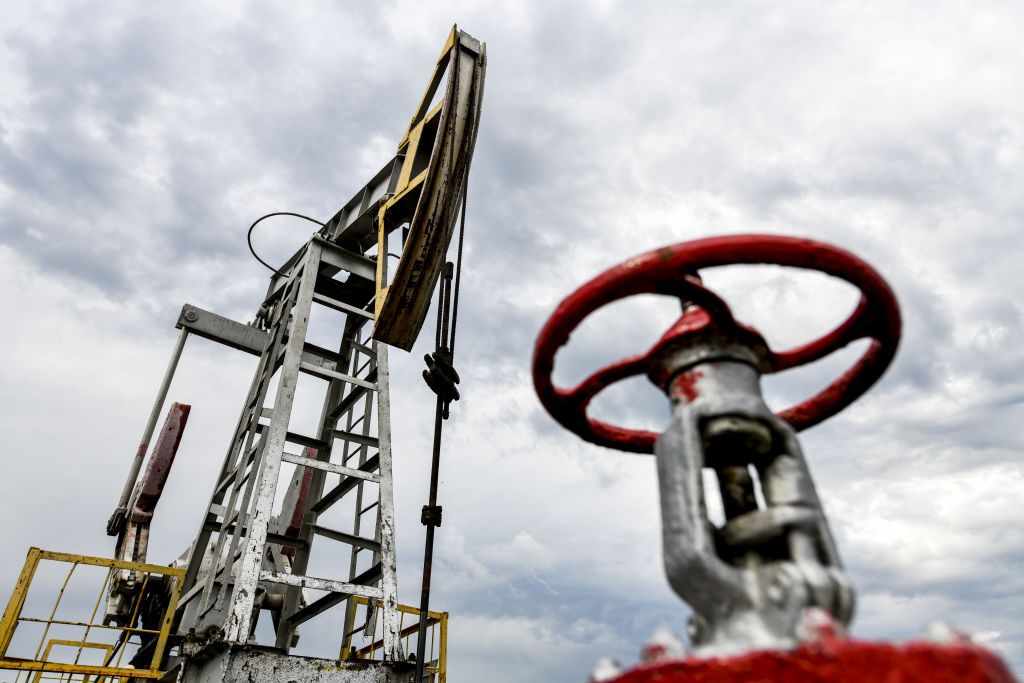

Russia's crude oil production in June fell below its agreed-upon OPEC+ target, according to individuals familiar with the data interviwed by Bloomberg.
Russian producers reportedly pumped 9.022 million barrels per day last month, a figure 28,000 barrels per day below the required level, including compensation cuts. This marks the largest gap between Russia's output and its monthly quota this year, based on Bloomberg's calculations.
Historically, Russia, which co-leads the OPEC+ alliance with Saudi Arabia, has faced criticism for poor compliance with production quotas. However, the nation has shown improved adherence for most of 2025, often pumping below its required levels, according to analysis of Russian data. This increased focus on production discipline follows earlier critiques from Riyadh.
Under the terms of the OPEC+ agreement, Russia's daily production quota for June had increased by 78,000 barrels to 9.161 million barrels. However, Moscow had also committed to a 111,000 barrel-a-day compensation cut for the month, bringing its actual output target to 9.050 million barrels per day.
On July 5, eight OPEC+ nations collectively agreed to raise production by 548,000 barrels per day in August, aiming to capitalize on strong summer consumption. Analysts suggest these additional barrels may be quickly absorbed but could contribute to a crude surplus later in the year.
Independent verification of Russia's oil output data has become challenging since Moscow classified official figures after Western sanctions targeting the nation's energy industry following its full-scale invasion of Ukraine. Consequently, market watchers now largely rely on indicators such as seaborne exports and domestic refinery runs to track trends in Russia's oil production.
 The Kyiv IndependentMartin Fornusek
The Kyiv IndependentMartin Fornusek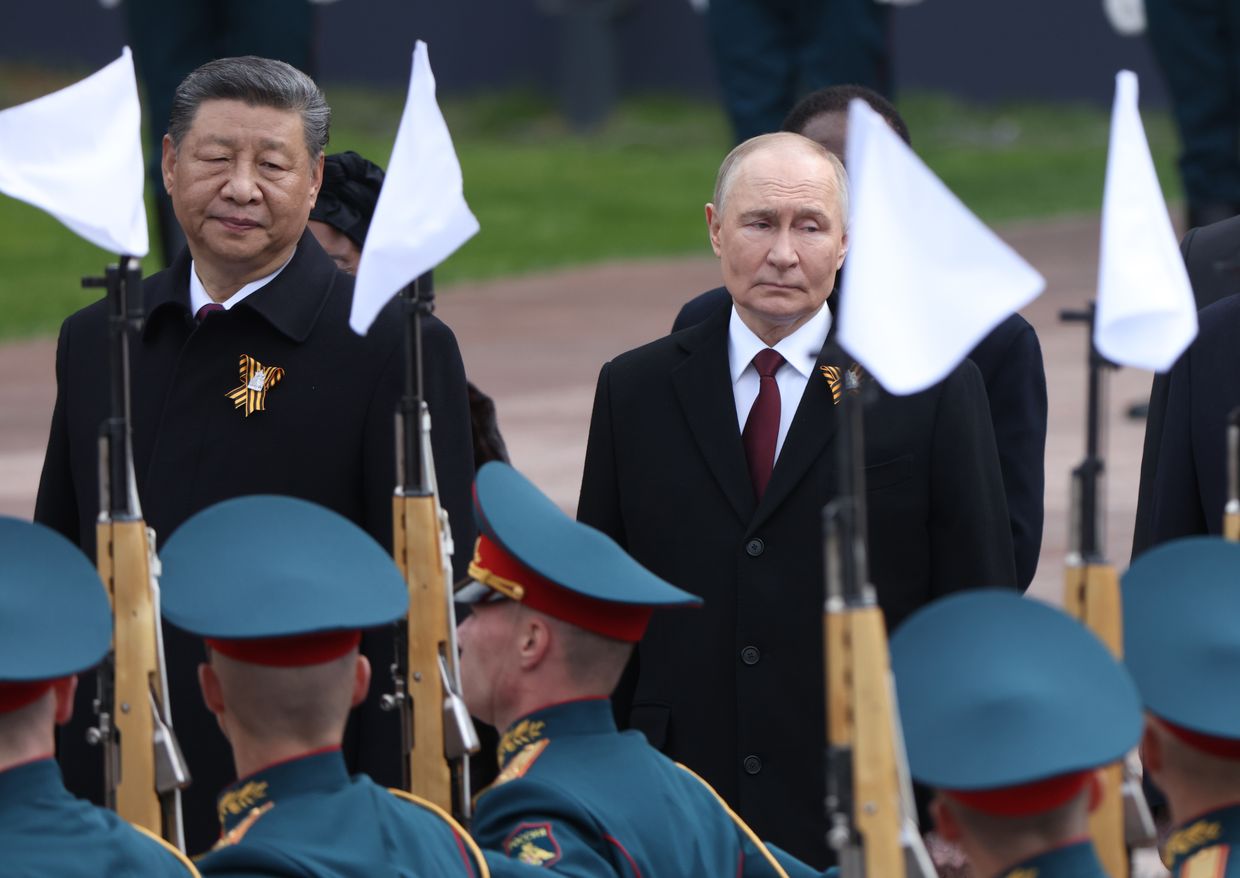
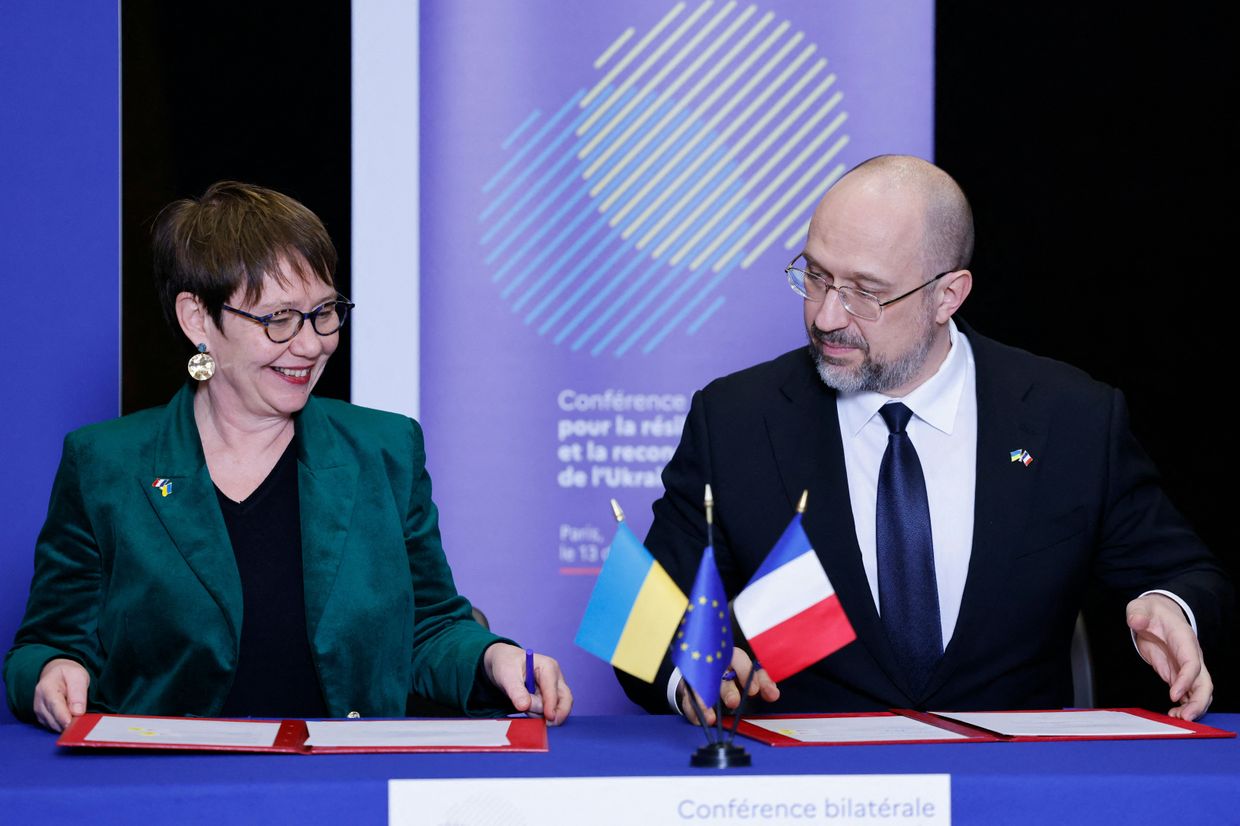

The European Bank for Reconstruction and Development (EBRD) will enable Ukrainian banks to provide up to 900 million euros ($1.05 billion) in new loans by sharing credit risks, the EBRD announced in a press release on July 7.
The loans will target companies in agribusiness, manufacturing, pharmaceuticals, transport and logistics, as well as energy security projects.
The mechanism will be announced at the Ukraine Recovery Conference (URC) in Rome on July 10-11. This represents the largest risk-sharing facility implemented in Ukraine since the war began, according to the EBRD's press release.
Due to destructive Russian attacks on Ukrainian energy infrastructure, the EBRD will also focus on supporting distributed generation and renewable energy projects.
Russian forces have damaged most of Ukraine's thermal power plants and about 30% of power stations, disrupting nearly two-thirds of the country's total electricity generation, the bank says.
The EU, together with other EBRD donors, has developed plans to de-risk renewable energy investments to attract more private capital, which they will announce at the URC.
Nearly one-third of EBRD's wartime financing to Ukraine — 2.4 billion euros ($2.8 billion) — has gone to the energy sector. This includes support for state-owned electricity transmission and gas companies, as well as financing for hydropower and small-scale distributed generation.
In a pre-URC press release, the EBRD also expressed interest in supporting the development of a natural graphite deposit in Ukraine following the U.S.-Ukraine minerals agreement. Graphite is a strategic material used in batteries and defense applications.
The bank will launch the second phase of digitizing Ukraine's paper-based geological data archive to make information about mineral deposits more accessible, the EBRD reports.
Since Russia's full-scale invasion in 2022, the EBRD has invested over 7.2 billion euros ($8.4 billion) in Ukraine's economy.
 The Kyiv IndependentTim Zadorozhnyy
The Kyiv IndependentTim Zadorozhnyy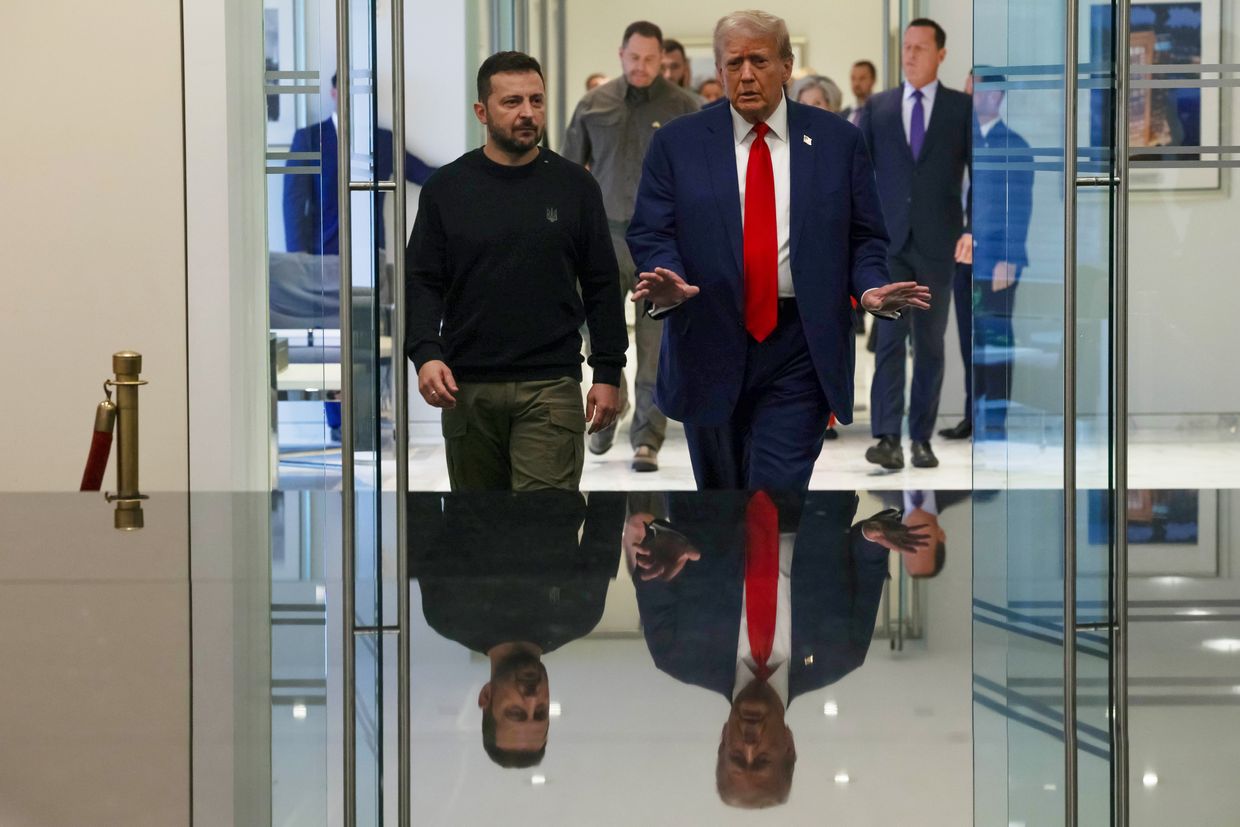
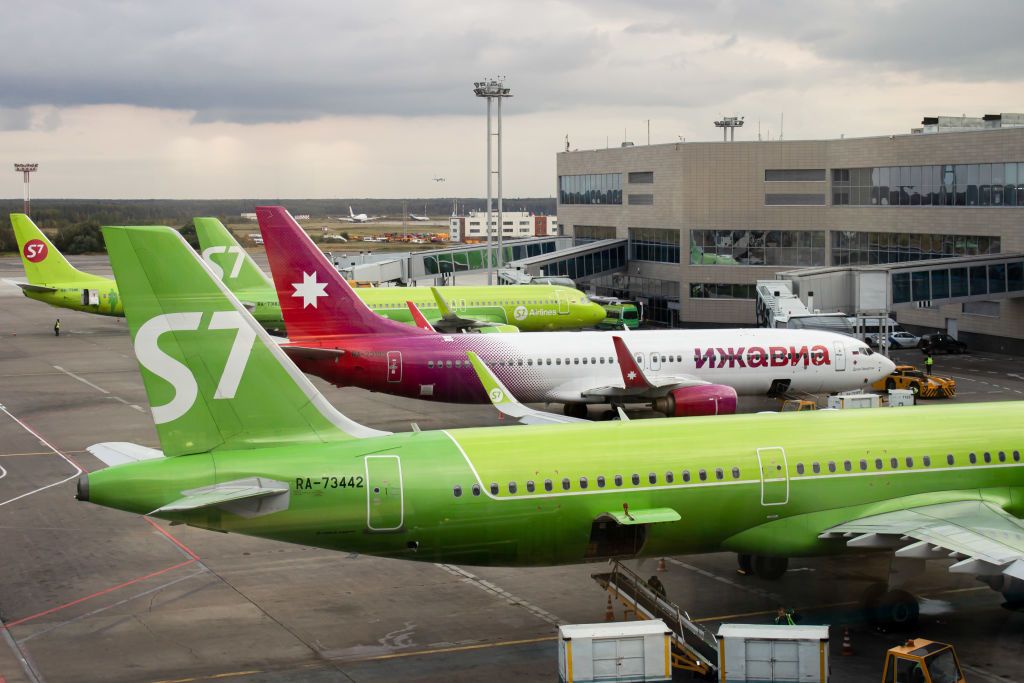

Major shutdowns at Russia's key airports on July 5–6 caused by Ukrainian drone attacks could cost Russian airlines around 20 billion rubles ($254 million), the pro-Kremlin outlet Kommersant reported on July 7, citing airline representatives and industry experts.
Since the start of mass disruptions on July 5, a total of 485 flights were canceled, 88 were diverted to alternate airports, and another 1,900 were delayed across major hubs, according to Russia's aviation agency Rosaviatsiya.
The drone attacks prompted operational shutdowns that triggered widespread logistical and economic consequences. Over 94,000 passengers were housed in hotels, 43,000 refunds were processed, and hundreds of thousands of vouchers for food and drinks were issued.
The estimated financial toll includes direct airline losses from canceled Boeing 737-800 flights, which can run between 15 million and 23 million rubles ($190,000–$292,000) each depending on the route, as well as costs for delays, diversions, and passenger care.
Experts say the true cost could be far higher. Dmitry Datsykov of EXPO.UAV estimated tens of billions of rubles in additional indirect losses, including missed connections, taxi and hotel losses, and supply chain disruptions.
Ukraine has not publicly claimed responsibility for the disruptions but has acknowledged that its drone strategy aims to undermine Russian logistics and force the war's consequences closer to the Russian public.
The economic fallout comes amid growing scrutiny of Russia's transport sector. On July 7, President Vladimir Putin dismissed Transport Minister Roman Starovoit following the aviation chaos and a high-profile ammonia leak at the Ust-Luga port.
The Kremlin has increasingly struggled to protect critical infrastructure from Kyiv's deep-strike drone campaign, which in recent months has expanded to include refineries, radar plants, and now Russia's busiest airports.
 The Kyiv IndependentTim Zadorozhnyy
The Kyiv IndependentTim Zadorozhnyy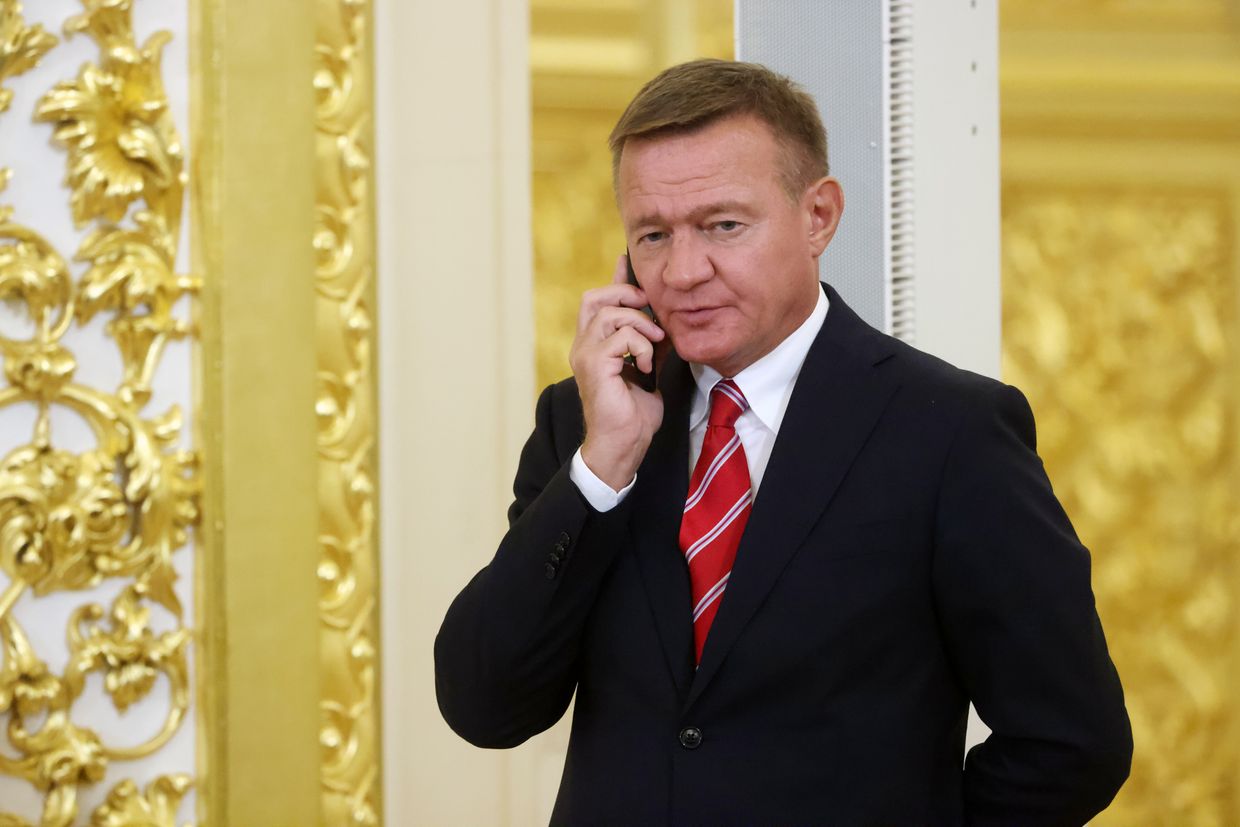
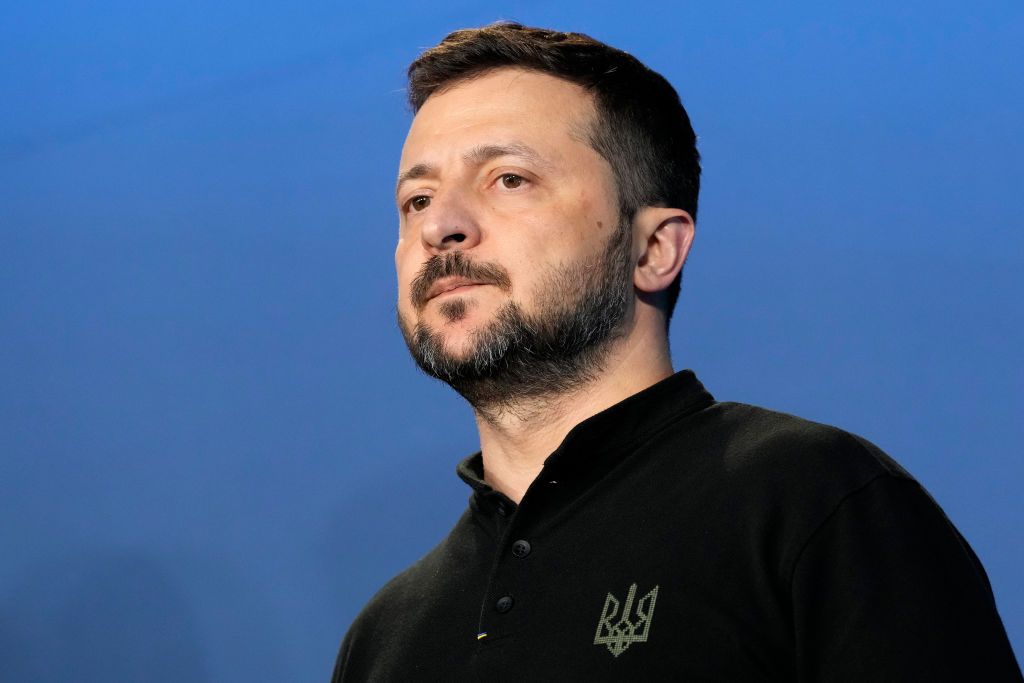

Ukraine on July 6 imposed sanctions aimed at countering Russian financial schemes, including those involving cryptocurrency, President Volodymyr Zelensky announced in his evening address.
Restrictions were imposed on 60 legal entities and 73 Russian citizens.
The latest sanctions package includes Ukrainian-led initiatives and must also align with restrictions imposed by international partners, according to Zelensky.
Ukraine will continue working with its partners to coordinate sanctions across different jurisdictions in the future, he added.
Zelensky also announced that the Ukrainian government is set to unveil new measures next week, aimed in part at aligning with European Union sanctions against Russia.
"All European packages against Russia should be implemented in the Ukrainian jurisdiction. Just like Ukrainian sanctions in the European Union," Zelensky said.
At the end of June, Zelensky imposed sanctions on 52 Russian citizens, 34 Russian companies, and one Chinese entity involved in the production of Shahed drones and chip manufacturing machinery.
Drones have become one of the defining tools of the full-scale war, used extensively by both Ukraine and Russia for surveillance, long-range strikes, and tactical battlefield advantage.
 The Kyiv IndependentFrancis Farrell
The Kyiv IndependentFrancis Farrell
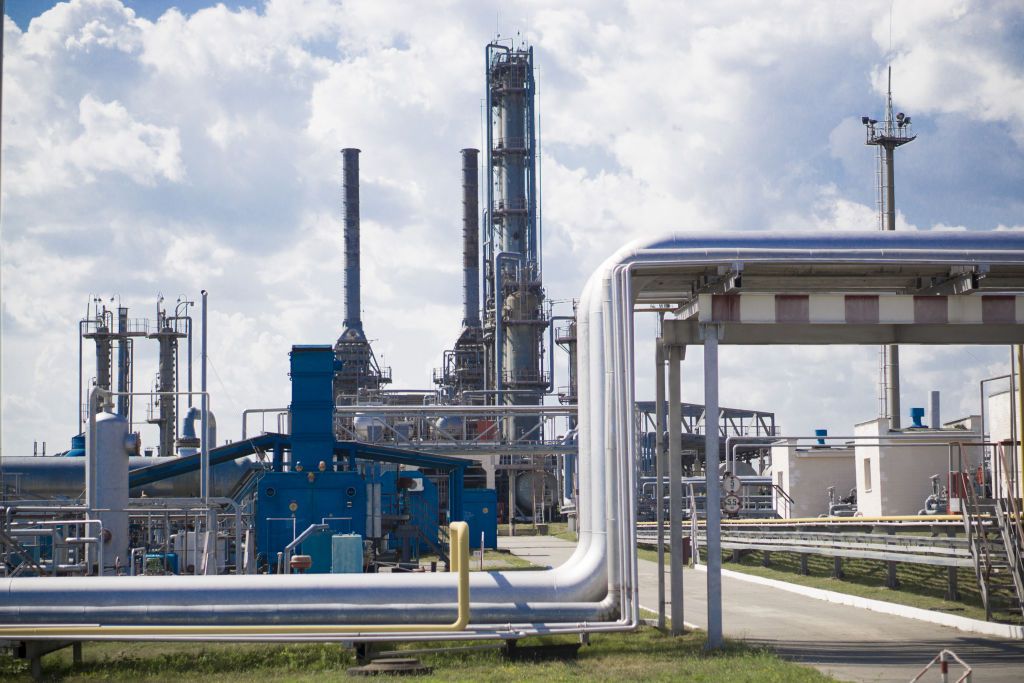

BlackRock, a U.S. investment firm, suspended work on a multibillion-dollar Ukraine recovery fund following U.S. President Donald Trump's election victory, prompting France to work on a replacement, Bloomberg reported on July 5.
The plan nearly secured the initial support of institutions backed by the governments of Germany, Italy, and Poland, people familiar with the matter told Bloomberg.
Kyiv has sought to secure investment in Ukraine's reconstruction as Russia's war continues to destroy infrastructure across the country.
BlackRock halted its search for institutional investors in January, causing the planned funding that sought to secure $500 million from governments, development grants, and investment banks, and another $2 billion from private investors, to fall through.
The investment firm halted talks with institutional investors in January due to a lack of interest amid perceived uncertainty in Ukraine.
The fund was set to be unveiled by BlackRock at the upcoming Ukraine Recovery Conference on July 10-11 in Rome, Bloomberg reported.
A spokesperson for BlackRock said the investment firm completed advisory work for the recovery fund pro bono in 2024 and no longer has "any active mandate."
France is working on a proposal to replace the recovery fund led by BlackRock, people familiar with the matter told Bloomberg, adding that it remains uncertain how effective the plan will be without Washington's backing.
President Volodymyr Zelensky and Italian Prime Minister Giorgia Meloni are expected to attend the Ukraine Recovery Conference next week.
Despite a partial rebound from a 30% economic slump in 2022, foreign investment in Ukraine remains underwhelming.
 The Kyiv IndependentDominic Culverwell
The Kyiv IndependentDominic Culverwell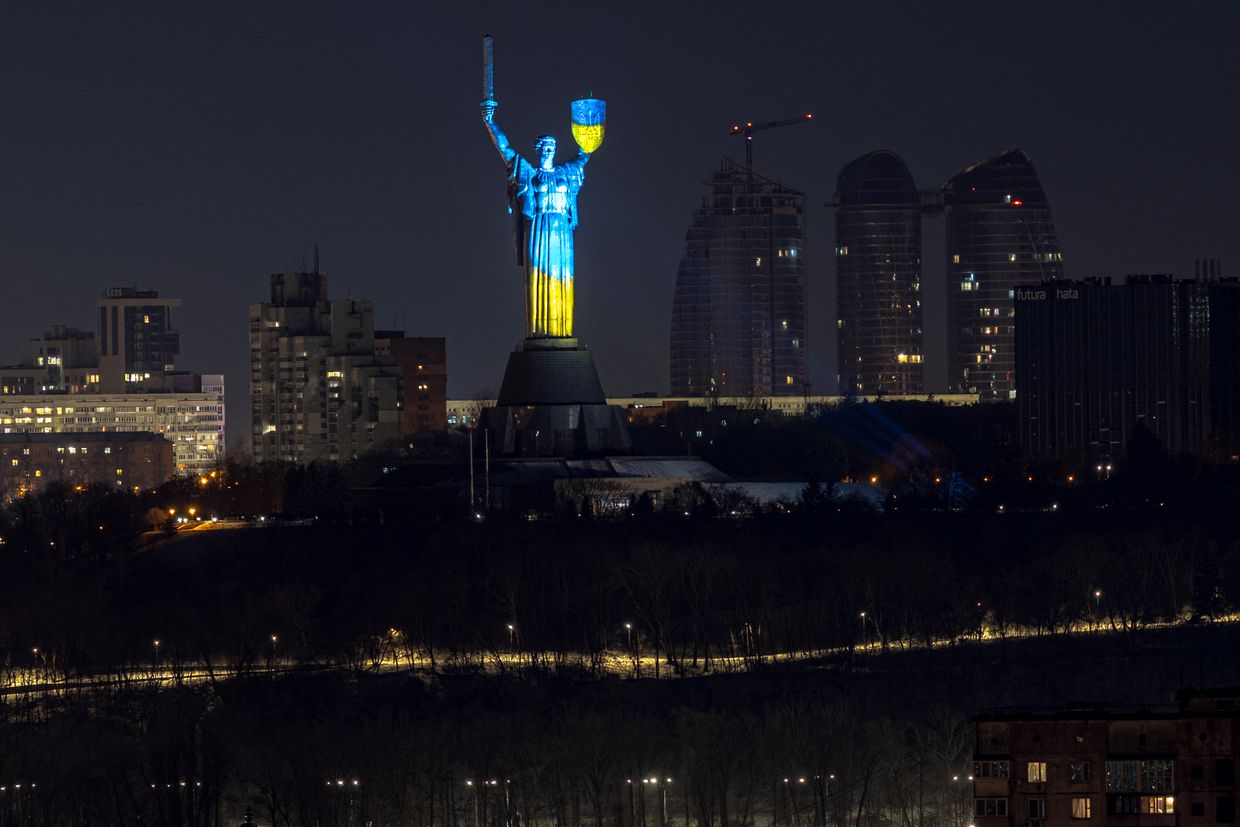
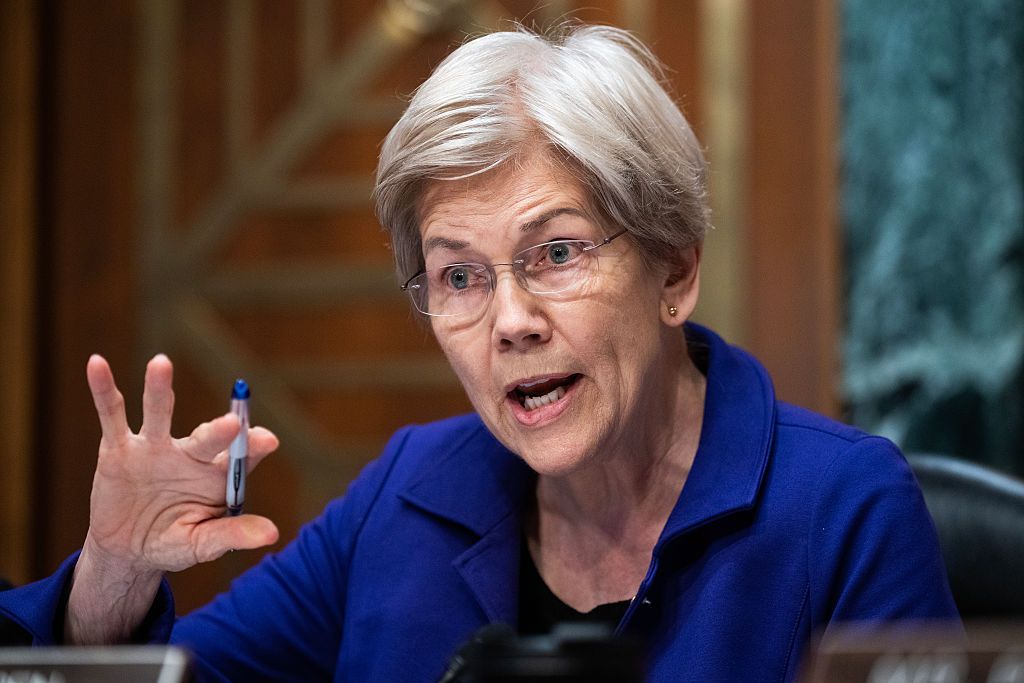

Three Democratic Senators have launched an investigation into U.S. President Donald Trump's refusal to impose new sanctions against Russia, the legislators announced in a joint statement on July 3.
Since taking office in January, Trump has passed no new sanctions against Moscow. In some cases, he has even eased restrictions, even as Russia intensifies its full-scale war against Ukraine.
Senate Democrats Jeanne Shaheen, Elizabeth Warren, and Chris Coons called on the administration to impose new penalties on the Kremlin and said they planned to investigate Trump's "five-month pause" on sanctions.
"Americans should be asking why a president who says he wants to end a major war is instead letting the aggressor run rampant," the senators said in a joint statement issued July 3.
The statement followed an analysis by the New York Times (NYT), published July 2, which found that Washington's slowed momentum on sanctions created more opportunities for shell companies to funnel sanctioned goods into Russia.
Former U.S. President Joe Biden imposed an average of 170 new sanctions per month on entities tied to Moscow between 2022-2024, according to the NYT. Overall, the Biden administration slapped 6,200 penalties on individuals, businesses, ships, and aircraft connected to Russia.
Without new sanctions to maintain pressure on Moscow, the effects of the Biden sanctions regime have begun to erode, the NYT reported. An analysis of trade records and other data. showed that over 130 companies in China and Hong Kong are advertising sales of sanctioned computer chips to Russia. Despite this illegal activity, none of the companies have been sanctioned.
 The Kyiv IndependentAndrea Januta
The Kyiv IndependentAndrea Januta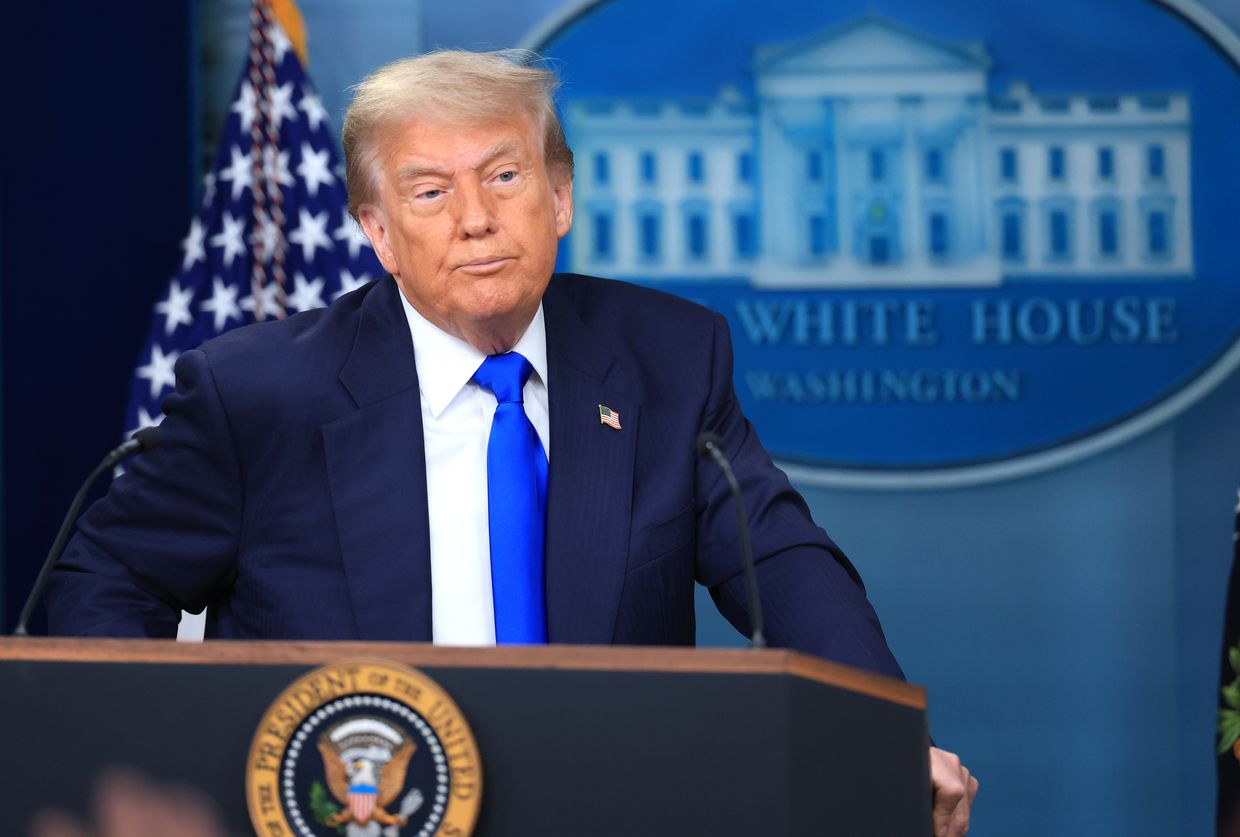
"On top of halting key assistance to Ukraine, President Trump has blocked regular updates to our sanctions and export controls for five months and counting—enabling a growing wave of evaders in China and around the world to continue supplying Russia's war machine," Senators Shaheen, Warren, and Coons said in their statement.
The senators called on Trump to "actively enforce the existing sanctions against Russia" and urged the administration to partner with EU and G7 nations to mount pressure on Moscow.
"Instead of taking clearly available steps to pressure the aggressors, President Trump is doing nothing and we will be investigating this missed opportunity to push for an end to this war," they said.
Along with letting U.S. sanctions on the Kremlin go stagnant, the Trump administration has removed sanctions on Karina Rotenberg, the wife of a key ally of Russian President Vladimir Putin, and notably exempted Russia from its sweeping "Liberation Day" tariffs.
reportedly obstructed bipartisan congressional efforts to target the Russian economy. Trump has asked Republican senators to weaken a proposed sanctions bill and has urged delays in a vote on the legislation.
The bipartisan sanctions bill, introduced by Republican Senator Lindsey Graham and Senate Democrat Richard Blumenthal, seeks to impose a 500% tariff on imports from countries that continue purchasing Russian oil and raw materials.
 The Kyiv IndependentThe Kyiv Independent news desk
The Kyiv IndependentThe Kyiv Independent news desk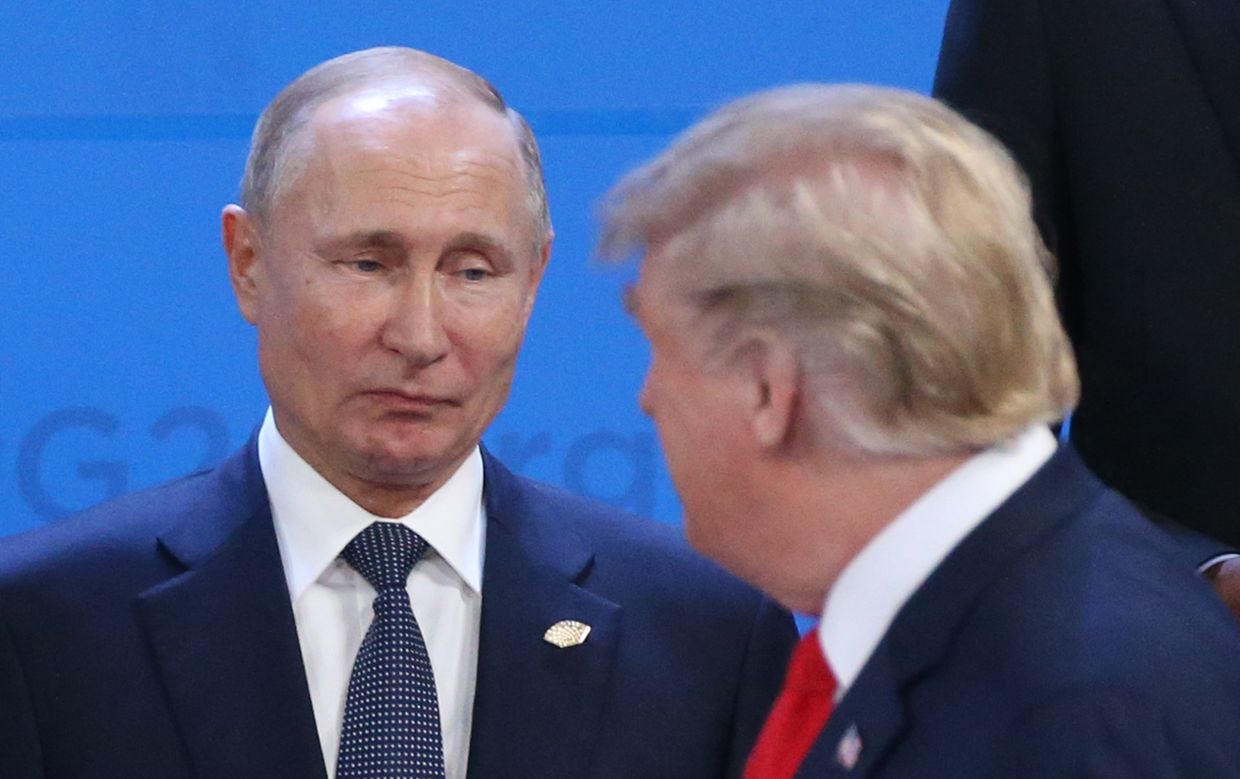
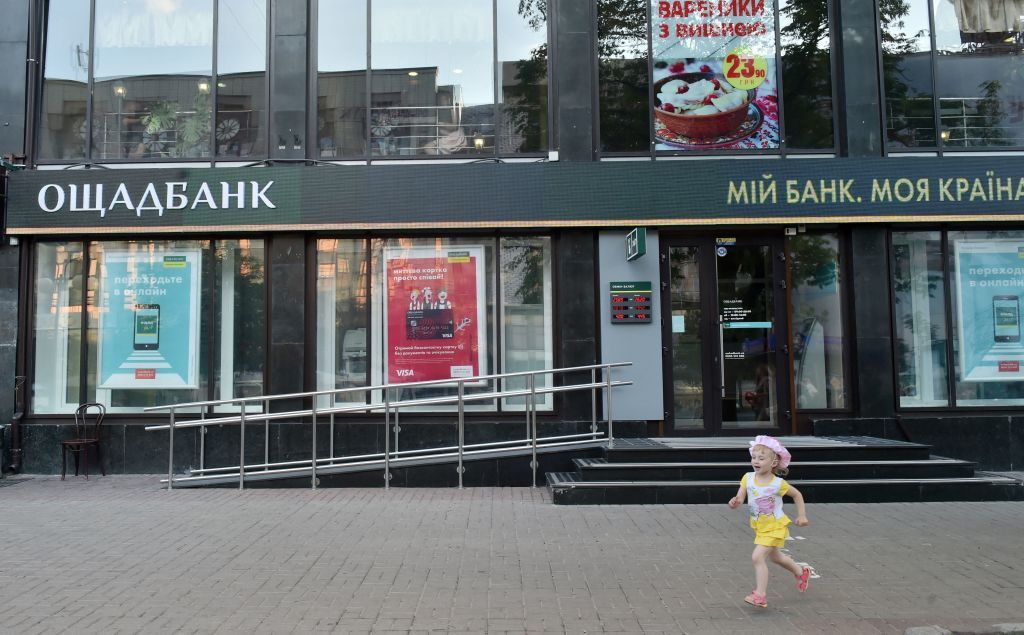

Ukraine’s Oschadbank won an appeal against Russia on July 1 after the Paris appeals court rejected Moscow’s challenge to a 2018 arbitration ruling ordering compensation for losses due to Russia's annexation of Crimea, the bank announced in a press release on July 3.
The Paris Court of Appeal upheld the November 2018 arbitration tribunal decision requiring Russia to compensate Oschadbank for damages incurred when Moscow annexed the Ukrainian peninsula in 2014.
The ruling orders Russia to pay more than $1.5 billion in damages and an additional 300,000 euros ($330,000) in legal costs to Ukraine's largest state-owned bank, according to a press release.
"The victory proves that efforts to force the aggressor state to answer legally for damages caused by the occupation of part of Ukraine's territory have good prospects," said Rosa Tapanova, a member of Oschadbank's supervisory board.
Oschadbank Chairman Serhii Naumov said it's the first Ukrainian bank to win such a case against Russia.
The decision follows Oschadbank's recent seizure of over 87 million euros ($102 million) in Russian assets in France as part of its campaign to recover war-related losses. The bank has been pursuing Russian assets across multiple jurisdictions to enforce the arbitration award.
"We understand that the Russian Federation will never voluntarily comply with the court's decision, and we are prepared for a long struggle," said Arsen Miliutin, deputy chairman of Oschadbank's management board.
"At the same time, we are confident that we will win, and Russia will pay not only the amount of damages caused, but also interest for all this time."
The Oschadbank victory adds to a growing list of Ukrainian legal wins against Russia. On June 23, Naftogaz CEO Serhii Koretskyi announced that an international arbitration tribunal in Switzerland had ordered Russia's Gazprom to pay the Ukrainian state energy company $1.37 billion after the Russian firm stopped fulfilling contract obligations in May 2022.
 The Kyiv IndependentAndrea Januta
The Kyiv IndependentAndrea Januta
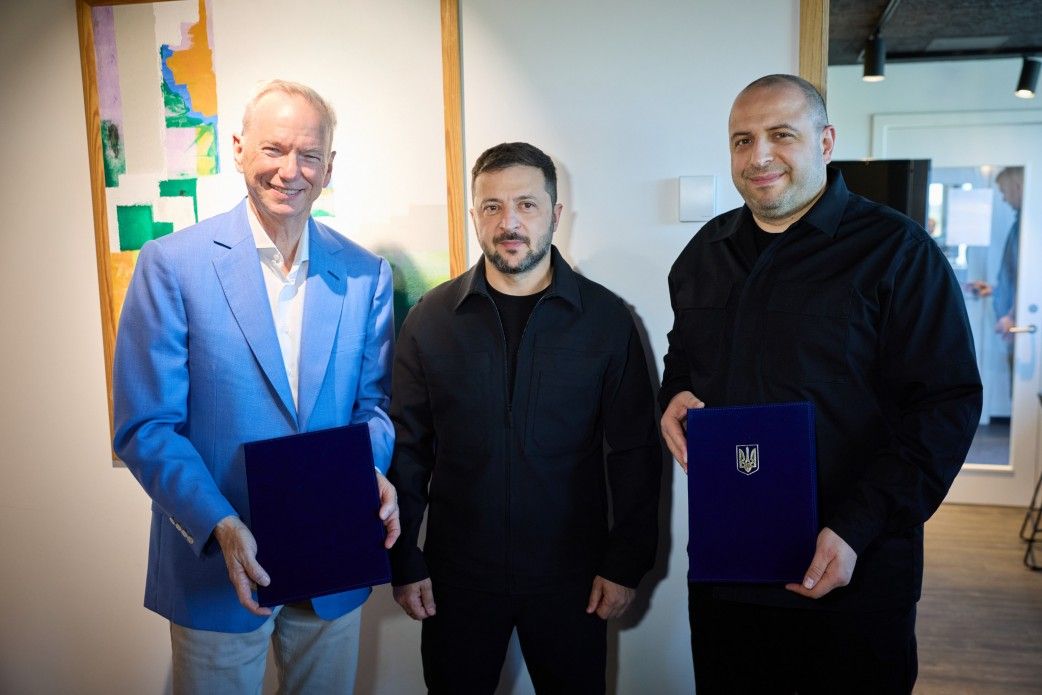

Ukraine signed a major deal with U.S. company Swift Beat to co-produce hundreds of thousands of drones this year, President Volodymyr Zelensky announced on July 3 during his visit to Denmark.
The long-term strategic partnership agreement was signed by Ukraine's Defense Minister Rustem Umerov and Eric Schmidt, the CEO of Swift Beat, in Denmark on the same day.
Under the deal, the company will produce various kinds of unmanned aerial vehicles for Ukraine, including those designed to intercept Russian drones and missiles, reconnaissance, attack, and other drones, Zelensky said in a statement published on the website of the President's Office.
"The key priority is interceptor drones that have already proven effective in Ukraine," Zelensky said. "We've tested models from several companies, and now we're signing serious contracts."
Swift Beat will increase its production capacity, aiming to produce hundreds of thousands of drones for Ukraine this year, with plans to scale up production in 2026, according to Zelensky.
"Modern drones will be supplied to Ukraine as a priority, on special terms and at cost," Zelensky said.
The announcement comes just a day after the U.S. Defense Department (DOD) has halted shipments of some air defense missiles and other weapons previously promised to Kyiv. Ukraine has been trying to negotiate buying U.S. weapons for months after U.S. President Donald Trump, who has opposed military aid to Kyiv, took office in January.
Swift Beat has a significant presence in Ukraine, according to Zelensky's office. It specializes in autonomous AI-powered drones and cooperates with Ukrainian engineers and the military, conducting drone testing on Ukrainian territory, the statement reads.
Zelensky arrived in Denmark on July 3 to mark the country's assumption of the rotating presidency of the Council of the European Union.
Zelensky also said that during his visit, he plans to raise the issue of political blockages hindering Ukraine's path to joining the European Union.
"We're ready to open three accession clusters and want to start with one now, in the very near future. But political blockages remain, purely political," he said.
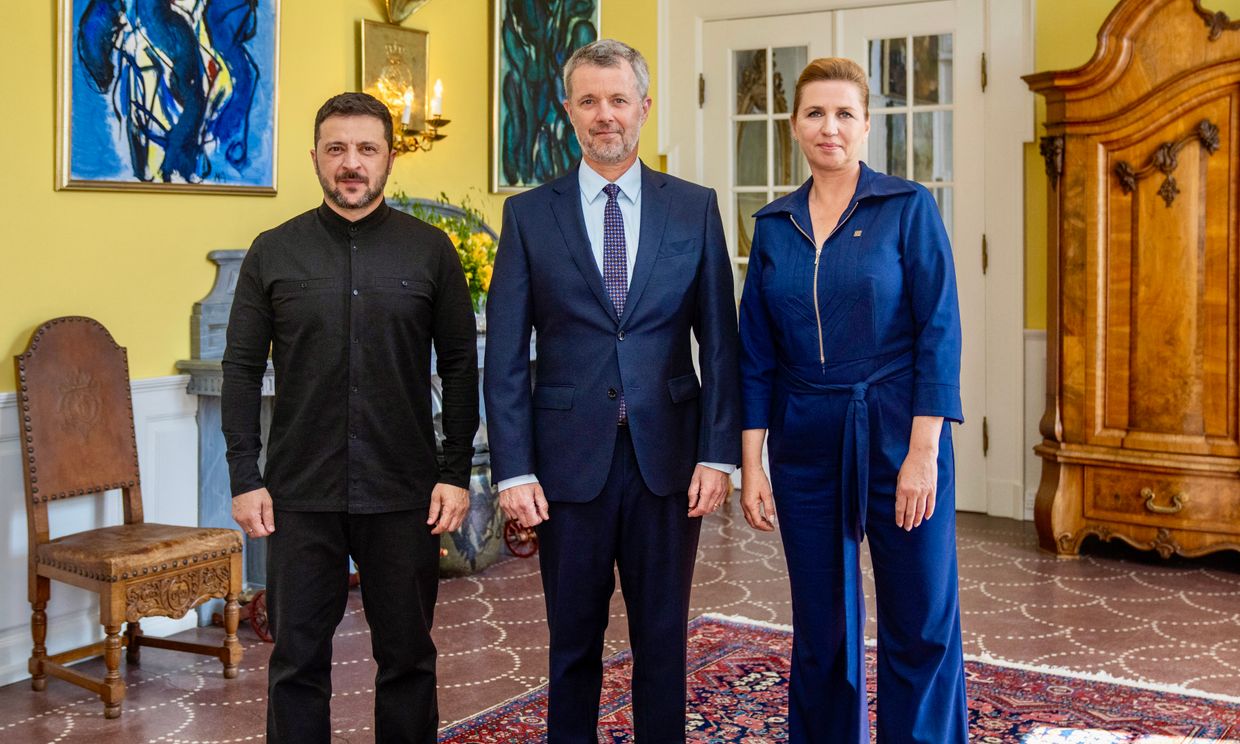
While EU member states agreed to take into account the European Commission's assessment that Ukraine is ready to open the first, Fundamentals cluster, the process remains stalled due to Hungary's refusal to grant unanimous support.
Ukraine applied for EU membership in 2022 and was granted candidate status shortly thereafter, but full negotiations require the approval of all 27 EU member states.
Denmark has been a key backer of Ukraine since the start of Russia's full-scale invasion in 2022. In February 2024, Copenhagen signed a 10-year bilateral security agreement with Kyiv, pledging long-term defense cooperation until Ukraine secures NATO membership.
Zelensky said he expects Denmark to expand its financial support for Ukraine's drone and missile production initiatives.
"What we've just signed requires significant funding. I'm counting on our relationship with Denmark," the president said.
The Ukrainian president will also participate in official events commemorating Denmark's presidency of the Council. According to Danish broadcaster DR, the events will be attended by Denmark's royal family, government officials, and EU leaders.
 The Kyiv IndependentVolodymyr Ivanyshyn
The Kyiv IndependentVolodymyr Ivanyshyn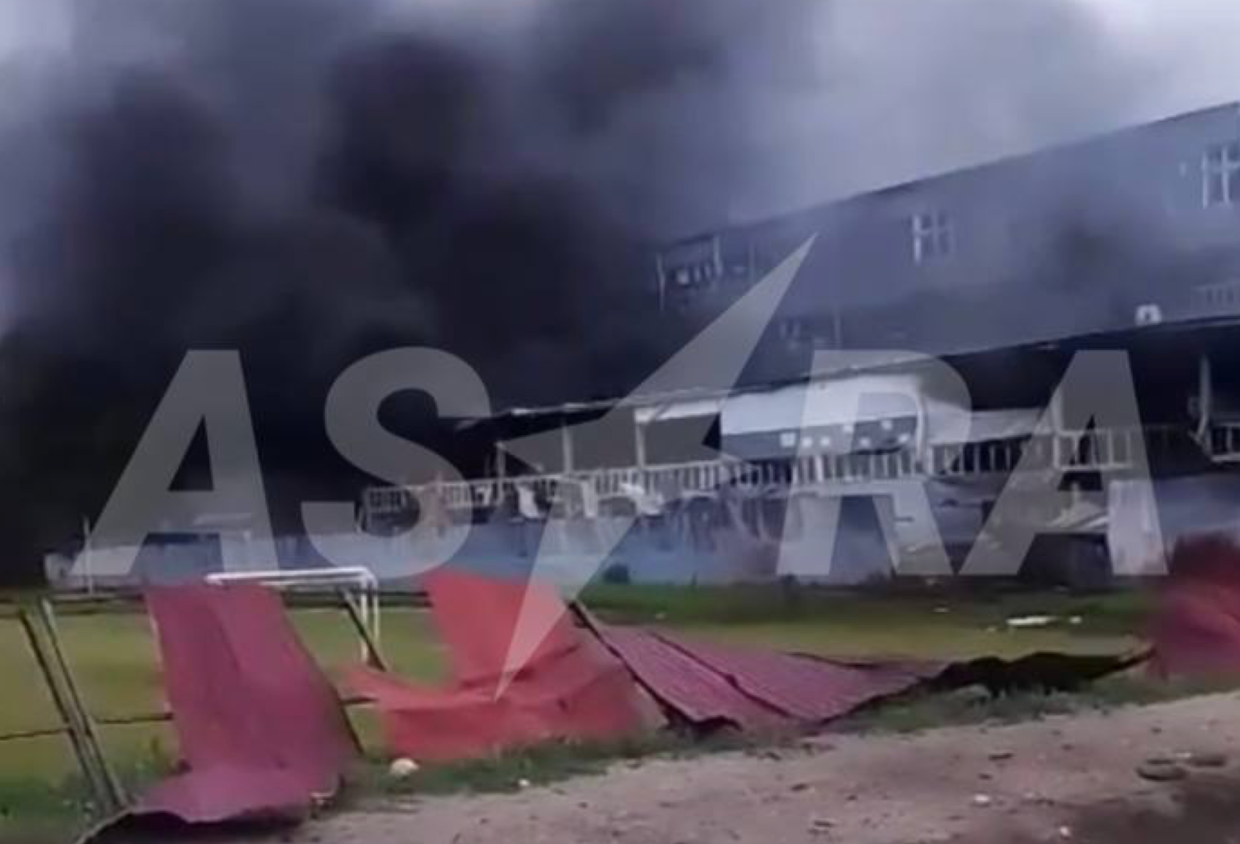
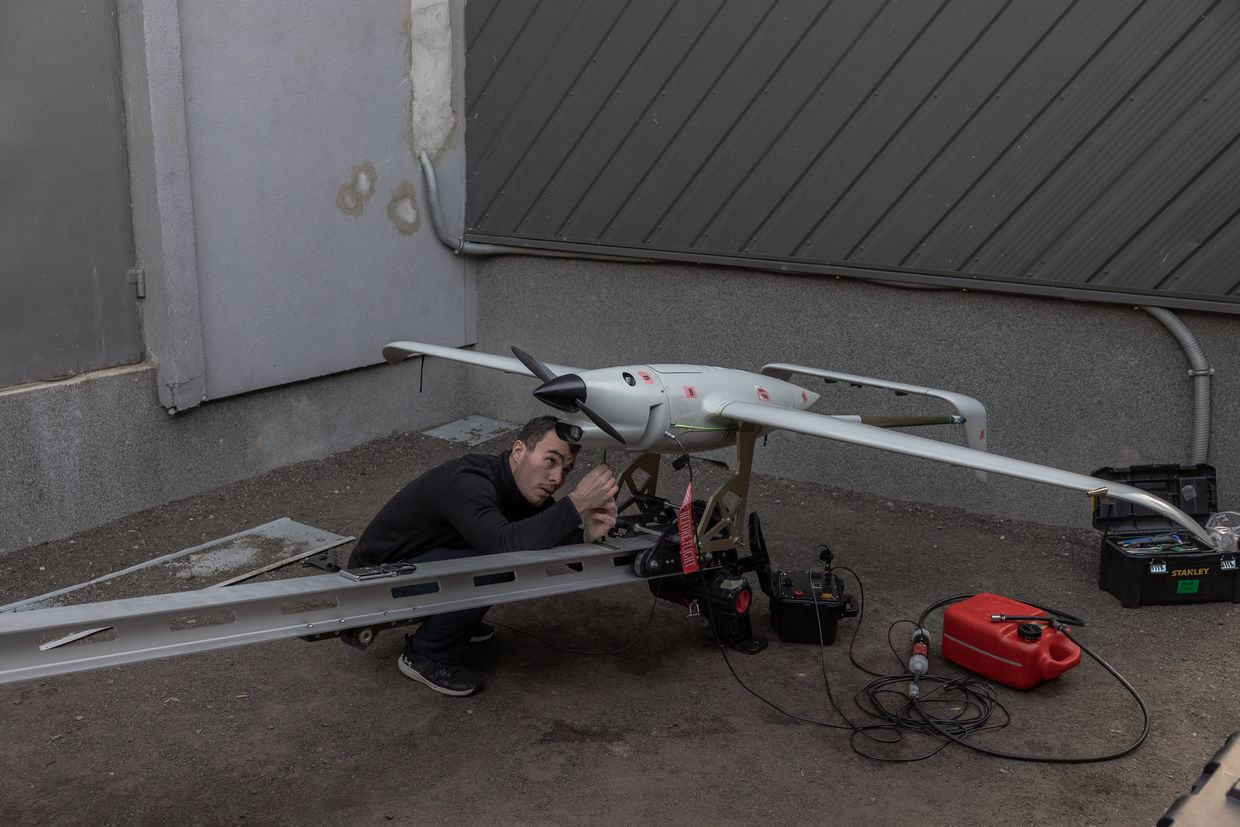

Skyeton Prevail Solutions, a joint venture between Ukrainian drone manufacturer Skyeton and U.K.-based defense company Prevail Solutions, will manufacture and supply Raybird drones in the U.K., the two companies announced on July 2.
"Skyeton — a Ukrainian unmanned aircraft systems company with 19 years of engineering pedigree, and Prevail Partners — a leading U.K. defense and security company, announced a joint venture to fast-track the volume manufacture, supply, and support for the integration of its best-in-class drone into U.K. military applications," a statement by the two companies said.
Ukraine has developed drones that have proven to be effective amid the onset of Russia's full-scale war against Ukraine in February 2022 and Russia's initial invasion of Ukraine in 2014.
President Volodymyr Zelensky and U.K. Prime Minister Keir Starmer met in London on June 23, where the two leaders agreed to an "industrial military co-production agreement."
"The joint venture will scale the availability of Raybird with new manufacturing in the U.K. for both deployment in Ukraine and provide the necessary integration expertise from Prevail Partners for U.K. and other Western militaries," the statement said.
U.K. lawmaker Iain Duncan Smith described the move as an "important step" for U.K. drone production.
Skyeton says its Raybird drone has over 350,000 flight hours and is responsible for billions of dollars in Russian losses.
Ukraine has relied on drones to meet its own defense needs, as foreign military aid has fallen short in supplying necessary weapons and air defenses.
 The Kyiv IndependentKollen Post
The Kyiv IndependentKollen Post


Ukrainian President Zelensky must consider a petition to decriminalize pornography after it reached the required 25,000 signatures, according to data on the official Ukrainian government petitions website.
Pornography production and distribution are illegal in Ukraine, with broad interpretations meaning even sharing nude photos can result in jail time.
Despite being illegal, models on subscription-based site OnlyFans, known for being an adult content platform, must declare their income and pay taxes, as required for all paid content creators.
The decriminalization petition was created by Ukrainian OnlyFans model Svetlana Dvornikova, who argued that "law enforcement should focus on real crimes instead of conducting operations to buy intimate photos."
"Over five years, I've paid more than Hr 40 million ($958,062) in taxes to the state," Dvornikova wrote in the petition.
"But instead of gratitude for this money, the state opened a criminal case against me."
In January 2025, Ukraine's OnlyFans content creators declared more than $7 million in income, paying $1.5 million in personal income and military taxes, though it's unclear what specific content these users create on the platform.
Ukrainian MP Yaroslav Zhelezniak, who has initiated bills to legalize pornography, calculated that from 2020 to 2022, 5,000 Ukrainians earned $123 million on OnlyFans.
"Porn today is mostly online platforms, and those who earn on these platforms officially pay taxes. That's millions of dollars going to the armed forces," Zhelezniak said on his YouTube channel.
The latest bill to legalize pornography was registered in November 2024 and supported by parliament's law enforcement committee in December, but hasn't been brought to a vote yet.
The bill proposes decriminalizing only the creation and storage of pornographic content by consenting adults.
Criminal liability would still apply for revenge porn, deepfake porn, extreme porn, child pornography, and distribution to minors.
"We're simply changing Article 301 of the Criminal Code so that adults who film and distribute intimate videos aren't thrown in prison for 3-5 years," Zhelezniak wrote on his Telegram channel.
"Currently, under Article 301, you can be punished even for storing nude photos on your personal phone."
In July 2022, a similar petition to legalize pornography reached the required number of signatures. It didn't lead to changes, and Zelensky responded by citing existing laws about "protecting public morality."
 The Kyiv IndependentDominic Culverwell
The Kyiv IndependentDominic Culverwell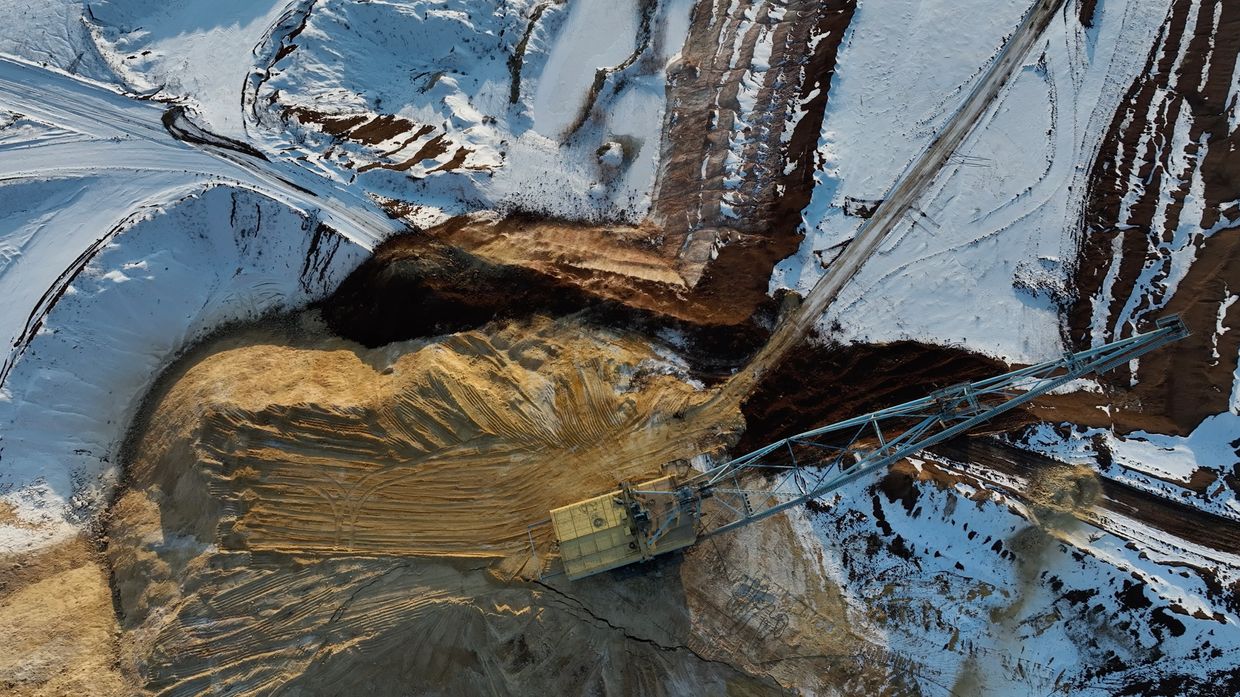
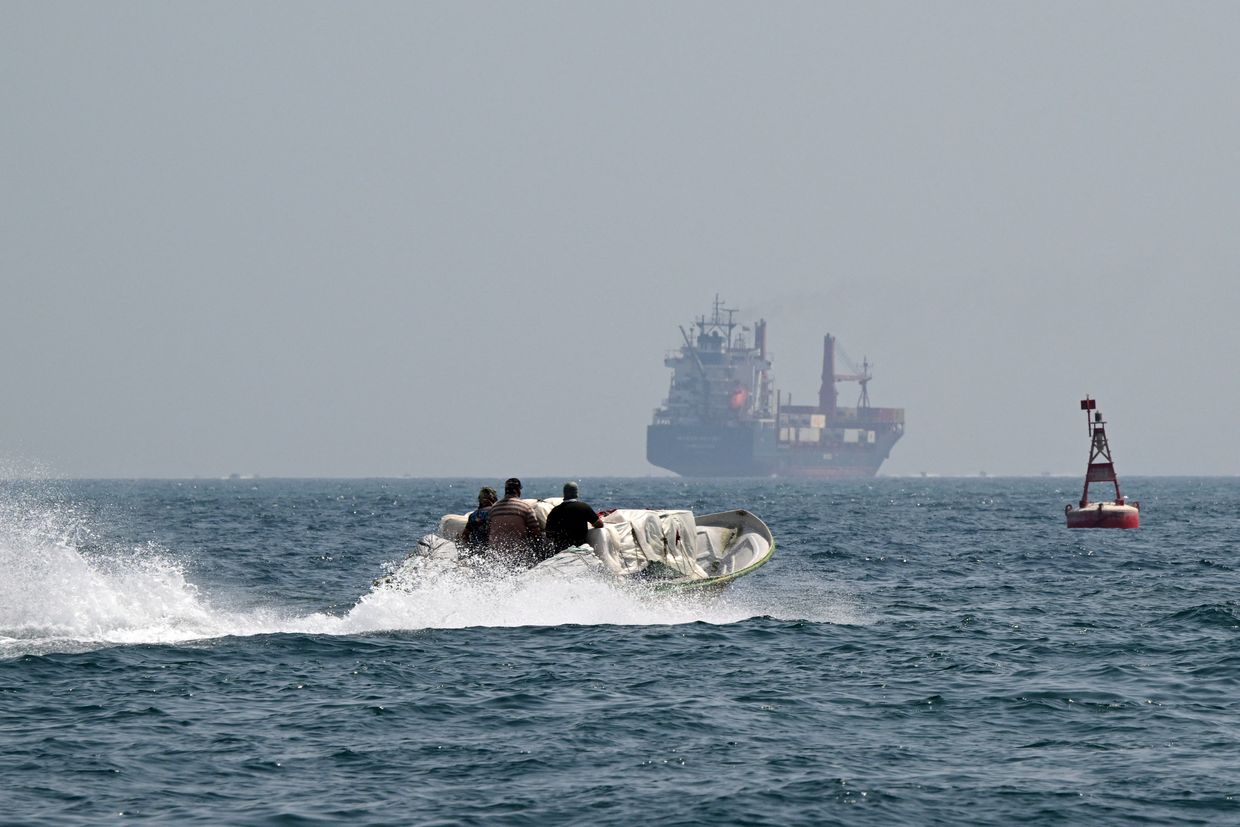

Iran is reportedly preparing to mine the Strait of Hormuz, a move that would spike global oil prices and give a significant boost to the Russian economy and its war machine in Ukraine.
Reuters reported on July 1 that Iran loaded naval mines onto vessels in the Persian Gulf last month, citing two U.S. officials, who said the preparations had been detected after Israel launched its "preemptive" attack against Iran on June 13.
Amid the conflict with Israel which has currently settled into an uneasy ceasefire, Iran has repeatedly threatened to block the Strait of Hormuz as a means of deterrence.
If the Strait were mined, Iran could block one-fifth of global oil demand and spike world energy prices — a boon for Russia's oil-dependent economy.
"Any disruption to Gulf supplies would push up global crude prices. Prices for Russian crude would rise in line," John Gawthrop, Argus Eurasia Energy editor, told the Kyiv Independent.
Russia’s energy sector made up 35-40% of its budget revenues pre-full-scale invasion and is powering its war machine.
Western sanctions on Russian energy and the G7’s Russian oil price cap of $60 per barrel have hampered its profits, with Russia losing more than $150 billion over the last three years, but have yet to deal a crippling blow.
The conflict between Israel and Iran caused a spike in prices — Brent crude, the global benchmark, on June 13 jumped from $69.36 to $75 per barrel, a surge that looked like it could grant Russia's economy a reprieve.
Until the Israeli attacks, the future for Russian crude wasn’t looking so bright. Europe was planning its 18th sanctions package targeting Russia's energy sector, and the G7 was pushing for a $45 price cap. Hungary and Slovakia have since blocked the sanctions package.
Prices have since settled along with the conflict and on July 2 Brent crude was $67.50, but if Iran does go ahead with mining the Strait of Hormuz, blocking one-fifth of global oil demand, another surge would follow.
This would also mean Iran blocks its own oil exports too, so it would only be a last resort from Tehran, David Fyfe, chief economist at Argus Media, a market analyst group, told the Kyiv Independent last month.
 The Kyiv IndependentTim Zadorozhnyy
The Kyiv IndependentTim Zadorozhnyy
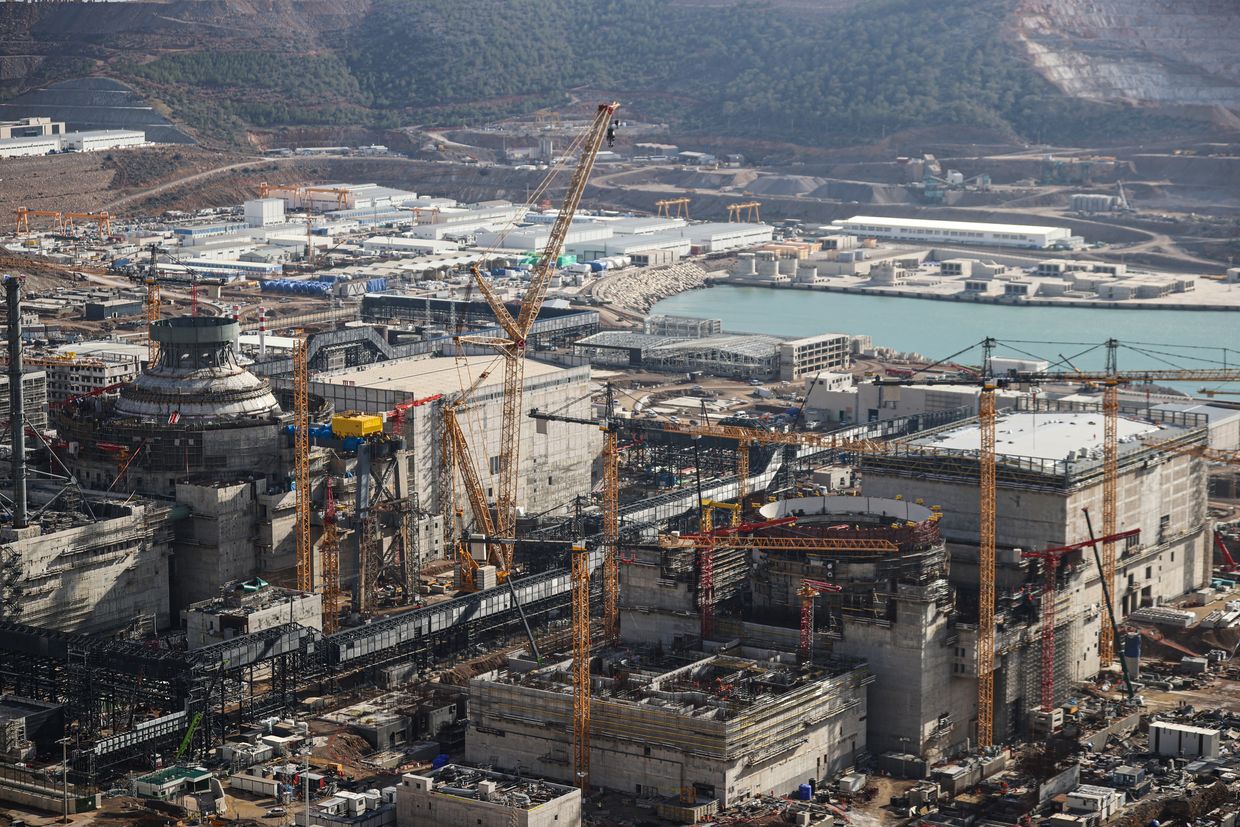

Russian nuclear giant Rosatom is negotiating the sale of a 49% stake in Turkey's Akkuyu Nuclear Power Plant project, estimated at $25 billion, Bloomberg reported on July 1.
The project is a cornerstone of Russian-Turkish energy cooperation. The Akkuyu plant, located in Mersin Province, is poised to become Turkey's first nuclear power facility.
The 4.8-gigawatt project is expected to begin supplying electricity in 2026, Anton Dedusenko, chairman of the board at Rosatom's Turkish subsidiary, told Bloomberg.
"The closer we are to the first unit generating electricity, the more investors start coming," Dedusenko said on the sidelines of the Nuclear Power Plants Expo & Summit in Istanbul.
A previous sale attempt in 2018 collapsed over commercial disagreements. This time, financing is complicated by the threat of U.S. sanctions, prompting Moscow and Ankara to consider alternative payment mechanisms.
"There are many ways how to deliver money here. We can deliver the Russian rubles, the Turkish lira," Dedusenko said.
Despite its NATO membership, Turkey has maintained open diplomatic and economic ties with Russia throughout the full-scale war against Ukraine, while continuing to supply aid to Kyiv and host international mediation efforts.
 The Kyiv IndependentDaria Shulzhenko
The Kyiv IndependentDaria Shulzhenko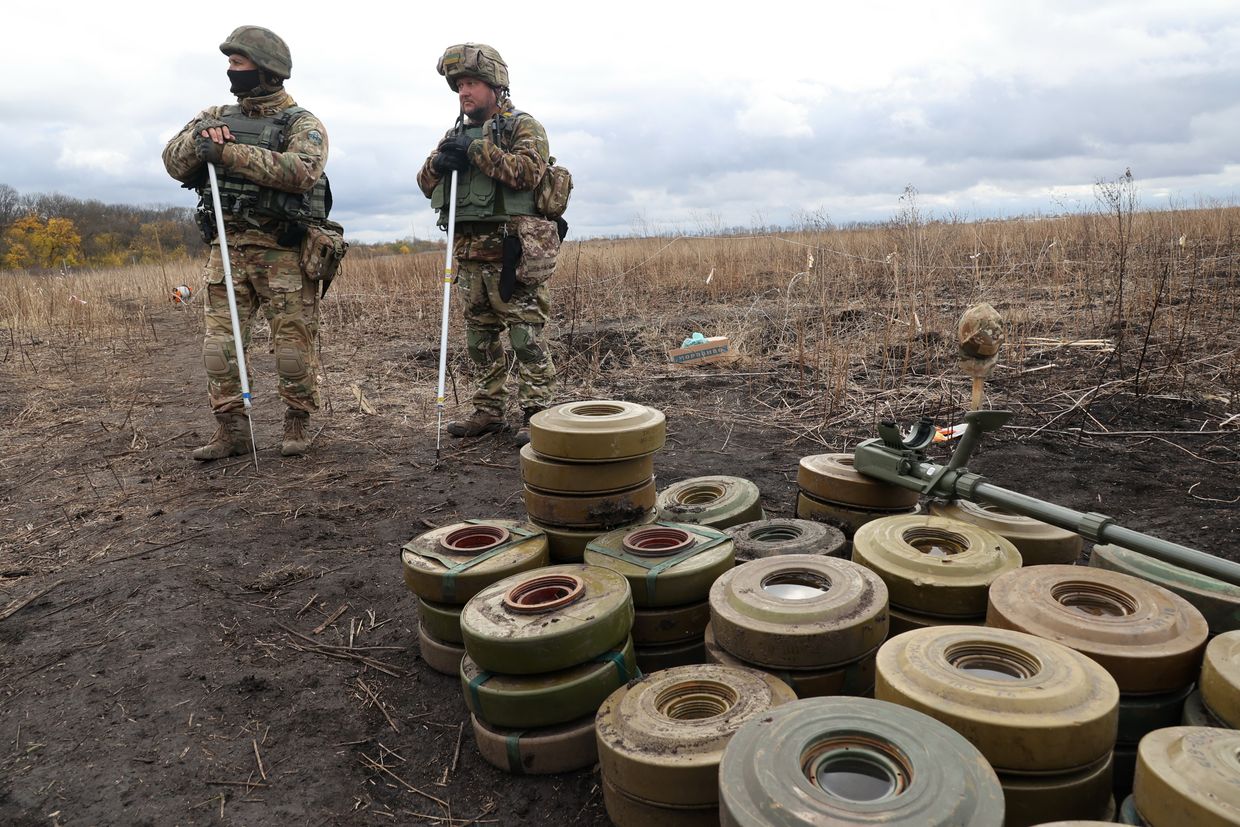


Grammarly, a company with Ukrainian roots, announced its intent to acquire AI email writing app Superhuman as part of its expansion into an AI productivity platform, the company said in a press release on July 1.
Grammarly is the most valuable company with Ukrainian roots, reaching $13 billion valuation as of 2021. Grammarly was founded in 2009 in Kyiv by Oleksii Shevchenko, Maksym Lytvyn, and Dmytro Lider.
According to Grammarly's press release, email is Grammarly's top use case, with the platform editing over 50 million emails weekly.
Superhuman is an AI email application that the company says helps users respond to emails faster and reduces time spent on email communications.
Users are already sending and responding to 72% more emails per hour after using Superhuman compared to the previous period, according to Grammarly.
"This is the future we've been building toward since day one: AI that works where people work, not where companies want them to work," said Shishir Mehrotra, Grammarly's CEO.
The acquisition follows Grammarly's recent purchase of Coda, a productivity tool company. The combined platforms will allow users to work with multiple AI agents for different tasks within email communications.
Grammarly says that its service is used daily by over 40 million users, generating annual revenue of more than $700 million for the company.
 The Kyiv IndependentAbbey Fenbert
The Kyiv IndependentAbbey Fenbert


Russia has the capacity to launch as many as 500 Iranian-designed Shahed attack drones at Ukraine in a single attack, but doing so on a daily basis is not possible, Ukraine's military intelligence chief Kyrylo Budanov said on July 2, according to Suspilne.
In recent weeks, Russia has intensified its drone assaults on Ukrainian cities, often launching hundreds in a single day. The largest aerial attack since the start of the full-scale invasion occurred overnight on June 29, when Moscow launched 477 drones and 60 missiles across Ukraine.
"Launching 450–500 Shaheds every day — it's just not realistic," said Budanov during a ceremony recognizing five Ukrainian intelligence achievements in the national record book, according to public broadcaster Suspilne.
"But unfortunately, they do have the ability to do it periodically. They can realistically launch up to 500 in one strike," Budanov added.
Budanov also said Russia is upgrading the capabilities of the Shahed-type drones by improving their CRPA (Controlled Reception Pattern Antenna) systems, which protect the drones from GPS jamming. He noted that Russian engineers are now producing 16-channel CRPA antennas, which are harder to counter electronically.
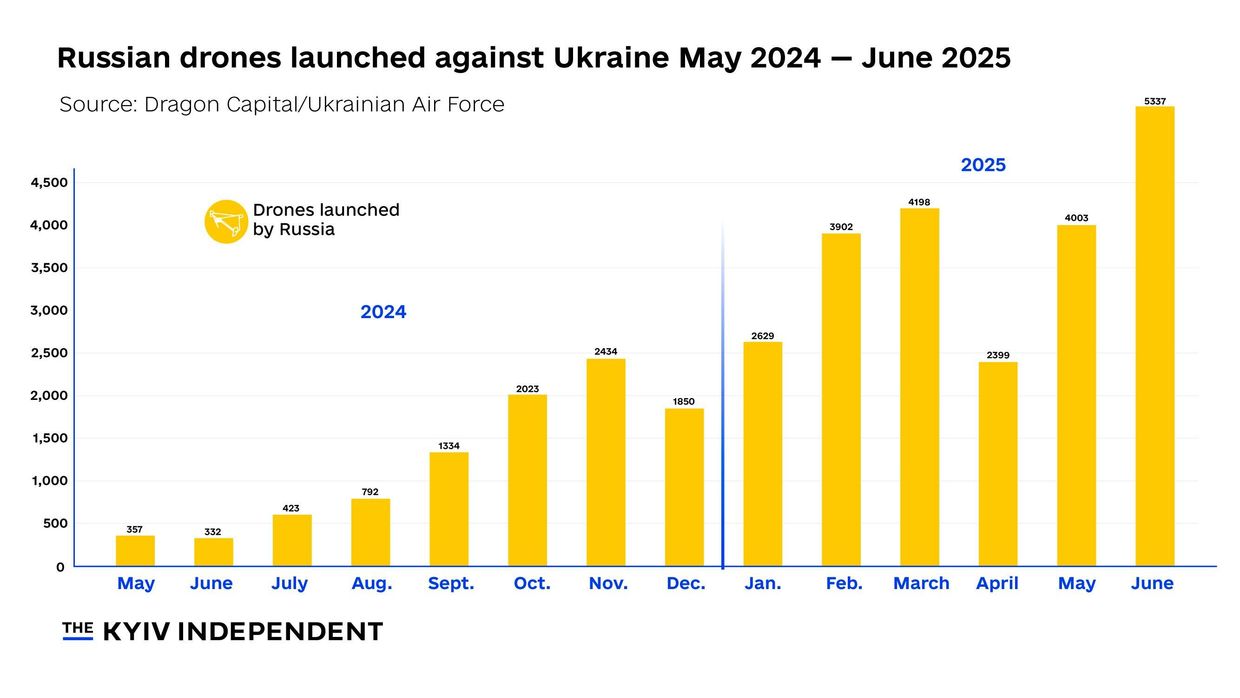
"These antennas are currently produced in Russia, but the engineer who developed this CRPA antenna was here in Ukraine," Budanov said.
"Back in the early 2000s, no one here needed it, so the engineer moved to Russia. One (of the two engineers involved in the development) has already died under unclear circumstances. The other is still alive, though probably not for long."
Russia has used thousands of Shahed-type drones throughout its full-scale invasion to strike Ukrainian cities and infrastructure, often in large overnight waves. Ukrainian air defenses have adapted over time but face growing challenges as Moscow improves drone resilience and electronic warfare capabilities.
President Volodymyr Zelensky said that Moscow has launched 28,743 Shahed-type drones at Ukraine since the start of Russia's full-scale invasion.
Budanov also said Russia has made unsuccessful attempts to develop its own naval drones. The last known effort came in early June, when experimental models detonated before reaching Ukrainian territorial waters, he said.
"They didn't achieve results. Based on our information, they were heading toward the city of Yuzhne, searching for targets," he said.
Ukraine has been using domestically developed Magura naval drones to target Russian military assets in the Black Sea, keeping much of Russia's fleet pinned in port.
Despite their small size, the unmanned surface vessels have proven effective, including in a May 2 operation when Ukraine's military intelligence used Magura-7 drones armed with air-to-air missiles to shoot down two Russian Su-30 fighter jets near Novorossiysk. It was the first recorded instance of fighter jets being downed by naval drones.
 The Kyiv IndependentMartin Fornusek
The Kyiv IndependentMartin Fornusek
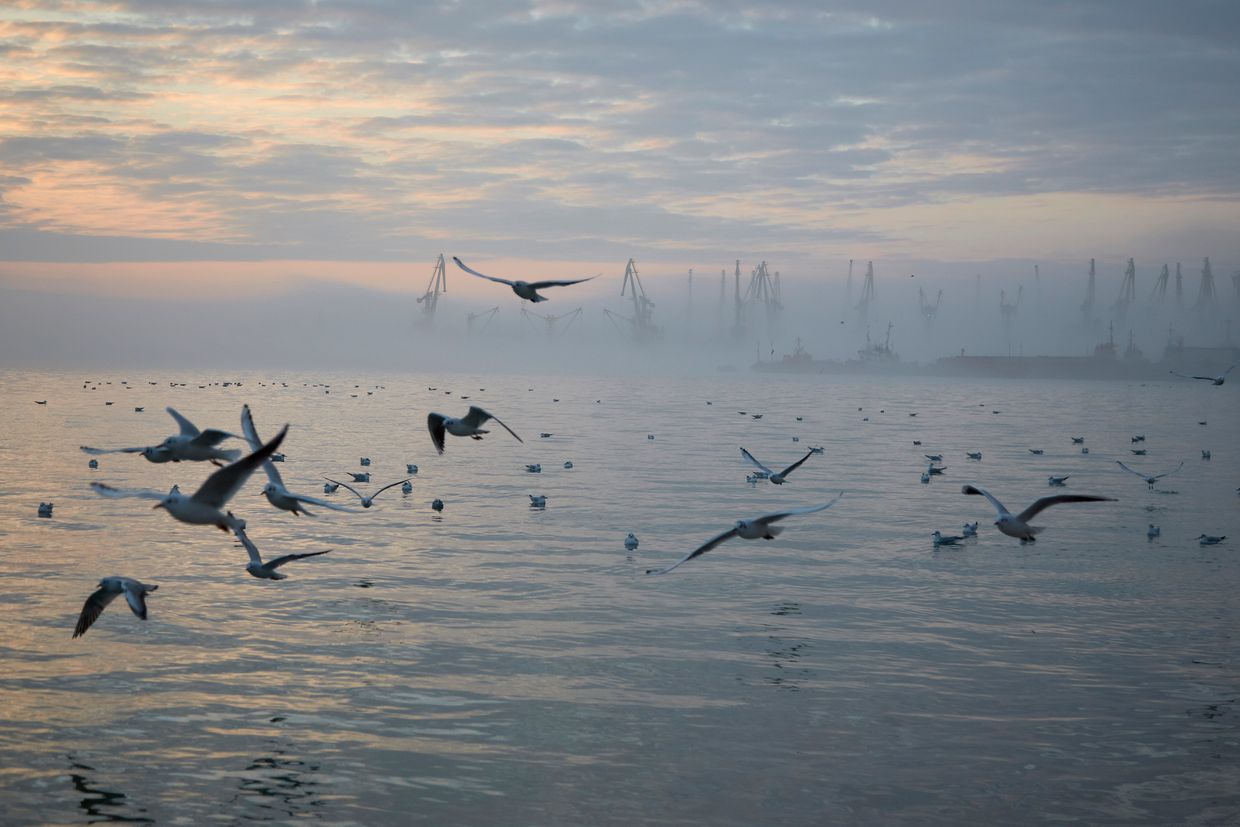

Russian authorities are planning to begin gas extraction from the Sea of Azov, citing Soviet-era geological data and identifying 22 potential offshore fields, including several located near the occupied Ukrainian city of Berdiansk, Ukrainian officials told Suspilne on July 1.
According to the Berdiansk Municipal Military Administration, Russia's Federal Subsoil Resources Agency (Rosnedra) has announced plans to explore and possibly develop gas fields such as the Morske, Pivnichno-Kazantypske, and Skhidno-Kazantypske deposits.
"(Russia) has declared commercial reserves of gas in the Sea of Azov, referring to Soviet archives listing 22 oil and gas structures," Ksenia Kleshchenko, acting head of communications for the Berdiansk administration, told Suspilne.
"These include the Morske field, discovered in 1977 (and still under conservation). It is necessary to conduct further exploration and pilot operation."
Kleshchenko noted that the Pivnichno-Kazantypske and Skhidno-Kazantypske fields were discovered in the late 1990s and early 2000s during Ukraine's independence, but have not been developed. Ukrainian company Chornomornaftogaz had conducted surveys at the Pivnichno-Kazantypske and Strilkove sites before Russia annexed Crimea in 2014 and seized Ukrainian offshore assets.
Ukrainian authorities say the Kremlin's interest in mineral resources may have partially motivated the occupation of southern Zaporizhzhia Oblast, including Berdiansk.
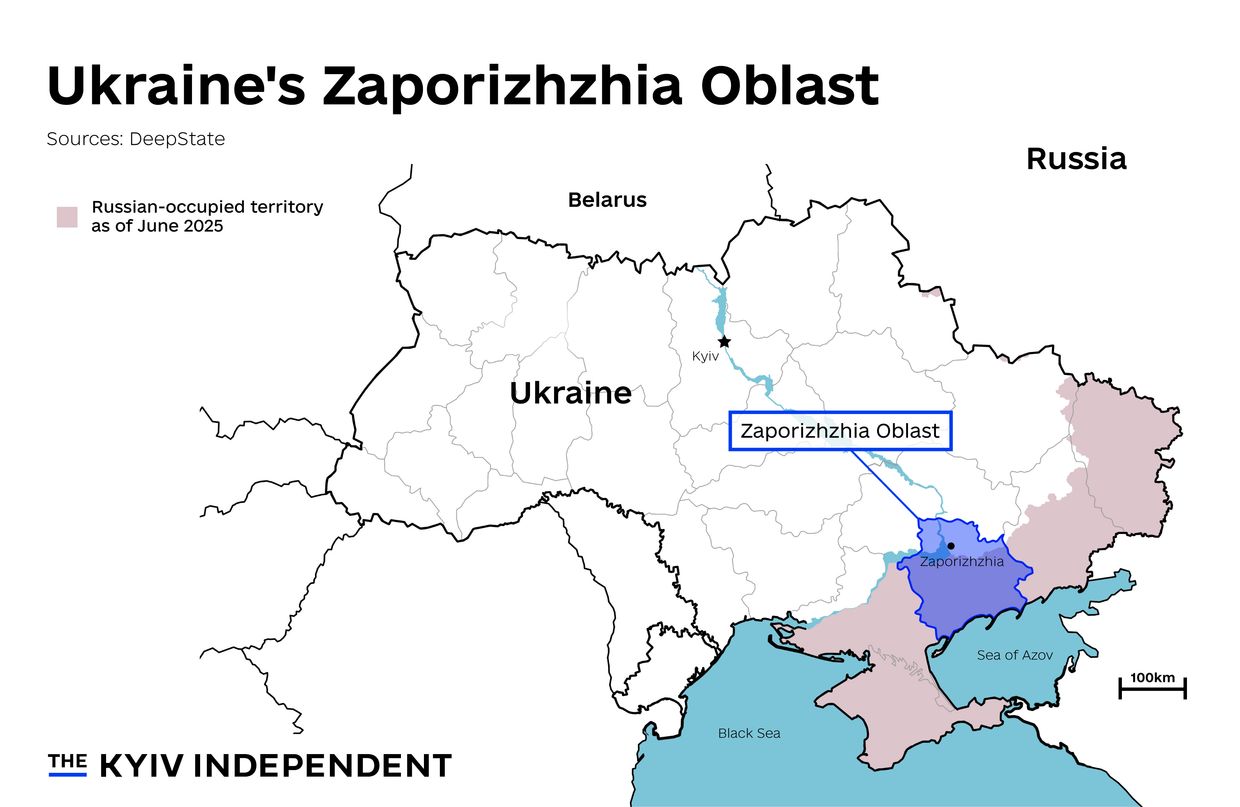
"All of the (Russia's) 'plans' are focused on enriching themselves and the Russian Federation, but not on the welfare of the citizens of the occupied territories," the Berdiansk administration said in a statement. "While residents of Berdiansk face constant water and electricity outages, (Russian authorities) are laying grand schemes to exploit the region’s resources."
The administration also warned of potential environmental consequences. Due to the shallow average depth of the Sea of Azov, around 14 meters (about 46 feet), any extraction could cause serious ecological damage. The exploratory work is reportedly planned for 2026–2030.
Russia's interest in resource-rich territories extends beyond the Sea of Azov. In June, Russian forces took control of a major lithium deposit near the village of Shevchenko in Donetsk Oblast, one of Ukraine's most valuable sites for the mineral used in electric vehicle batteries.
Ukraine has now lost two of its four known lithium deposits to Russian occupation, including the Kruta Balka deposit in Zaporizhzhia. According to the Kyiv School of Economics, Ukraine holds about one-third of the European Union's lithium reserves.
 The Kyiv IndependentDominic Culverwell
The Kyiv IndependentDominic Culverwell
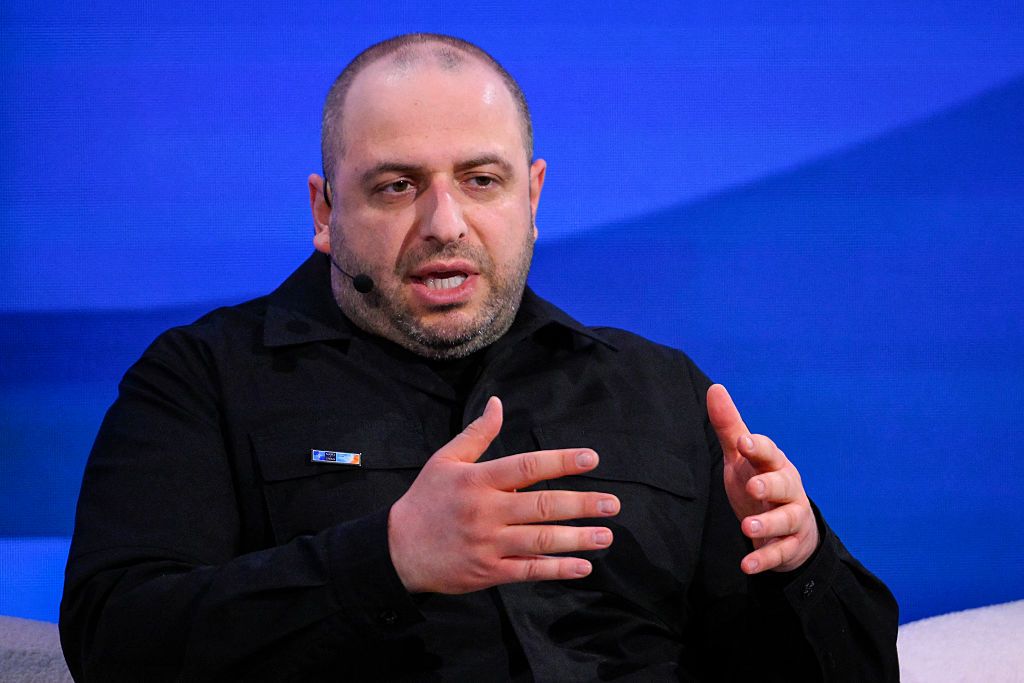

Ukraine is launching a joint weapons production program with members of the Ukraine Defense Contact Group (UDCG), or Ramstein summit participants, Defense Minister Rustem Umerov announced on July 1.
The UDCG was formed in 2022 under former U.S. President Joe Biden to coordinate military assistance for Ukraine among about 50 of Kyiv's allies.
As part of a new joint production program, new factories and weapons manufacturing facilities will be built in Ukraine and abroad, Umerov said in a social media post. The international sites will be UDCG member countries participating in the Ramstein-format summit.
New legal and tax regulations will also be put in place for Ukrainian weapons manufacturers, facilitating the construction of new sites and allowing them to rapidly scale up production, Umerov said.
The Defense Ministry on July 1 joined the Verkhovna Rada (Ukraine's parliament) Finance, Tax, and Customs Committee in presenting four draft laws regarding domestic weapons production "aimed at developing the industry." The legislation introduces amendments to tax, customs, and budget regulations, as well as the Criminal Code.
The first vote on the new legislative package is expected to take place in a month, according to Umerov.
"This is a new type of military-industrial cooperation, where Ukraine is an equal partner and player in the global defense market," he said.
As Ukraine scales up domestic defense production, President Volodymyr Zelensky has been lobbying foreign partners to provide funding to help match its manufacturing capacity. At the NATO summit in The Hague, Ukraine signed agreements on joint weapons production with the U.K. and Denmark. Norway also pledged to jointly develop air defense systems with Kyiv.
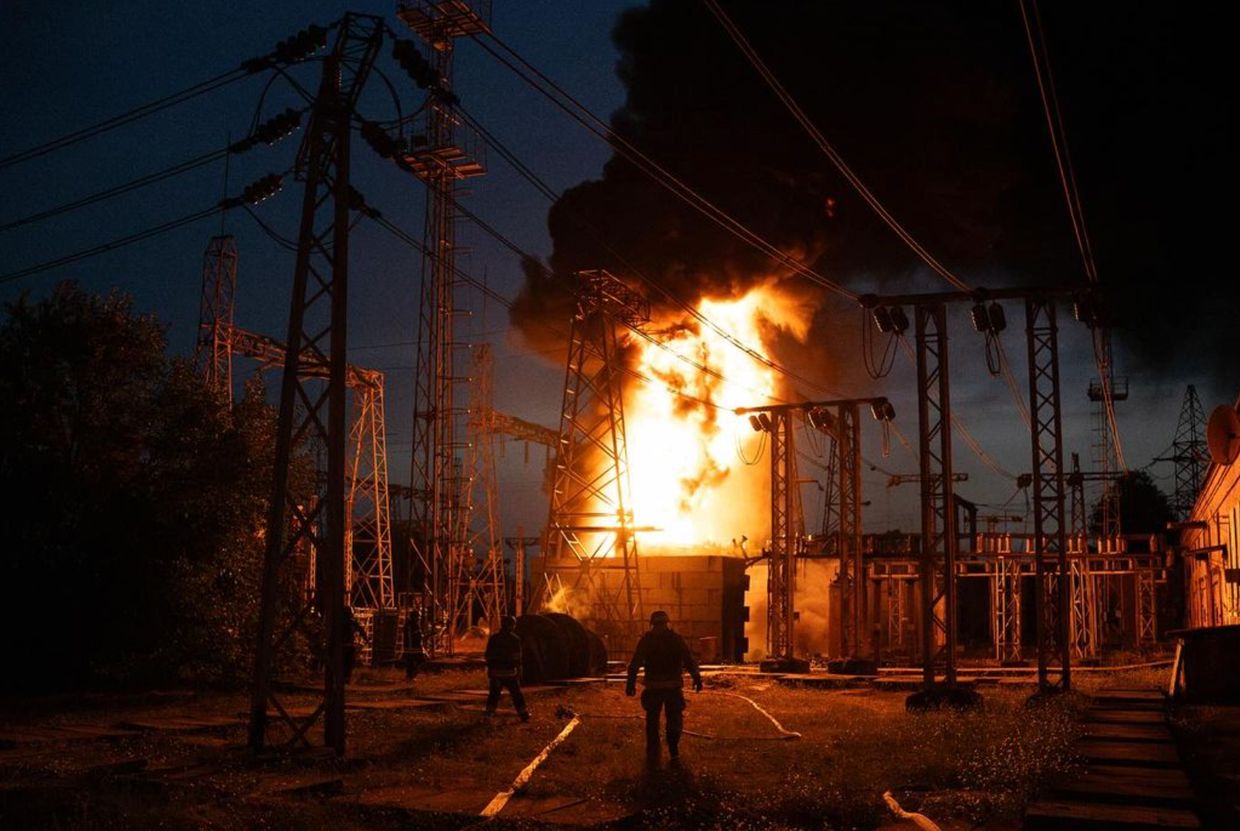

Ukraine boosted electricity exports by 150% in June 2025 compared to the previous month, reaching over 237,000 megawatt-hours (MWh), according to consulting firm ExPro Electricity.
Current export volumes have returned to autumn 2022 levels, before Russia launched systematic attacks against Ukraine's energy infrastructure that caused massive blackouts across the country.
This marks Ukraine's return to exporting more electricity than it imports for the first time since October 2023, ExPro analysis reports.
Electricity cannot be stored in large volumes for long periods, so it can be exported during certain hours when there is surplus in Ukraine’s energy system, and imported during deficit hours.
Hungary imported the majority of Ukrainian exports, with shipments jumping from 34,000 to 122,000 MWh in a single month.
The recovery represents a dramatic turnaround from June 2024, when Ukraine had no exports at all and imported 858,000 MWh, four times more than in June 2025.
Russia continues to target Ukraine's energy infrastructure, with the latest strike hitting a critical energy facility in Kherson Oblast on June 27 that caused widespread blackouts across multiple communities.
Governor Oleksandr Prokudin warned residents to prepare for prolonged outages as power engineers work to restore electricity, saying "Russia decided to plunge Kherson Oblast into darkness."
In February 2025, Emergency energy power shutdowns were introduced in eight Ukrainian oblasts due to Russian attacks on the country's energy system.
 The Kyiv IndependentAnna Fratsyvir
The Kyiv IndependentAnna Fratsyvir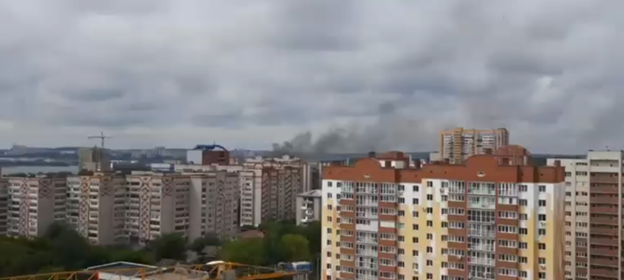
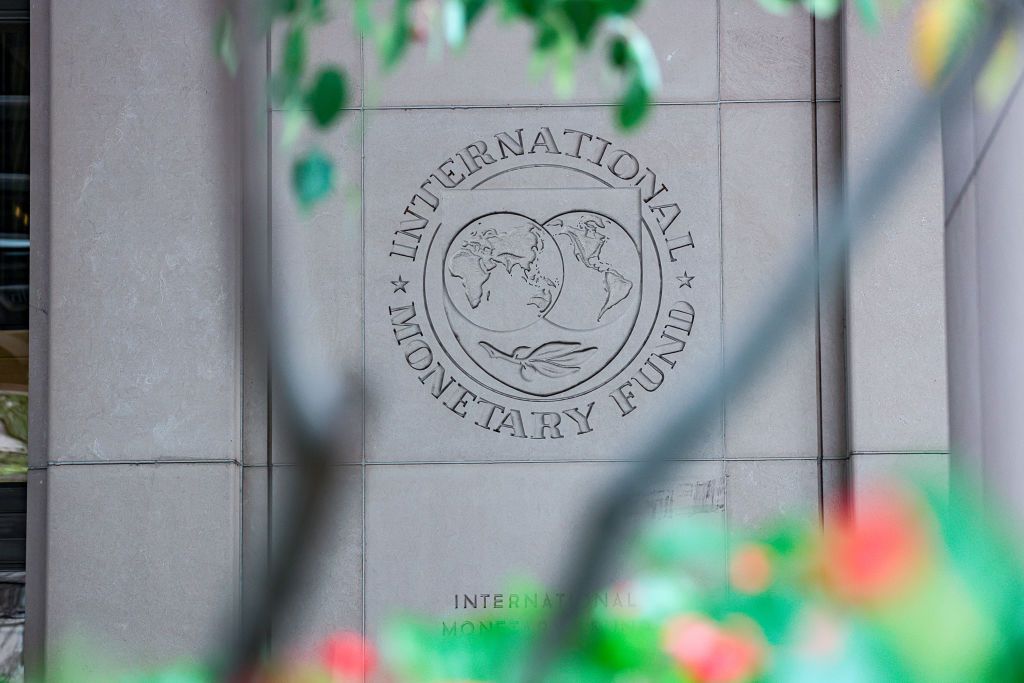

Ukraine received approximately $500 million from the International Monetary Fund (IMF), marking the ninth tranche under the Extended Fund Facility program, the Finance Ministry announced in a press release on July 1.
The EFF Program has allocated $15.5 billion to Ukraine in budget support over a four-year period. The program has now delivered $10.6 billion to Ukraine since it began in 2023.
"In total, during the full-scale war, $13.3 billion in financial assistance from the Fund has been received by the state budget," Finance Minister Serhii Marchenko said in a press release.
According to the IMF, Ukraine successfully met all quantitative performance criteria through March 2025, including the prior action to submit a detailed reform plan for the State Customs Service (SCS).
The IMF extended deadlines for several Ukrainian reforms, including appointing a new customs chief.
First Deputy Managing Director of the IMF, Gita Gopinath, said that Ukraine must continue anti-corruption reforms, including appointing a new head of the Economic Security Bureau and strengthening money laundering rules.
The IMF kept its 2025 growth forecast for Ukraine at 2-3%, as improved electricity supply is balanced by reduced gas output and weaker agricultural exports.
The international body expects inflation to reach 9% by year-end and recommended that Ukraine's central bank maintain tight monetary policy, warning it should "stand ready for further tightening" if inflationary expectations worsen.
"The economy has remained resilient, but the war is weighing on the outlook, with growth tempered by labor market strains and damage to energy infrastructure," Gopinath said in a statement.
The next program review is scheduled for mid-September 2025, with an IMF mission expected to visit Ukraine in August to assess progress on reform commitments.
 The Kyiv IndependentAnna Fratsyvir
The Kyiv IndependentAnna Fratsyvir
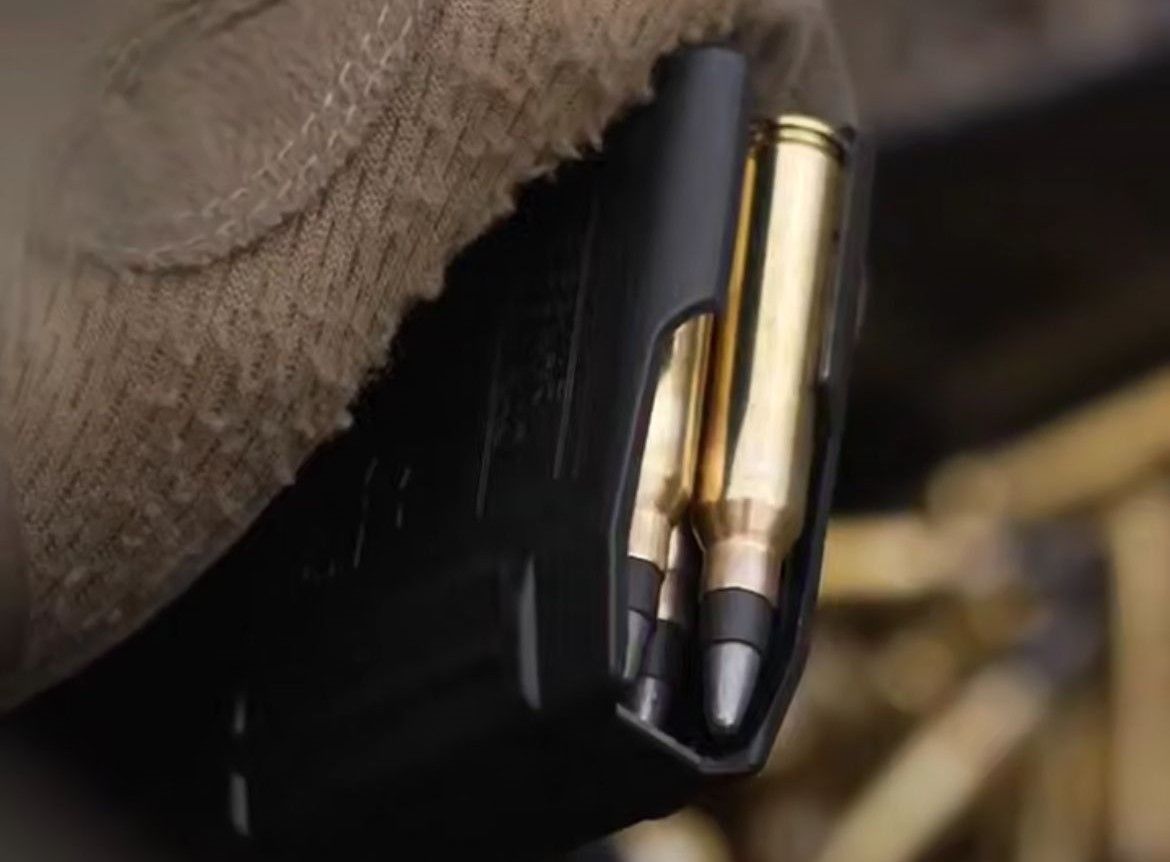

Ukraine's defense technology cluster Brave1 has launched the development of anti-drone rifle rounds, significantly increasing the chances of hitting fast-moving aerial targets, the group said in a statement on June 30.
According to Brave1, the ammunition appears similar to standard rounds used in automatic rifles but features a specially designed warhead that increases the likelihood of shooting down FPV (first-person-view) drones or commercial quadcopters such as the DJI Mavic before they strike.
These types of drones are being used extensively on the battlefield by both Ukrainian and Russian forces. The cost-effective FPV drones have proven highly effective in destroying expensive military equipment.
The manufacturer has already codified the new rounds according to NATO standards, Brave1 said. The goal is to supply every infantry soldier with a magazine of specialized ammunition for use in case of aerial threats.
"These rounds that significantly improve the chances of hitting a moving target are a new development by Brave1," Digital Transformation Minister Mykhailo Fedorov said.
"Our common goal is to ensure that every infantryman has a magazine of such ammunition and can equip his rifle with it in case of an air threat."
Ukraine continues to scale up its drone warfare capabilities. The Defense Ministry said on March 10 that it plans to purchase 4.5 million FPV drones in 2025 at a cost exceeding Hr 110 billion ($2.6 billion), with most of the funds allocated through the Defense Procurement Agency.
President Volodymyr Zelensky has set a goal of producing at least 30,000 long-range drones in 2025.
 The Kyiv IndependentYuliia Taradiuk
The Kyiv IndependentYuliia Taradiuk
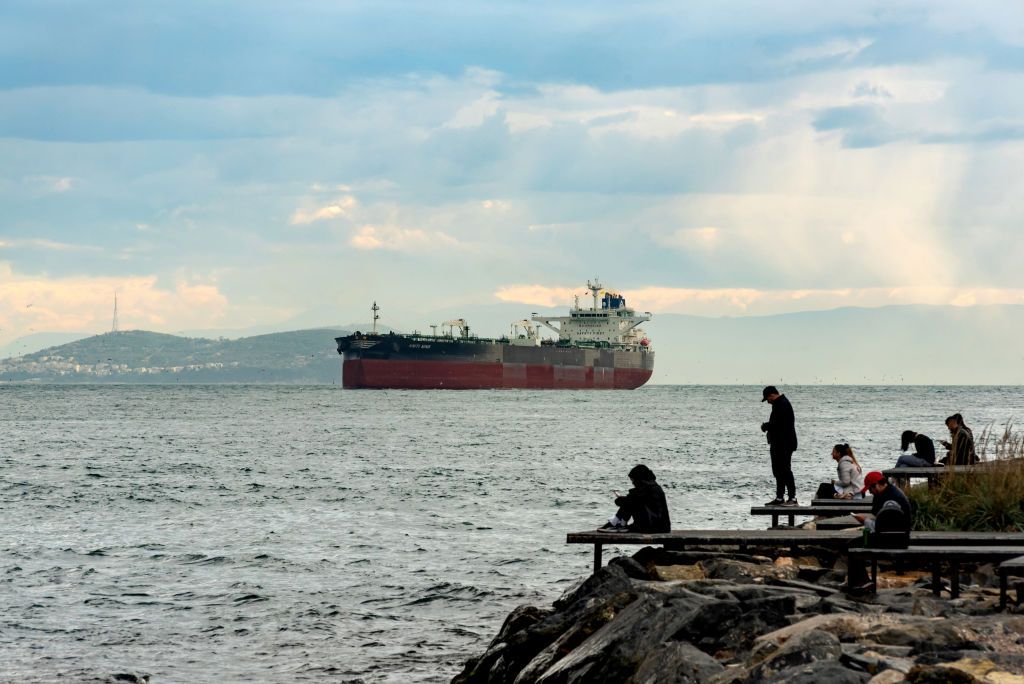

Editor's note: The article was updated with a statement from Ukraine's military intelligence agency.
A tanker carrying 1 million barrels of oil experienced an explosion near Libya, its operator, TMS Tankers, said on June 30. The vessel, Vilamoura, is now being towed to Greece, where the extent of the damage will be assessed upon arrival.
The blast caused the engine room to flood due to water intake, though the cause of the explosion remains unclear, according to a company spokesperson.
The spokesperson confirmed that the crew is safe and no pollution has been reported.
The explosion occurred on June 27 as the vessel was departing the Libyan port of Zuwetina, some 150 kilometers (90 miles) northeast of Libyan territorial waters, Ukraine's military intelligence reported.
The incident comes amid a series of unexplained blasts targeting oil tankers that had previously visited Russian ports. In response, shipowners have started inspecting their vessels for mines using divers and underwater drones.
Vilamoura had visited Russian oil terminals twice since April, loading Kazakh-origin crude rather than Russian oil. According to Bloomberg vessel-tracking data, the tanker called at the Russian port of Ust-Luga in early April and at the Caspian Pipeline Consortium (CPC) terminal near Novorossiysk in May. Both terminals primarily handle Kazakh crude exports.
Maritime risk consultancy Vanguard Tech reported that four other vessels have been damaged by explosions since the beginning of the year. Each had recently docked at Russian ports, the firm said.
Ukraine has targeted Russian energy assets throughout the full-scale invasion, including a drone strike in February on the CPC pipeline, a route responsible for moving roughly 80% of Kazakhstan’s oil exports.
 The Kyiv IndependentOleg Sukhov
The Kyiv IndependentOleg Sukhov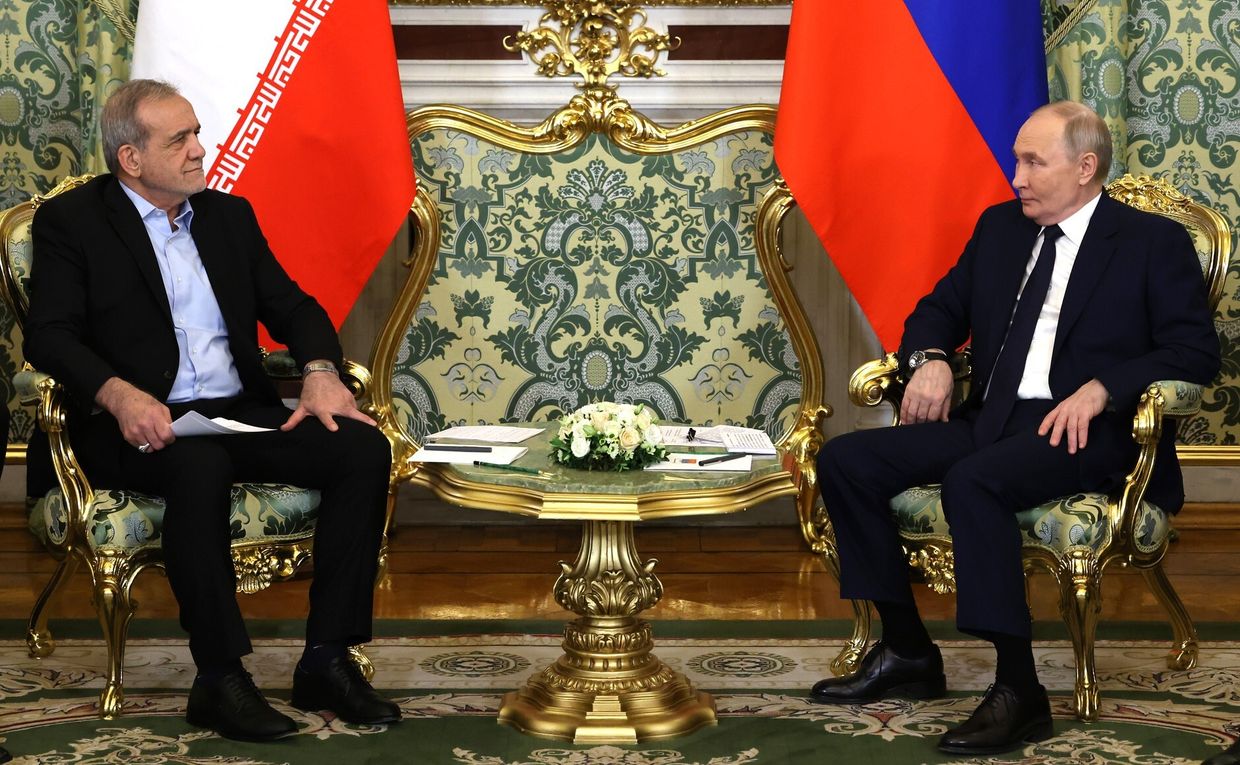
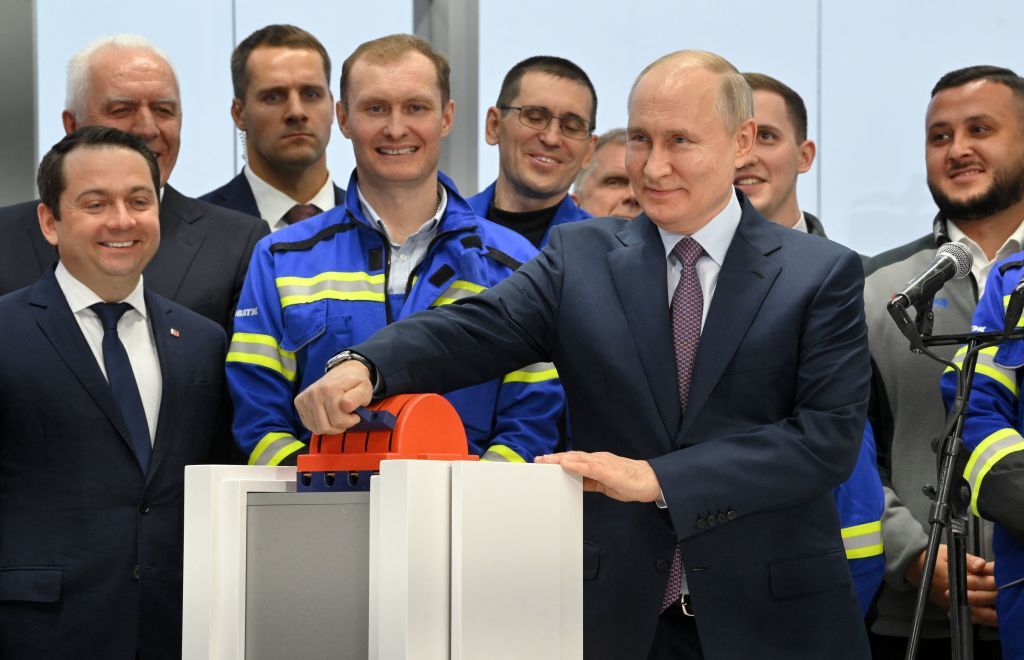

Russia is making another attempt to expand its exports of liquefied natural gas (LNG) after U.S. sanctions disrupted production at its flagship Arctic LNG 2 plant, Bloomberg reported on June 28.
Arctic LNG 2, owned by the Russian company Novatek, was envisaged as Russia's largest LNG plant and aimed to produce almost 20 million metric tons of LNG per year. The U.S. State Department targeted the Arctic LNG 2 project with sanctions in 2024.
An LNG vessel has reportedly docked at the Arctic LNG 2 facility for the first time since October, according to ship-tracking data and satellite images analyzed by Bloomberg. Data suggests that at least 13 vessels of Russia's "shadow fleet" have been assembled to potentially serve Arctic LNG 2.
These include four ice-class vessels, including the one currently docked at Arctic LNG 2. Three others are idling in the Barents Sea, along with three traditional LNG vessels. Two more vessels are being repaired in China and another two are idled in the Gulf of Finland. One ship is located near a floating storage facility in Russia's Far East.
While pipeline shipments of Russian gas to Europe have declined sharply since the full-scale invasion of Ukraine, Russia's shadow fleet — a group of aging oil tankers used to circumvent global sanctions — continues to grow.
Moscow now has more vessels at its disposal than it did last year, according to Malte Humpert, founder of the Arctic Institute think tank.
"If (Russia) can find buyers, this small fleet should be sufficient to lift cargoes," Humpert told Bloomberg.
Finding buyers may present a difficulty, due to wariness about sanctions violations. Former U.S. President Joe Biden sanctioned ships and companies connected with exports from Arctic LNG 2 in 2024, thought it is not yet clear if U.S. President Donald Trump will enforce sanctions as strictly.
Representatives of Arctic LNG 2 have continued to search for buyers in China and India, but have not yet made any sales, traders familiar with the matter told Bloomberg.
Arctic LNG 2 cut production from its gas fields to almost zero in November 2024, after halting liquefaction the previous month due to Western sanctions. The U.S. sanctioned two vessels and two entities connected to Arctic LNG 2 in September 2024, after previously targeting the project in a sweeping round of sanctions late August.
The August sanctions likely forced Novatek to scale back its operations at the facility. Novatek itself was sanctioned after the outbreak of the full-scale war in 2022.
 The Kyiv IndependentDmytro Basmat
The Kyiv IndependentDmytro Basmat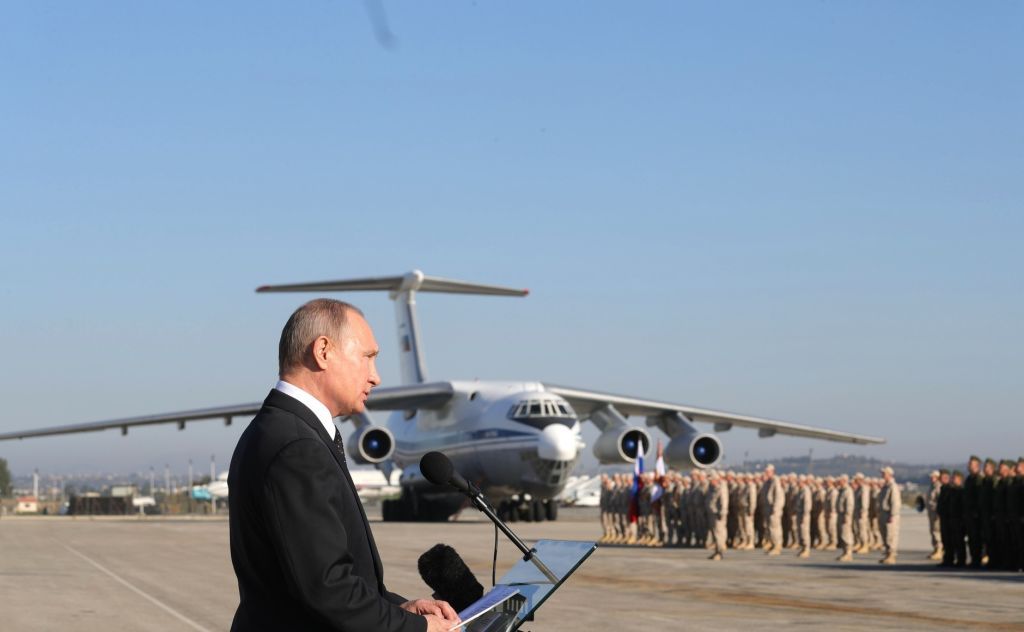
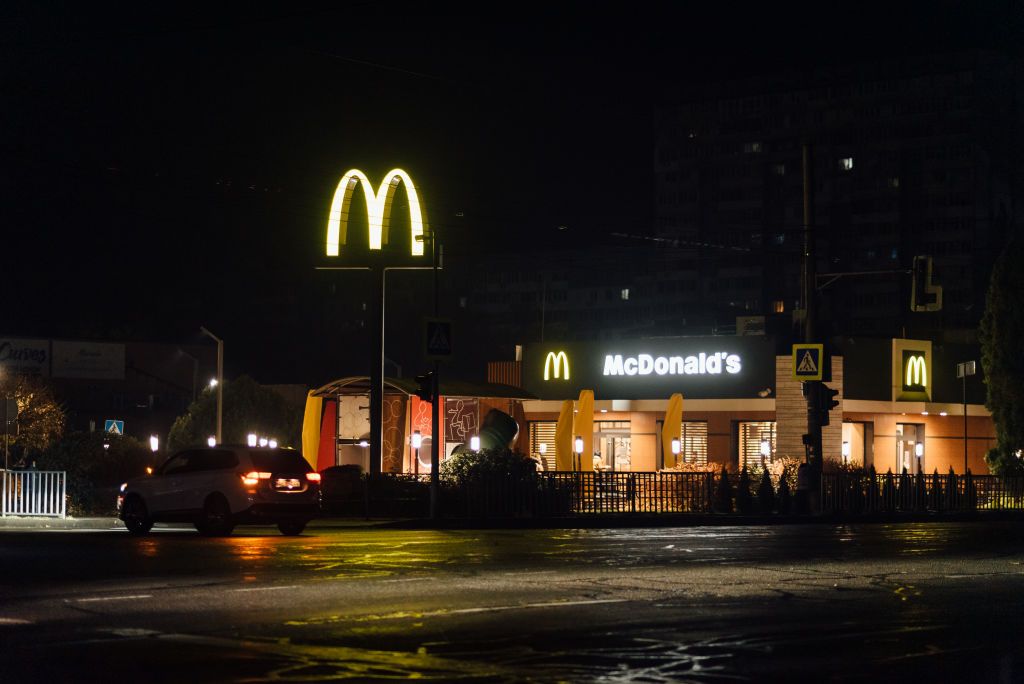

The U.S. fast-food giant McDonald's plans to open 10 new restaurants in Ukraine this year, signaling faith in Ukraine's struggling but growing wartime economy, the New York Times (NYT) reported on June 28.
McDonald's closed all its locations in Ukraine after Russia launched the full-scale invasion in February 2022, but began reopening later that year. The 10 new restaurants will bring the total number close to 120 — more operating McDonald's locations than before the war.
"Overall, this indicates that despite the military actions, Ukraine's economy is showing positive dynamics," Viktor Mykyta, a top economic adviser to President Volodymyr Zelensky, told the NYT.
"If a business like McDonald's can operate here, it shows any investors that they, too, can confidently work here."
Mykyta served as Governor of Ukraine's far-western Zakarpattia Oblast until last fall. The region was the only one in Ukraine without a McDonald's outpost — until this spring, when two McDonald's restaurants opened in Zakarpattia's cities of Uzhhorod and Mukachevo.
The expansion of McDonald's offers job opportunities and lucrative tax revenues. In 2024, McDonald's paid over $60 million in taxes in Ukraine, making it the country's largest taxpayer in the industry.
Ukraine's economy is projected to grow by 3.3% this year, according to the European Bank for Development and Reconstruction (EBRD). Earlier projections showed over 4% growth, but rising inflation and an economic slowdown exacerbated by Russian attacks on energy infrastructure and nationwide labor shortages brought the forecast down.
Still, Ukraine has been able to welcome back Western businesses that suspended operations at the start of the war, including Ikea, H&M, and Zara.
Russia's war has presented challenges to McDonald's operations. In January 2025, a Russian missile strike on Kyiv damaged Ukraine's oldest McDonald's. Many restaurants also do not offer breakfast due to frequent air raids. In March, the company relaunched its breakfast menu at six McDonald's locations.
McDonald's closed its restaurants in Russia and left the Russian market entirely in 2022.
 The Kyiv IndependentKateryna Denisova
The Kyiv IndependentKateryna Denisova
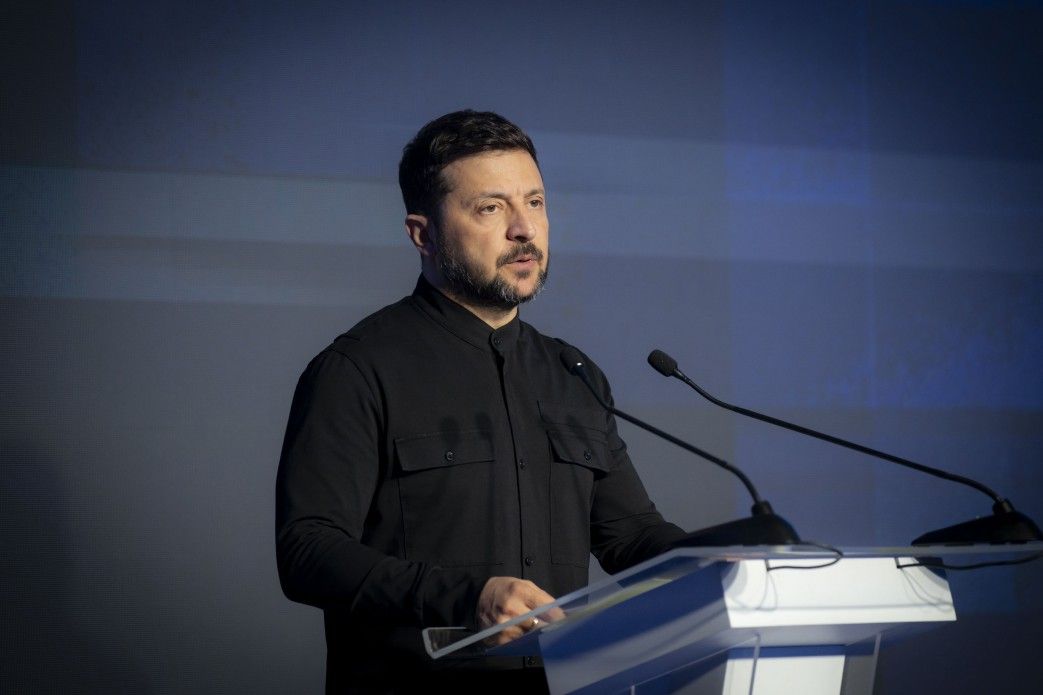

President Volodymyr Zelensky has instructed government officials to prepare a decision introducing a long-term moratorium on business inspections in Ukraine, the Presidential Office announced on June 27.
Zelensky discussed the moratorium during an address at the "State and Business Forum: From Dialogue to Partnership," held in Kyiv.
"I have instructed that a decision on a long-term moratorium on business inspections be prepared to protect businesses from any pressure by unscrupulous individuals in various government positions," he said.
Economic growth is a vital component of Ukrainian resilience, necessitating ongoing dialogue between the government and entrepreneurs, Zelensky said. In addition to imposing the moratorium on inspections, Kyiv will also expand the Council for Entrepreneurship Support in an effort to cultivate entrepreneurship in Ukraine.
"Even under such harsh conditions of this war, Ukraine can rely on its entrepreneurs — on our domestic Ukrainian manufacturing, our Ukrainian logistics, our Ukrainian services across all sectors — from security to everyday life, as well as on Ukrainian developments and investments," the president said.
Following Russia's full-scale invasion in early 2022 and the onset of martial law, Ukraine temporarily suspended certain business regulations, including tax inspections for businesses. Zelensky signed a law resuming tax inspections for certain businesses in December 2023.
Now in its fourth year of full-scale war against Russia, Ukraine's economy is still attempting to recover from the massive blow dealt in 2022, when the GDP dropped by 29.1%. At the same forum on June 27, Ukraine's new Prosecutor General Ruslan Kravchenko announced another measure meant to boost business: an audit of criminal cases related to businesses in Ukraine.
"The second priority is to finally sort out the proceedings related to business, protect business, and achieve justice in these matters," Kravchenko said.
The Prosecutor's Office will be dedicated to "ensuring the rights of investors and businesses," Kravchenko wrote on his Telegram channel on June 26. Efforts to safeguard businesses will not interfere with Ukraine's legal obligations and the regulatory reforms required for its integration into the European Union, he said.
 The Kyiv IndependentOleg Sukhov
The Kyiv IndependentOleg Sukhov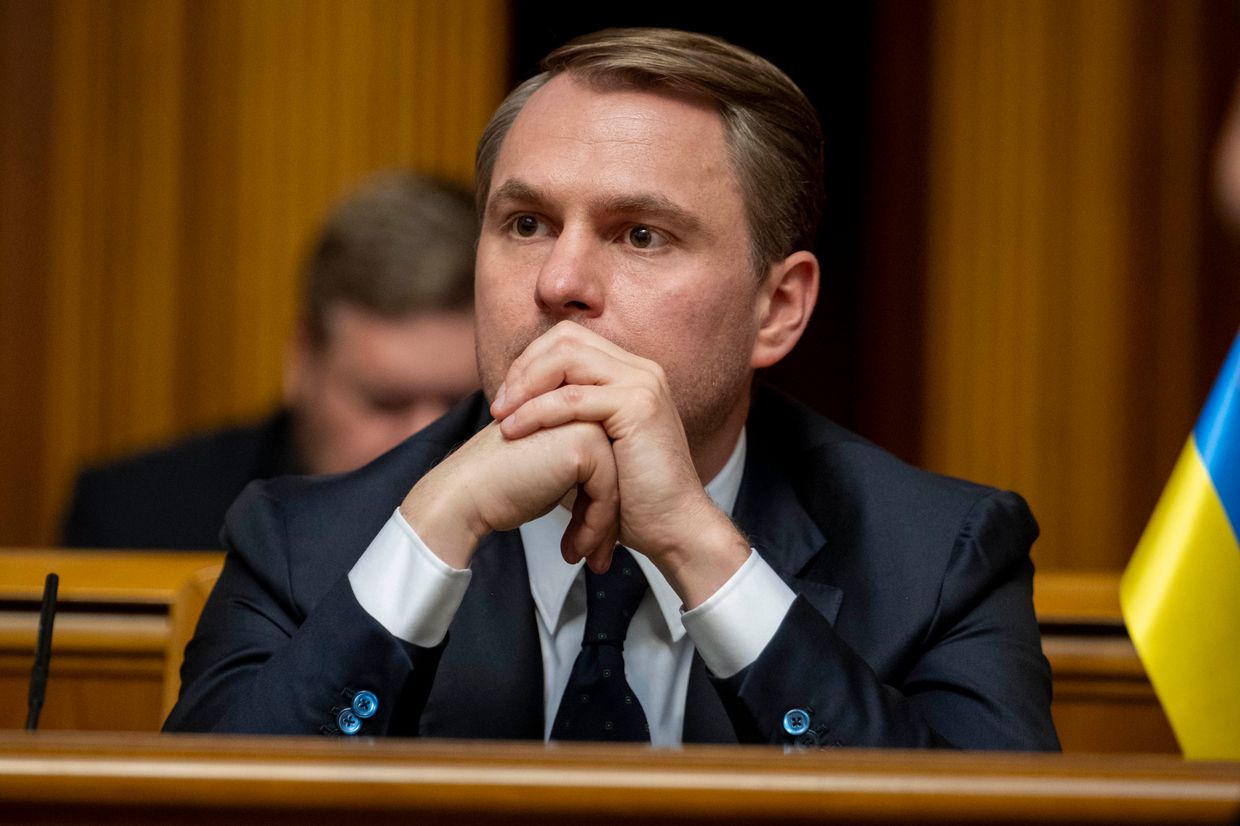
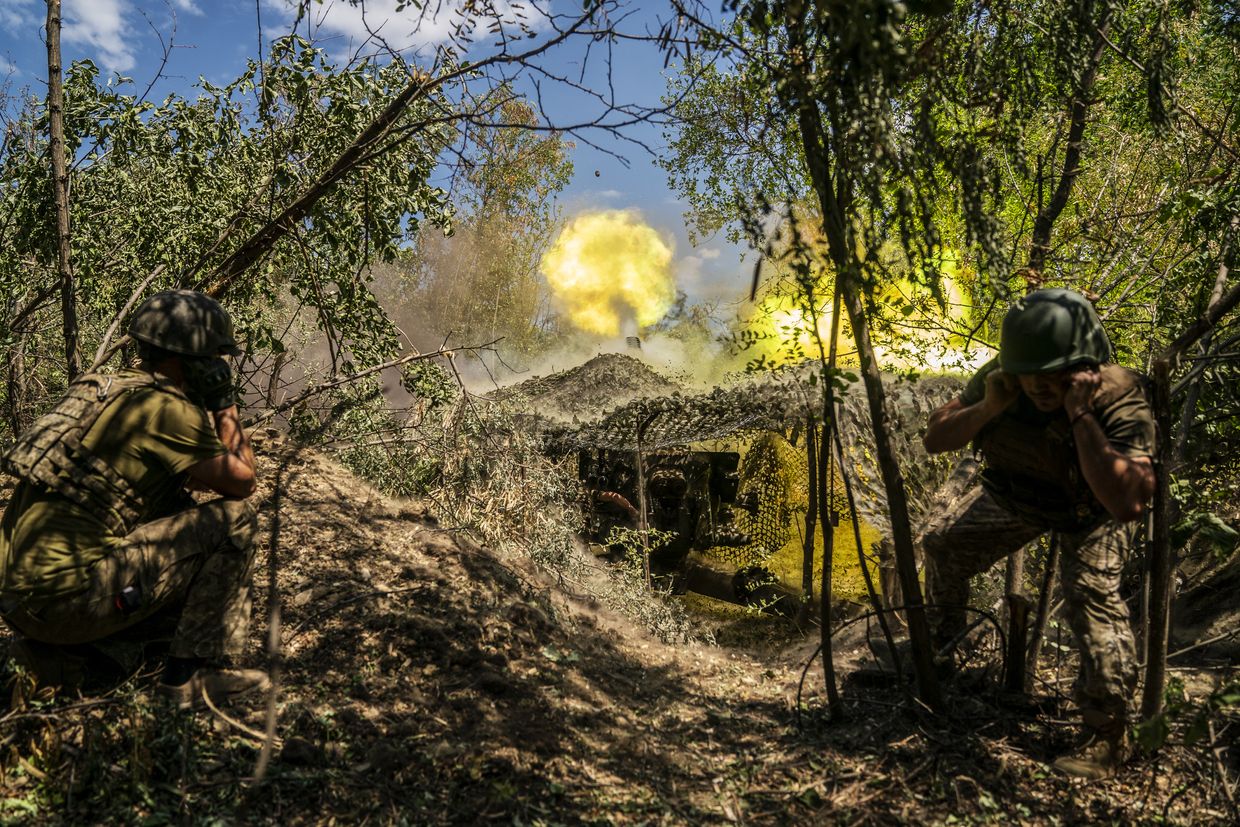

Active fighting is still taking place around the village of Shevchenko in Donetsk Oblast, home to one of Ukraine's largest lithium deposits, a spokesperson for Ukraine's Khortytsia group of forces told the Kyiv Independent on June 27, denying reports Russia had occupied the village.
Earlier on June 26, Russia'a Defense Ministry said it had captured Shevchenko along with another other small settlements in the Velyka Novosilka region of the oblast, as Russian troops continue to push along all areas of the front line.
The spokesperson said that while Russian forces had pushed out Ukrainian soldiers on June 26, the situation is constantly evolving and subject to change several times a day.
"This is one of the two most intense directions right now," Viktor Trehubov, the spokesperson, told the Kyiv Independent.
According to the Ukrainian Geological Survey, the Shevchenkivske deposit covers nearly 40 hectares (98 acres) on the eastern outskirts of Shevchenko. Exact data on the Shevchenkivske deposit's lithium reserves are classified, but it's considered one of the most promising.
The deposit's main reserves consist of lithium ores, but it also contains other rare elements such as rubidium, cesium, tantalum, niobium, beryllium, and tin.
Ukraine is home to 20 of the world's critical minerals and metals like titanium used in the aerospace and defense industries and lithium, an essential component of electric vehicle batteries.
The U.S.-Ukraine minerals deal, signed April 30, specifically mentions lithium as one of the mineral resources that both parties could profit from extracting.
Despite the deposit's relatively small size, it could be operated by a single mine, which could make extraction more efficient, according to a Ukrainian Geological Survey data.
The survey classifies the deposit in the highest complexity category of three possible levels, which could complicate development.
According to KSE, Ukraine holds one-third of the European Union's lithium reserves and approximately 3% of global lithium reserves.
 The Kyiv IndependentChris York
The Kyiv IndependentChris York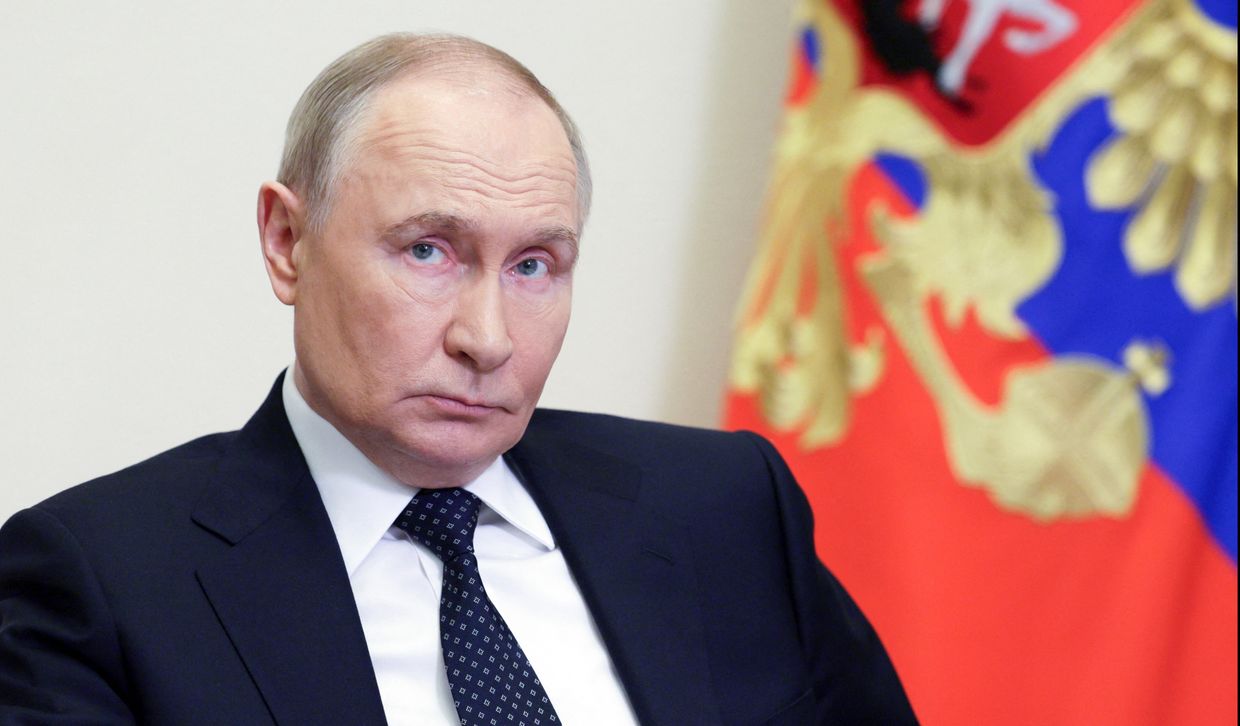
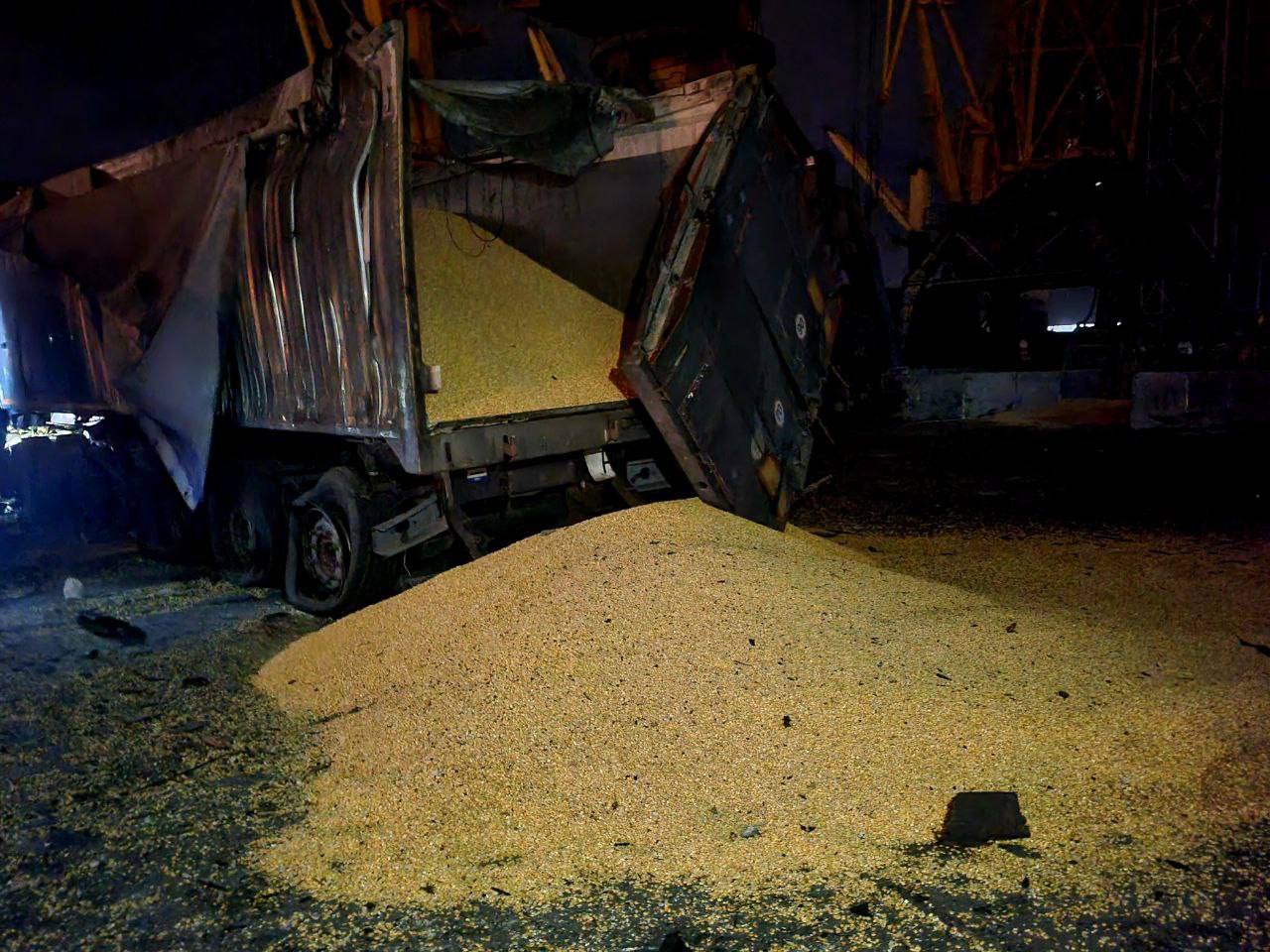

Ukraine is preparing to request European Union sanctions against Bangladeshi entities over importing wheat stolen from Russian-occupied Ukrainian territories, Ukraine's ambassador to India told Reuters.
In comments for Reuters published on June 27, Oleksandr Polishchuk said that Bangladesh had failed to respond to Ukrainian diplomatic appeals to stop the trade, prompting Kyiv to escalate the matter to the EU level.
"It's a crime," Polishchuk told Reuters. "We will share our investigation with our European Union colleagues, and we will kindly ask them to take the appropriate measures."
Russian forces have seized millions of tons of Ukrainian grain from occupied areas, with at least 180,000 tons looted through the port of Mariupol alone, Ukrainian Prime Minister Denys Shmyhal said in October 2024.
The grain theft from occupied territories began in 2014 when Russia first invaded Ukraine and continued after the full-scale invasion launched in 2022.
The Ukrainian Embassy in New Delhi sent multiple letters to Bangladesh's Foreign Ministry this year, requesting rejection of more than 150,000 tonnes of grain allegedly stolen and shipped from the Russian port of Kavkaz, according to documents reviewed by Reuters, shared by people familiar with the matter.
According to Polishchuk, Ukrainian intelligence showed that entities in Russia mask grain obtained from occupied Ukrainian territories by mixing it with Russian wheat before shipping it to other countries.
Bangladesh's Food Ministry, in comments to Reuters, denied the imports, saying that they banned grain deliveries originating from occupied Ukrainian territory.
Ukraine's agricultural sector has suffered approximately $80 billion in losses due to Russia's full-scale invasion, Agriculture Minister Vitalii Koval said in February.
The losses include direct damage, disrupted logistics, higher fertilizer and fuel costs, land reclamation expenses, demining costs, and impacts from occupied territories.
 The Kyiv IndependentDominic Culverwell
The Kyiv IndependentDominic Culverwell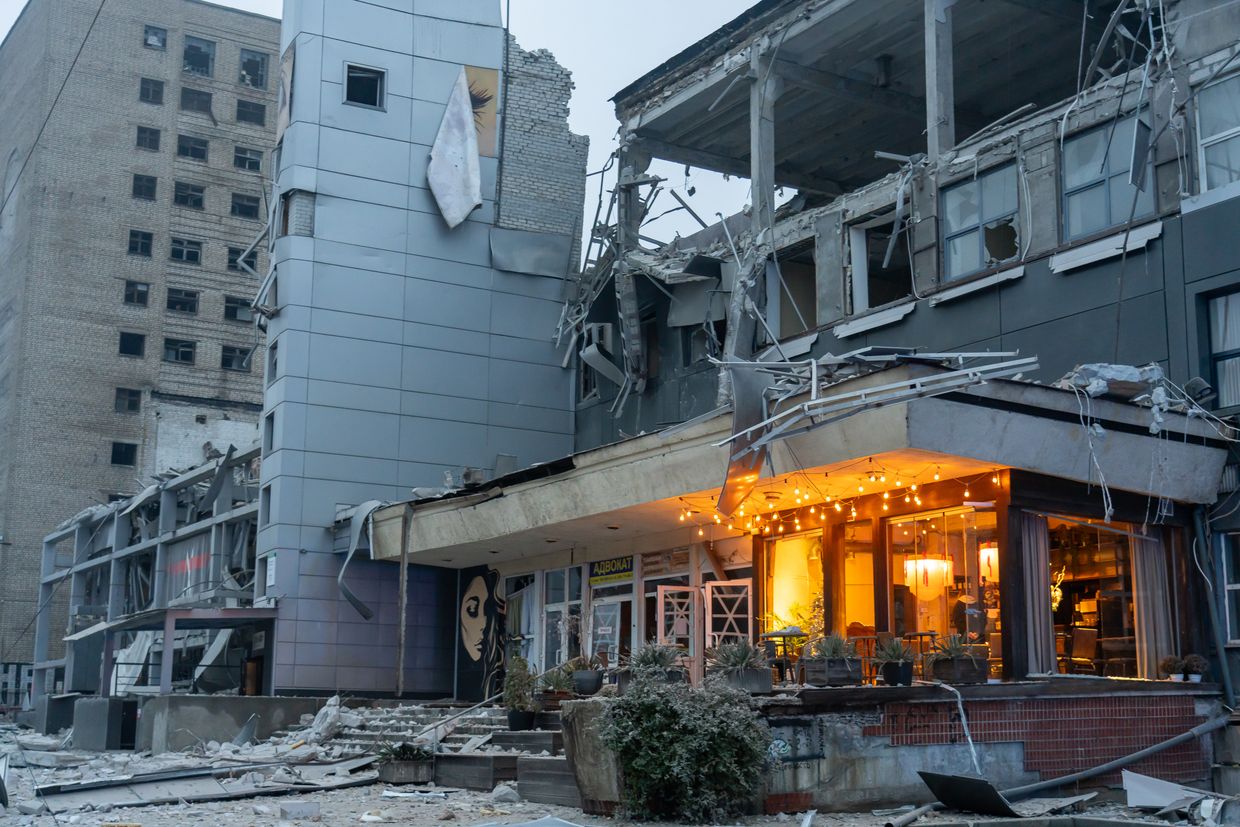
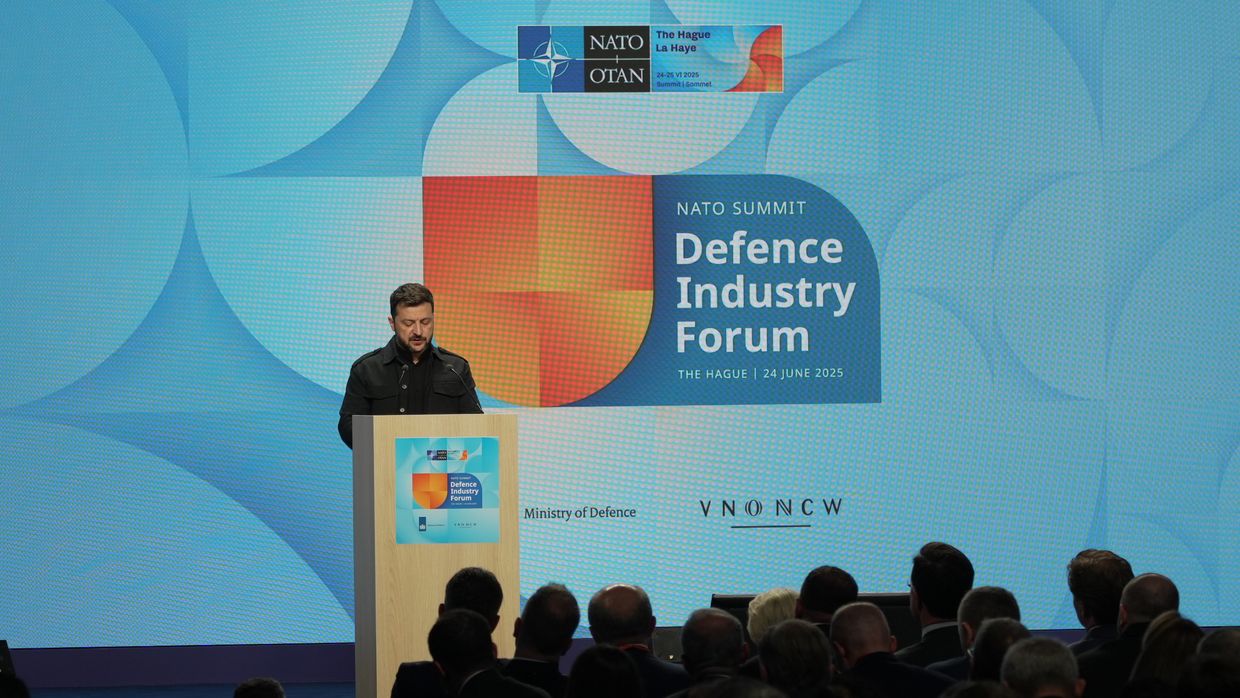

President Volodymyr Zelensky said during NATO summit on June 24 that Ukraine has the capacity to produce over 8 million drones of various types each year, but lacks the financial backing to reach that potential, a shortfall he said must be urgently addressed to defeat Russia's growing military network.
"Our defense production potential has surpassed $35 billion,” Zelensky said during a speech at the NATO Defense Industry Forum in The Hague. "This includes nearly 1,000 types of products... but around 40% of this potential lacks proper funding. For example, we can produce over 8 million drones of different types each year, but the financing allows for far fewer."
Zelensky urged allies to scale up investments in joint weapons production, including drone technologies, artillery, and interceptors. He argued that Ukraine's defense capabilities are not only key to defending its own territory, but essential to strengthening NATO's long-term security.
"We must lead in the drone race, both in strike drones and interceptors," he said. "Please increase your investments in Ukraine and joint weapons production. All the weapons we produce become part of a new, stronger European defense and security system."
 The Kyiv IndependentKollen Post
The Kyiv IndependentKollen Post
The Ukrainian president emphasized that Russia is not acting alone, but as part of a broader network of state and non-state actors, including North Korea, Iran, and Chinese companies, which support its war effort against Ukraine and pose a long-term threat to Europe.
"The source of this war and the long-term threat to Europe is Russia," Zelensky said. "But in reality, we are not just facing Russia alone. We are facing a network of state and non-state actors."
Zelensky also called on NATO members to increase defense spending to 5% of GDP and to dedicate at least 0.25% of GDP to support Ukraine's military needs directly. He thanked countries such as Germany, Norway, Sweden, and the Netherlands for their elevated commitments, but urged others to follow suit.
Zelensky warned that Russia is planning "new military operations on NATO territory" and that the war in Ukraine must be stopped now to prevent broader European conflict.
"There are no signs that Putin wants to stop this war," Zelensky said. "So long as he kills, he lives. And our intelligence confirms this."
He also appealed for a crackdown on the supply chains that allow Russia to sustain its weapons manufacturing, referring to Western-origin components found in Russian missiles, drones, and armored vehicles.
"It's not just China, also Taiwan. Some of these parts come from European countries and from the United States," Zelensky said. "Every single tool delivered to Russia's defense sector helps prolong the war and is a crime against peace."
Zelensky's speech comes as NATO leaders gather in The Hague for a high-level summit on June 24-25. NATO leaders are expected to discuss raising the alliance's defensespending target to 5% of the GDP, a proposal the U.S. has championed but from which it considers itself exempt.
Zelensky is expected to meet U.S. President Donald Trump during the summit.
 The Kyiv IndependentAnna Fratsyvir
The Kyiv IndependentAnna Fratsyvir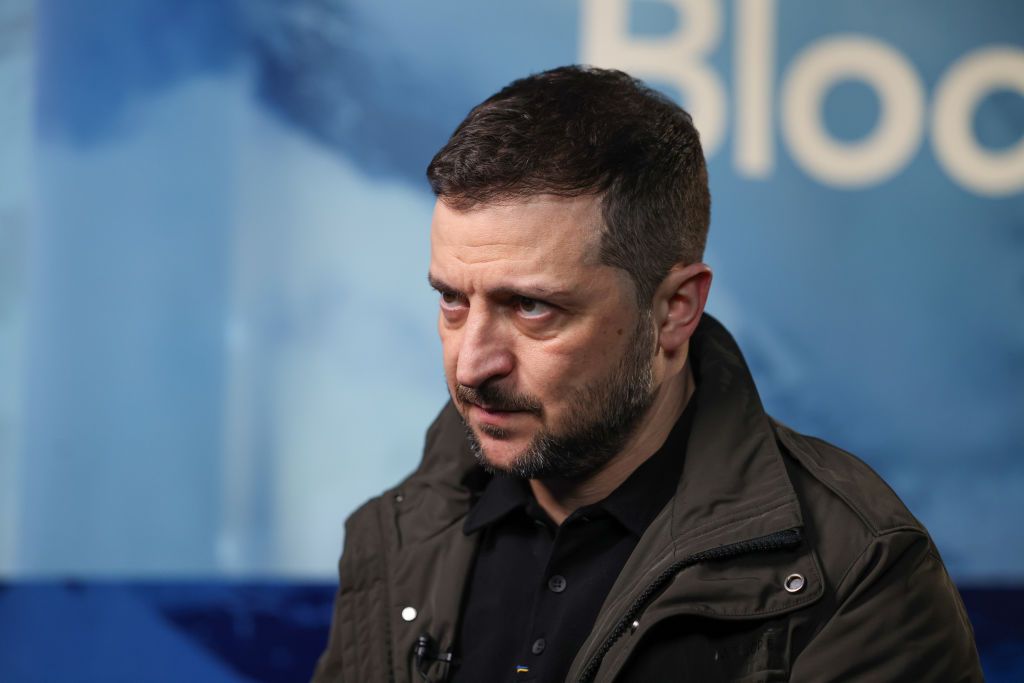


Ukraine's largest private energy company DTEK and British clean energy group Octopus Energy have launched a program to install rooftop solar panels and battery storage systems at Ukrainian businesses and public institutions, DTEK said in a press release on June 23.
The program, called RISE (Resilient Independent Solar Energy), was announced at Octopus Energy's Tech Summit in London and aims to raise 100 million euros ($115 million) to finance 100 energy projects over three years, helping stabilize the grid, lower electricity costs and protect customers from outages, the company said.
DTEK’s facilities have been repeatedly targeted since the start of Russia’s full-scale invasion as Moscow sought to cripple Ukraine's energy infrastructure. The company was forced to shut down its gas production facilities in Poltava Oblast in March.
"About 70% of Ukraine's thermal generation capacity has been damaged, destroyed or seized since the full-scale invasion," said DTEK CEO Maksym Timchenko in the press release.
“This has created not only an urgent need to rebuild but also an opportunity to accelerate the shift to a decentralized, renewable energy system,” he added.
The alternative energy systems will be installed by D.Solutions, DTEK's business unit operating under the Yasno retail brand.
Installed equipment will run on Octopus Energy's AI-powered Kraken operating system, enabling businesses to optimize energy use in real time, reduce consumption during peak hours and sell surplus electricity back to the grid.
"They (DTEK) are rebuilding at pace and pioneering a decentralized, smart energy system powered by homegrown renewables," said Greg Jackson, Octopus Energy Group founder and CEO.
According to DTEK, Ukraine's commercial and industrial energy market has an untapped potential of 300 megawatts annually, valued at 200 million euros ($229 million). DTEK's Yasno brand serves over 60,000 business customers and can generate projects worth 30 million euros per year.
DTEK previously announced plans to build one of Europe's largest energy storage facilities with six installations across the country, totaling 200 megawatts to power 600,000 households. The company secured a $72 million loan from three Ukrainian banks.
 The Kyiv IndependentKollen Post
The Kyiv IndependentKollen Post
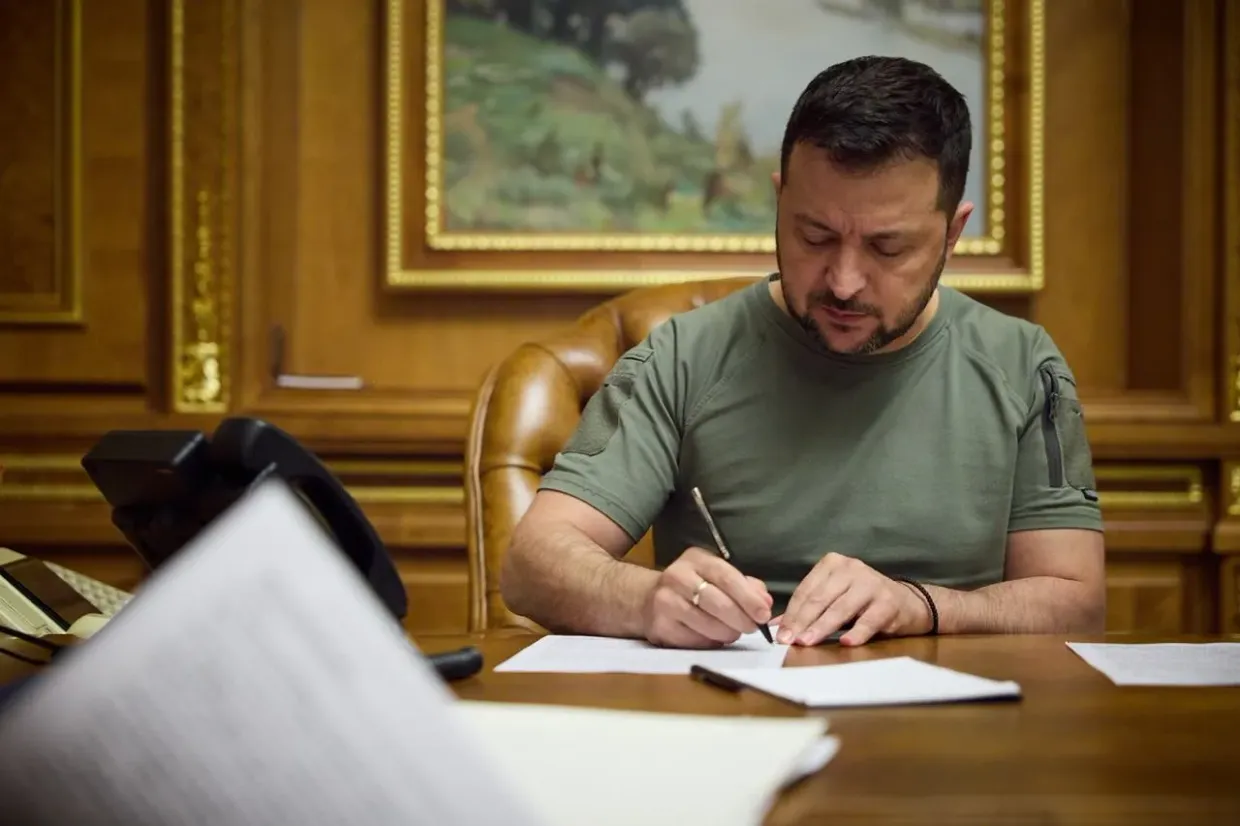

President Volodymyr Zelensky signed an order on June 22 to impose sanctions on individuals and legal entities doing business in the Russian-occupied territories of Ukraine, including Crimea.
According to Zelensky, the sanctions are targeting "those who cooperate with the (Russian) occupier on our land," as they "help justify the aggression, consider it normal to make money in the occupation, and pay taxes" to Russia.
The order, which follows a decision of Ukraine's National Security and Defense Council, was published on the Presidential Office's website together with the lists of sanctioned individuals and companies.
The order is only the beginning of a larger plan for sanctions against such individuals, with more steps coming soon, Zelensky wrote.
According to Zelensky, Ukrainian authorities are also working to fully synchronize Ukrainian sanctions with the steps by foreign partners.
"Justice must prevail in all jurisdictions and truly restrict all those who choose Russia and war," he added.
The lists of sanctioned individuals and companies published on the Presidential Office's website did not clarify the nature of their business activities or collaboration with the Russian occupation authorities and state.
The list includes lawmaker Artem Dmytriuk, who fled Ukraine in August 2024 and is suspected of assaulting a police officer and a military service member.
Fugitive ex-lawmaker Oleksandr Onyshchenko, who was sentenced in absentia to 15 years in prison for large-scale fraud in the gas sector between 2013 and 2016, is also among the newly sanctioned individuals.
Arricano Real Estate PLC, which owns several large shopping malls in Kyiv and other Ukrainian cities, was also sanctioned together with its former majority auctioneer, Estonian businessman Hillar Teder. Until 2024, Arricano's shareholders included Dragon Capital, Ukraine's largest investment company owned by Czech businessman Tomas Fiala.
Ukrainian laws on collaboration had long raised discussions among members of the public, academics, and practitioners.
According to an article from 2024 by the Zmina Human Rights Center, Ukraine's law recognizes doing business in occupied territories as a crime of collaboration. Human rights defenders have conducted research that has highlighted the law's flaws and problems with its application.
A 2023 report by the Ukrainian Helsinki Human Rights Union said that enacting legal consequences for collaboration according to the law could breach the International Human Rights Conventions in some cases.
"The law does not take into account cases when a person conducts economic activities to cover the basic needs of his or her family or when such activities support the livelihood of the population under occupation," the Zmina Human Rights Center wrote.
 The Kyiv IndependentTim Zadorozhnyy
The Kyiv IndependentTim Zadorozhnyy
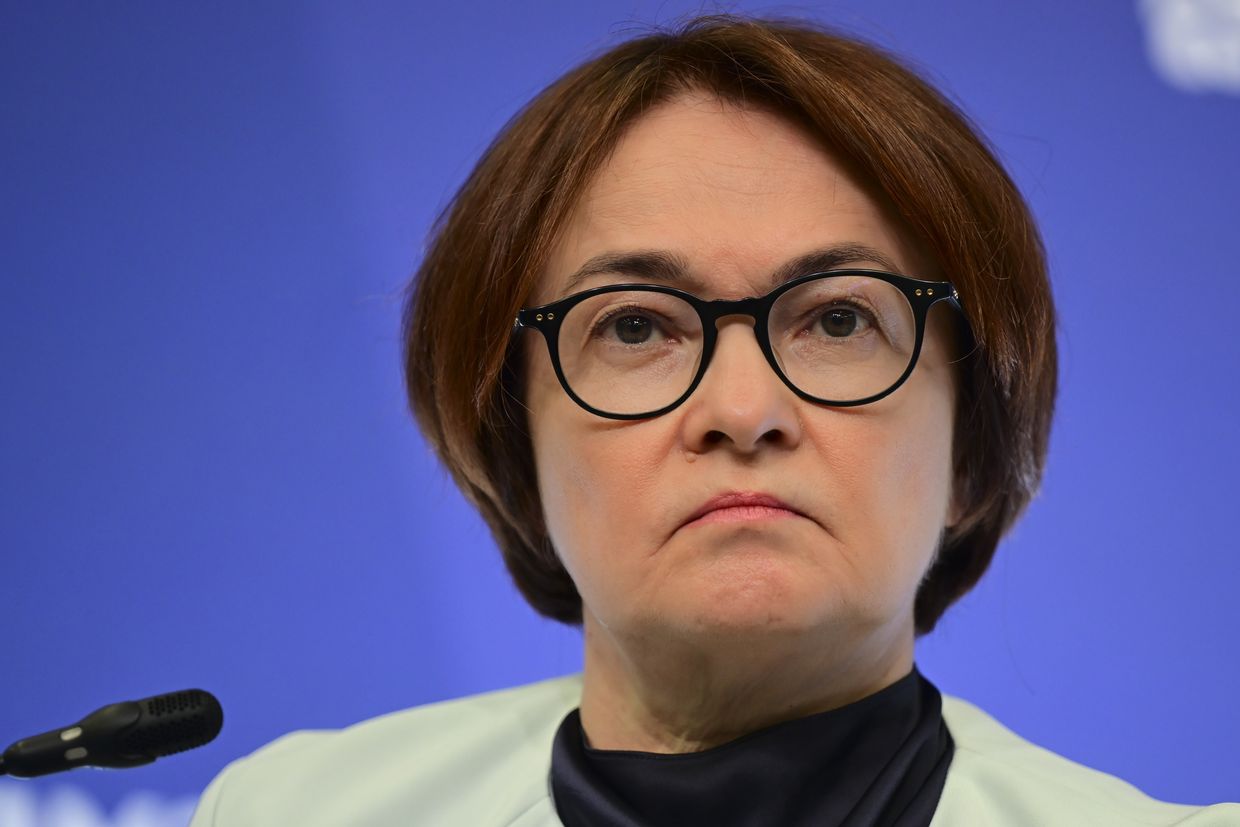

Editor's note: This story was updated to include Russian President Vladimir Putin's remarks at the St. Petersburg International Economic Forum.
Russia's wartime economic momentum is fading fast, with key resources nearly exhausted, Russian Central Bank Governor Elvira Nabiullina said, warning that the country can no longer rely on the same tools that sustained growth in the first two years of the full-scale war against Ukraine, the Moscow Times reported on June 19.
Speaking at the St. Petersburg International Economic Forum, Nabiullina said that the Russian economy had been expanding on the back of "free resources," including labor, industrial capacity, bank capital reserves, and liquid assets from the National Wealth Fund (NWF) — all of which are now reportedly nearing depletion.
"We grew for two years at a fairly high pace because free resources were activated," she said. "We need to understand that many of those resources have truly been exhausted."
Speaking at the same forum, Russian President Vladimir Putin ordered officials "not to allow stagnation or recession" in the Russian economy under any circumstances.
"We must consistently change the structure of our economy," he said.
The comments come after Russia's ambassador to the U.K., Andrei Kelin, claimed in an interview with CNN this week that Russia is spending "only 5–7%" of its federal budget on the war. Kelin claimed that Russia can continue waging its war, saying Moscow "is winning."
According to the state statistics agency Rosstat, Russia's unemployment rate has dropped to a historic low of 2.3%. At the same time, mass emigration and large-scale wartime recruitment have created a labor shortage estimated at 2 million people. Industrial capacity utilization has surged beyond 80%, the highest in modern Russian history.
 The Kyiv IndependentThe Kyiv Independent news desk
The Kyiv IndependentThe Kyiv Independent news desk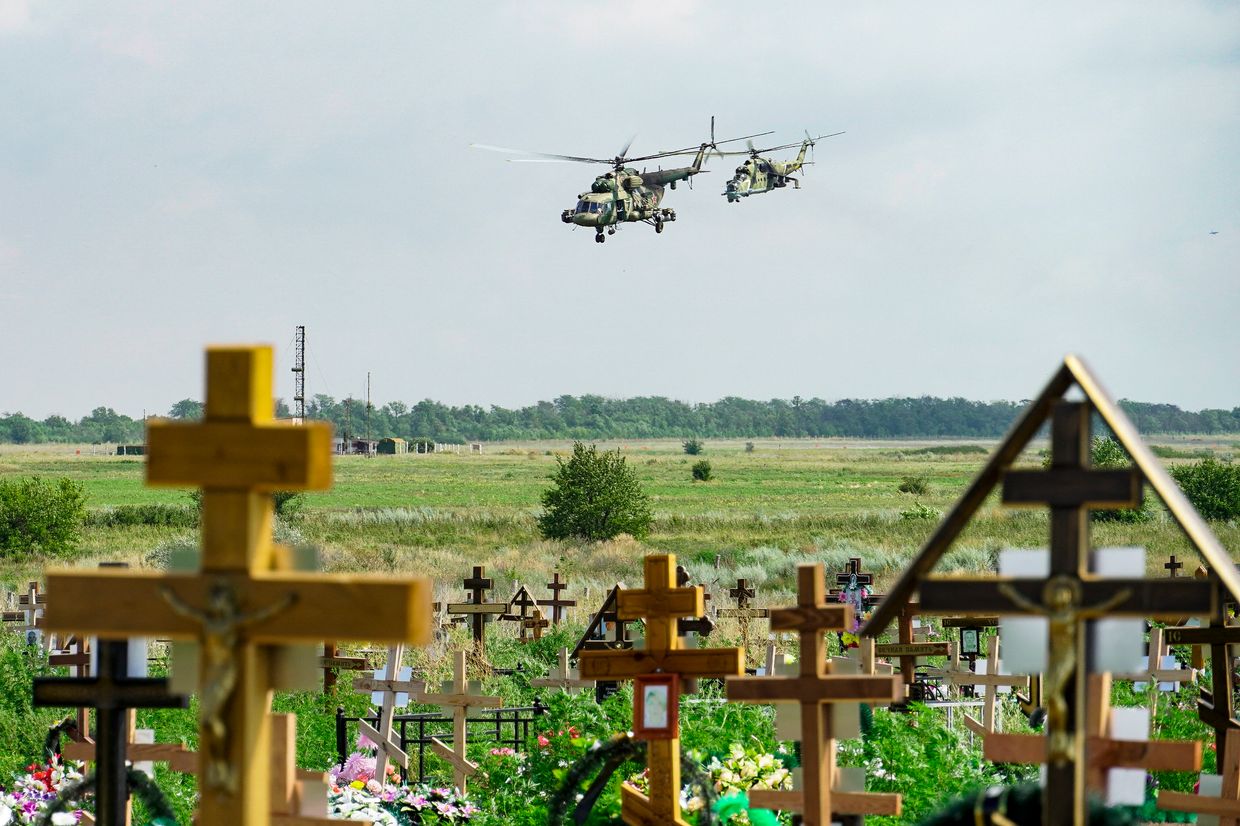
Russia's economy is now "on the verge of a transition to recession," Russian Economy Minister Maxim Reshetnikov said at the same forum. Official data show that GDP growth slowed from 4.1% in late 2023 to just 1.4% in the first quarter of 2024, with the economy contracting quarter-on-quarter for the first time since 2022.
Business profits in March fell by one-third overall and dropped by half in the critical oil and gas sector. Industrial growth stagnated at 1.2% year-over-year between January and April, while civilian sectors of the economy began shrinking. Retail turnover growth slowed from 7.2% in December to just 2.4% in April.
An anonymous Russian analyst told Novaya Gazeta Europe that government technocrats are effectively telling Putin it's time to choose between "war or economy."
During its invasion of Ukraine, Russia has faced rising inflation due to record military spending, pushing the central bank to maintain high interest rates. Under government pressure, the bank cut the rate slightly from 21% to 20% earlier in June, despite concerns about weakened private investment.
Officials have scaled back key development projects and reduced shipments of metals and oil products. Early hopes for recovery in 2025, driven by talks with the U.S., have faded as inflation and sanctions weigh heavily on growth.
 The Kyiv IndependentChris York
The Kyiv IndependentChris York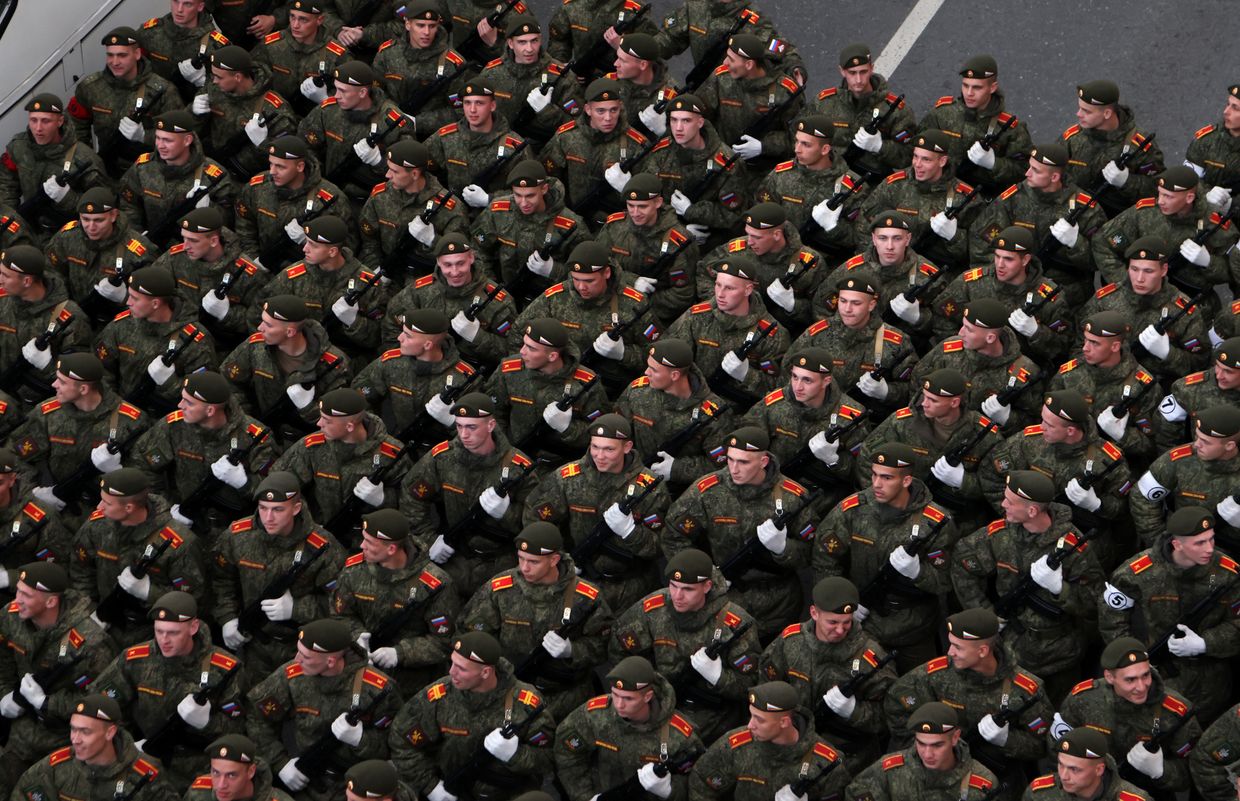
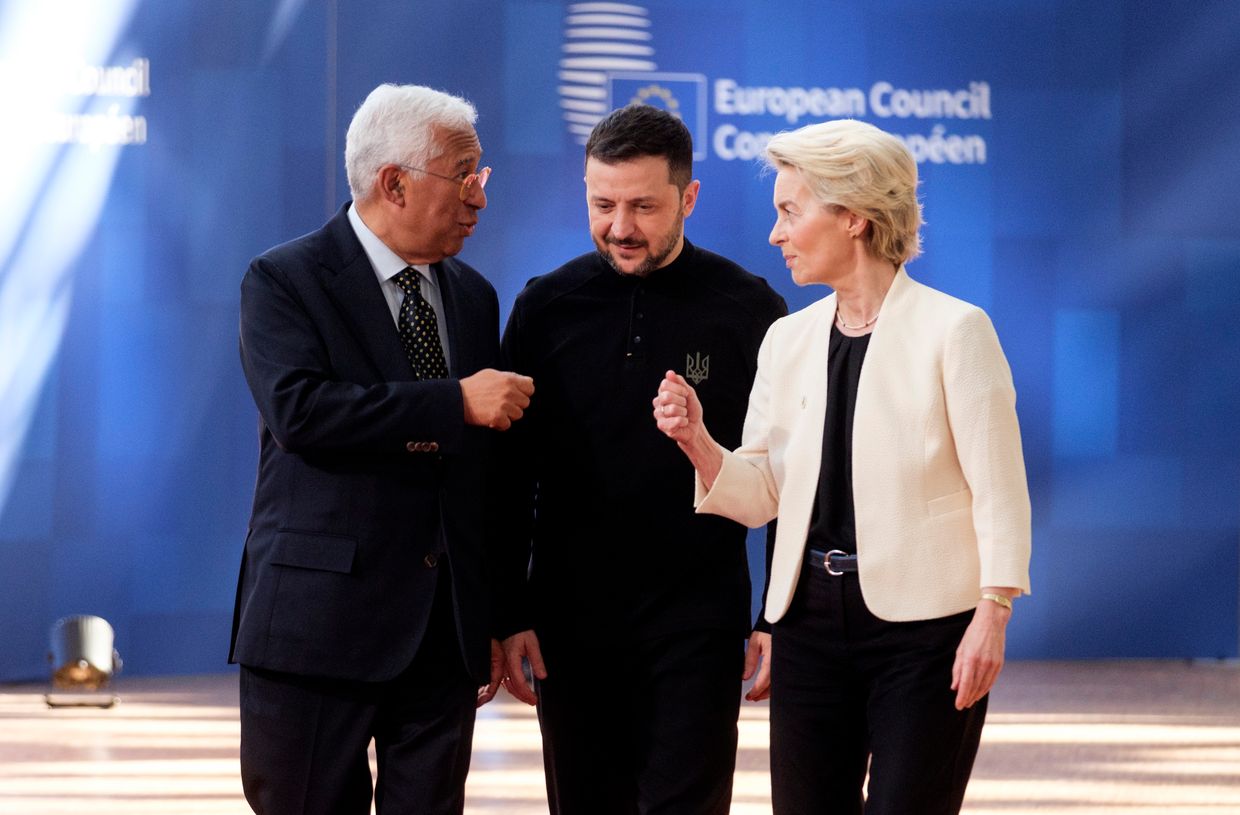

The European Union is developing a plan to generate more revenue for Ukraine by shifting nearly 200 billion euros ($215 billion) in frozen Russian assets into higher-yield, riskier investments, Politico reported on June 19, citing unnamed sources.
The assets, largely held by Belgium-based clearinghouse Euroclear, have been immobilized since 2022 under EU sanctions imposed following Russia's full-scale invasion of Ukraine.
Under the current framework, the funds are invested conservatively with the Belgian central bank, generating low but steady returns. In 2024, this approach yielded around 4 billion euros ($4.3 billion) in windfall profits, which the EU allocated to help service a G7-backed 45-billion-euro loan for Ukraine (around $50 billion).
Now, with that loan largely disbursed and concerns mounting over future financing, especially amid signals from U.S. President Donald Trump that American support could be scaled back, EU officials are under pressure to find new funding streams.
According to Politico, the proposed plan would redirect the frozen Russian assets into a special investment fund under EU control, allowing for higher returns without confiscating the assets — a move designed to sidestep legal and political opposition.
As part of the current G7-led funding framework, Ukraine has already received 7 billion euros ($8 billion) from the EU under the Extraordinary Revenue Acceleration (ERA) initiative, which uses profits from frozen Russian sovereign assets to fund loans.
Prime Minister Denys Shmyhal confirmed on June 13 that a fifth tranche of 1 billion euros ($1.1 billion) had been disbursed to support Ukraine's state budget. The ERA mechanism, part of the broader $50 billion G7 program, aims to ensure stable financing for Kyiv while making Russia shoulder the cost of its aggression.
According to Politico, finance ministers from all 27 EU countries are expected to debate the idea during an informal dinner in Luxembourg on June 19.
Poland, which currently holds the Council of the EU's rotating presidency, emphasized the urgency of the discussions, writing in an invitation letter seen by Politico that "further steps regarding the sanctions regime" and the potential use of frozen Russian assets "must be addressed."
The European Commission has also been holding informal consultations with a group of member states, including France, Germany, Italy, and Estonia, to explore legal options for keeping the Russian assets frozen in case Hungary exercises its veto power during the semiannual sanctions renewal process. So far, no workaround has been finalized.
Hungarian Prime Minister Viktor Orban has repeatedly threatened to block sanctions extensions as a gesture of goodwill toward Moscow, raising concerns the assets could be unfrozen and returned to Russia by default.
By now, much of the EU's 50-billion-euro ($57 billion) Ukraine Facility, agreed in 2023 and intended to last through 2027, has already been spent. The bloc's broader 1.2-trillion-euro ($1.37 billion) budget is stretched thin, and any additional top-ups would also require unanimous support.
 The Kyiv IndependentChris York
The Kyiv IndependentChris York
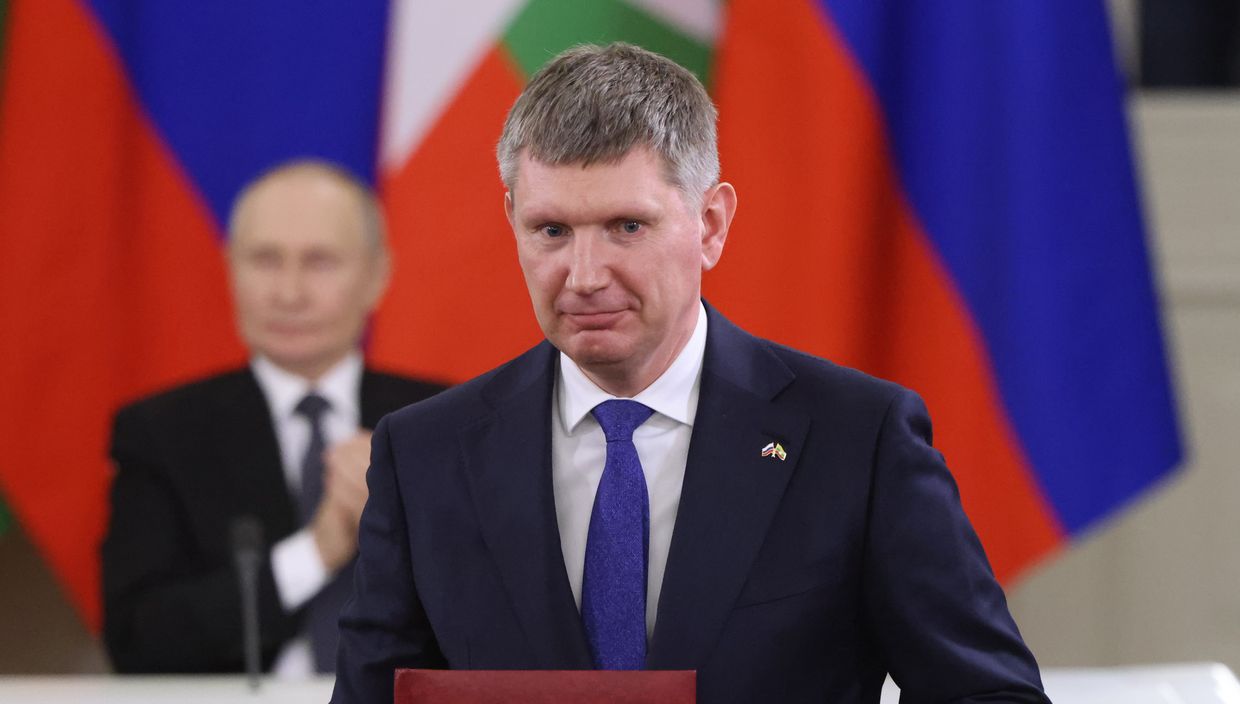

The Russian economy appears to be "on the verge of a transition to recession," Russian Economy Minister Maxim Reshetnikov said on June 19, adding that the next step will be decisive.
The comments underscore Russia's mounting economic challenges as it continues its all-out war against Ukraine.
"According to figures, we have a cooling stage (in the economy). But all our numbers are like a rearview mirror," Reshetnikov said at the St. Petersburg International Economic Forum when asked about Russia's economic situation.
"According to current business perceptions, we are already, it seems, on the verge of a transition to a recession," the minister added. Reshetnikov clarified that recession is not inevitable and that "everything depends on our decisions."
Russia has faced soaring inflation during its invasion of Ukraine, driven by record wartime spending. This forced the central bank to set one of the highest key interest rates in decades, hurting private investments in non-defense-related sectors.
Facing government pressure, the central bank slashed the interest rate from 21% to 20% earlier this month.
Reshetnikov himself urged the central bank to cut rates in order to boost growth, aiming to achieve a 3% growth target set by Russian President Vladimir Putin.
Russia has been forced to slash key projects across various sectors in the face of an economic slowdown, brought on in part by plummeting oil prices. Major Russian exporters have also cut down on rail shipments of metals and oil products, even beyond earlier projected reductions.
After some positive signals earlier in 2025 due to U.S. President Donald Trump's outreach to Moscow and hopes for a ceasefire, more recent reports again indicate a sharp slowdown in Russia's economic growth.
Analysts have connected this development to the central bank policies, sanctions, low oil prices, supply difficulties, and high inflation.
 The Kyiv IndependentOlena Goncharova
The Kyiv IndependentOlena Goncharova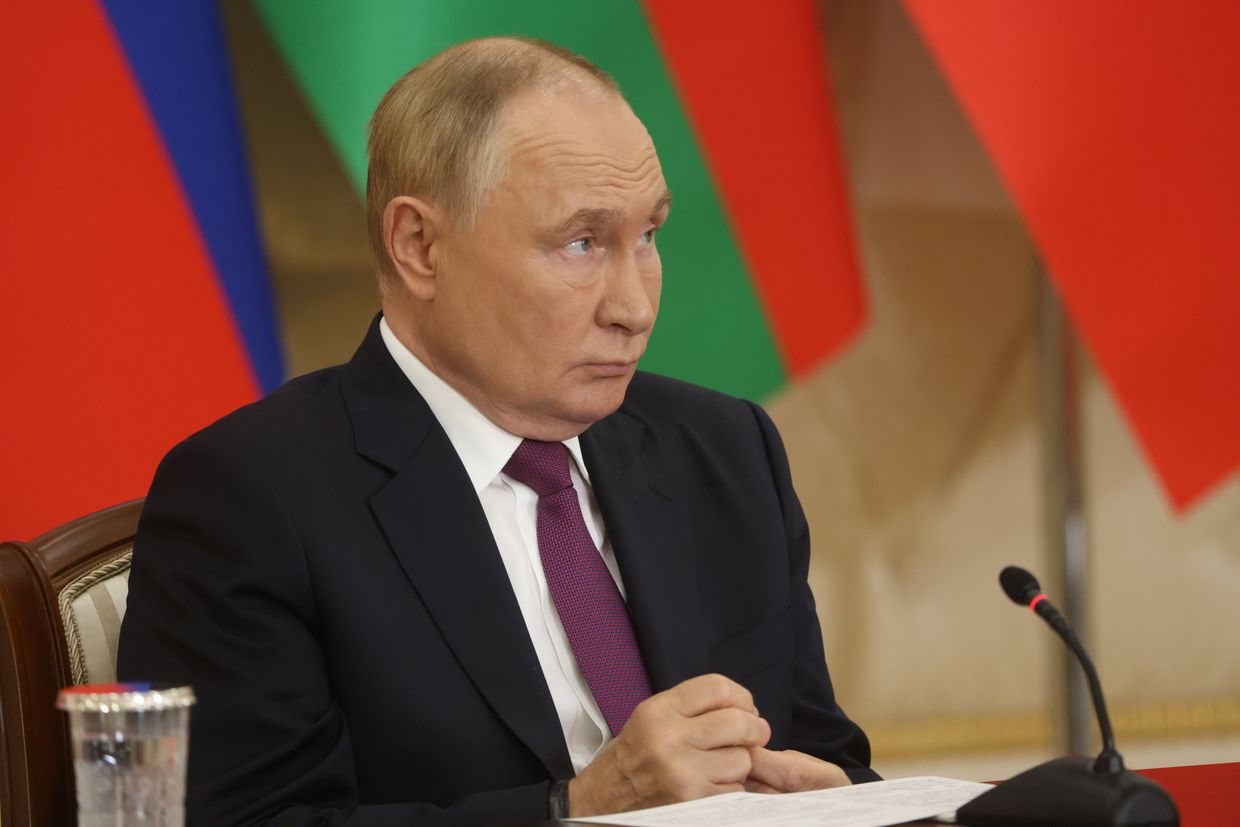
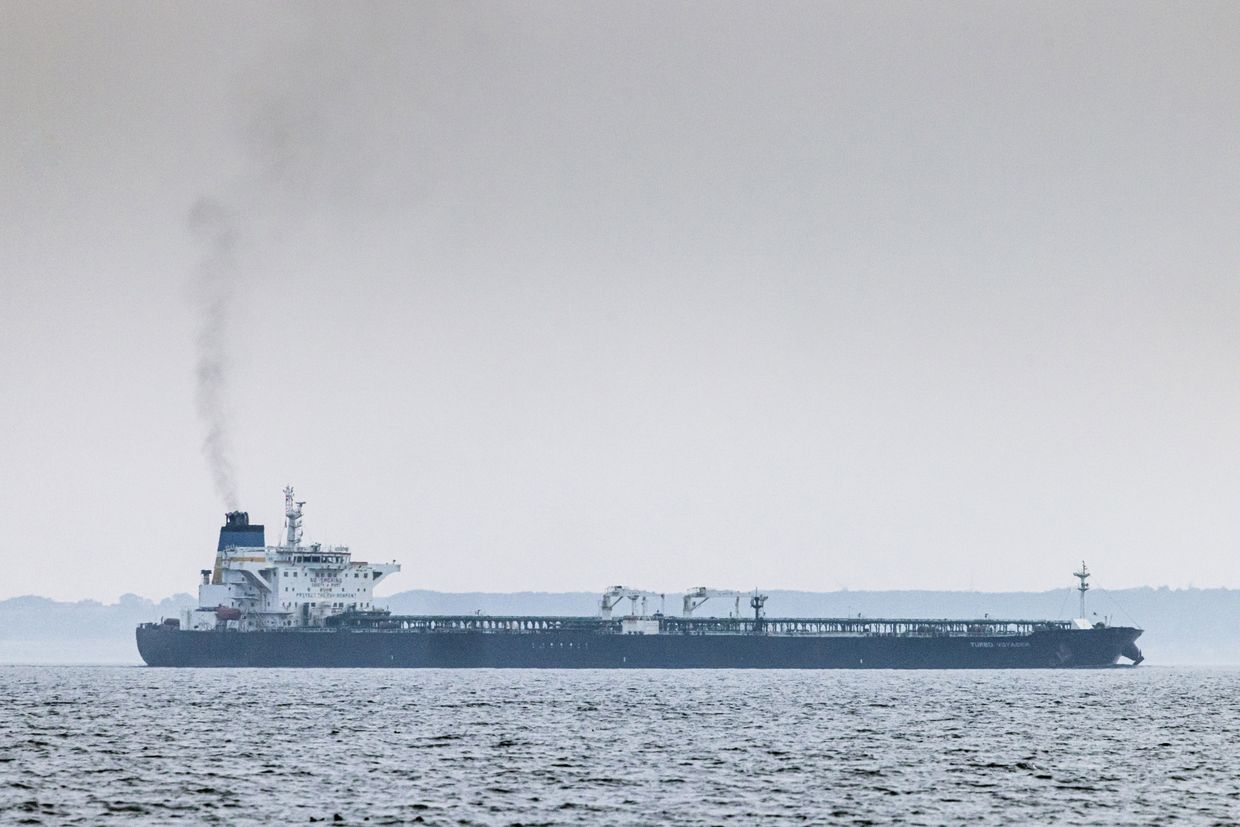

Australia has, for the first time, imposed sanctions on Russia's so-called "shadow fleet" of oil tankers, targeting 60 vessels used to circumvent international sanctions and sustain the Kremlin's war effort in Ukraine, the Australian government said on June 18.
The move aligns Canberra with similar measures introduced by the United Kingdom, Canada, and the European Union.
Australia's Foreign Ministry said the sanctioned vessels operate under "deceptive practices, including flag-hopping, disabling tracking systems and operating with inadequate insurance," enabling illicit Russian oil trade that undermines international sanctions.
"Russia uses these vessels to circumvent international sanctions and sustain its illegal and immoral war against Ukraine," the ministry said in a statement.
With this move, Australia has now sanctioned more than 1,400 Russian individuals and entities since Moscow's full-scale invasion of Ukraine began in February 2022, the government said.
The step comes amid the continued operation of Russia's shadow fleet. According to a recent study by the Kyiv School of Economics (KSE), Russia currently operates 435 tankers outside the control of Western regulators to evade sanctions such as the G7-EU price cap on Russian oil.
These vessels are typically un- or underinsured and pose a rising environmental risk due to their age and operational opacity.
KSE estimates that as of April 2024, 83% of Russia's crude oil and 46% of its petroleum product exports were shipped using shadow fleet tankers. The study warns that this undermines the effectiveness of Western sanctions and increases the likelihood of maritime disasters, as many of these ships fall outside international safety and insurance standards.
The EU formally adopted its 17th sanctions package against Russia in May, sanctioning nearly 200 vessels tied to the shadow fleet. EU foreign policy chief Kaja Kallas said the new measures also target hybrid threats and human rights violations, with more sanctions under consideration.
Some EU member states and observers have criticized the package for lacking stronger provisions to disrupt Russia's sanction evasion schemes.
Now, the EU seeks to approve its 18th sanctions package, which will add 77 more shadow fleet vessels to comply with the cap to prevent Russia from circumventing sanctions and propose imposing a ban on imports of petroleum products made from Russian oil.
The United States has signaled reluctance to pursue additional sanctions despite Moscow's continued aggression in Ukraine and rejection of ceasefire proposals supported by Western allies.
 The Kyiv IndependentAnna Fratsyvir
The Kyiv IndependentAnna Fratsyvir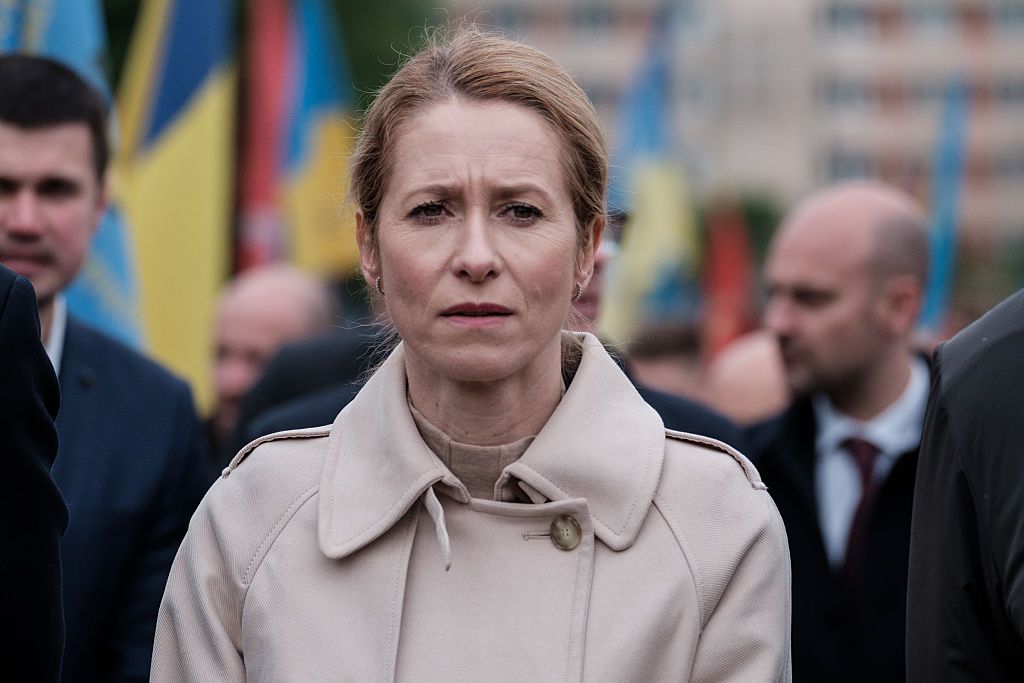
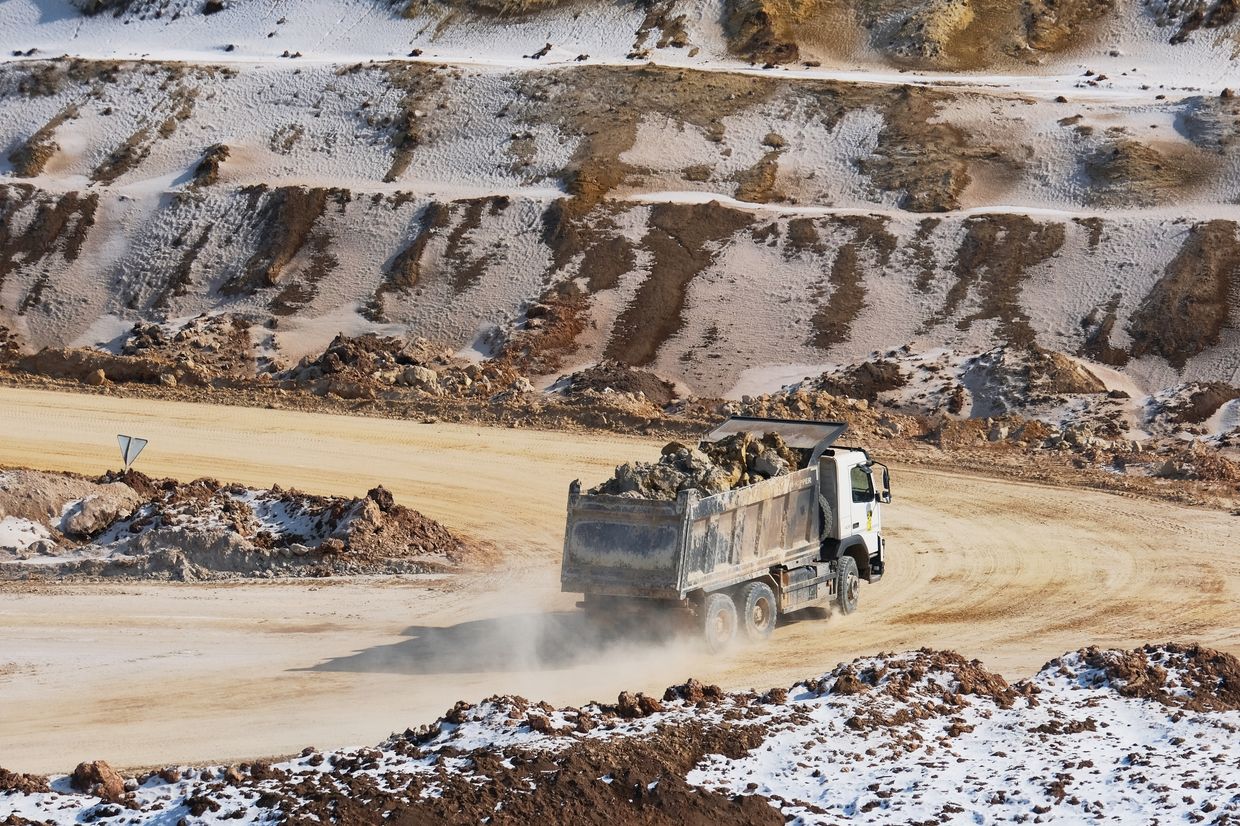

More than a month after Ukraine signed a landmark agreement granting the United States a stake in its mineral reserves, Kyiv has approved initial steps to open one of its largest lithium deposits to private investors, the New York Times (NYT) reported, citing two government officials.
On June 16, the Ukrainian government agreed to begin drafting recommendations for a bidding process to develop the Dobra lithium field in central Ukraine. According to the officials, who spoke to NYT on condition of anonymity, this would be the first project advanced under the U.S.-Ukraine minerals deal.
The Dobra lithium ore site is located in the Novoukrainskyi district of Kirovohrad Oblast, rougly 300 kilometers southeast of Kyiv.
The deal, signed by President Volodymyr Zelensky on May 12, is aimed at deepening economic ties, boosting Ukraine's reconstruction, and positioning the country as a supplier of strategic resources to the U.S.
Among the likely bidders for the Dobra field is a consortium including TechMet, an energy investment firm partly owned by the U.S. government, and billionaire Ronald S. Lauder, a close associate of the U.S. President Donald Trump. The group has long expressed interest in the Dobra site and encouraged Zelensky to open it to bids last year.
Under the broader agreement, half of the revenues from mineral extraction would go to a joint U.S.-Ukraine investment fund. While the Ukrainian government would reinvest its share into the domestic economy, the United States would claim a portion of the profits — a structure Mr. Trump has framed as partial repayment for U.S. assistance to Ukraine.
TechMet CEO Brian Menell said investors were pushing for production-sharing agreements, which offer long-term stability and tax incentives. Monday’s step toward opening the Dobra field is based on such an arrangement, according to the outlet.
 The Kyiv IndependentThe Kyiv Independent news desk
The Kyiv IndependentThe Kyiv Independent news desk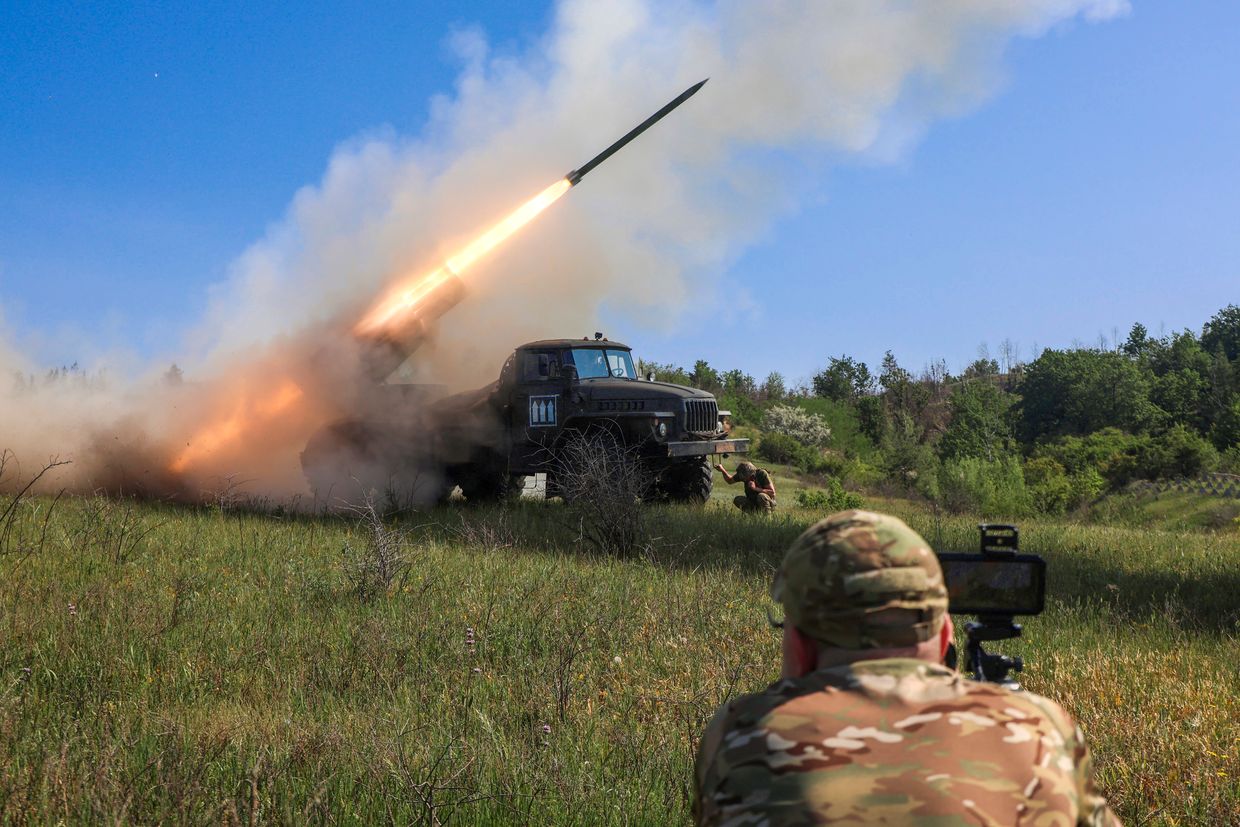
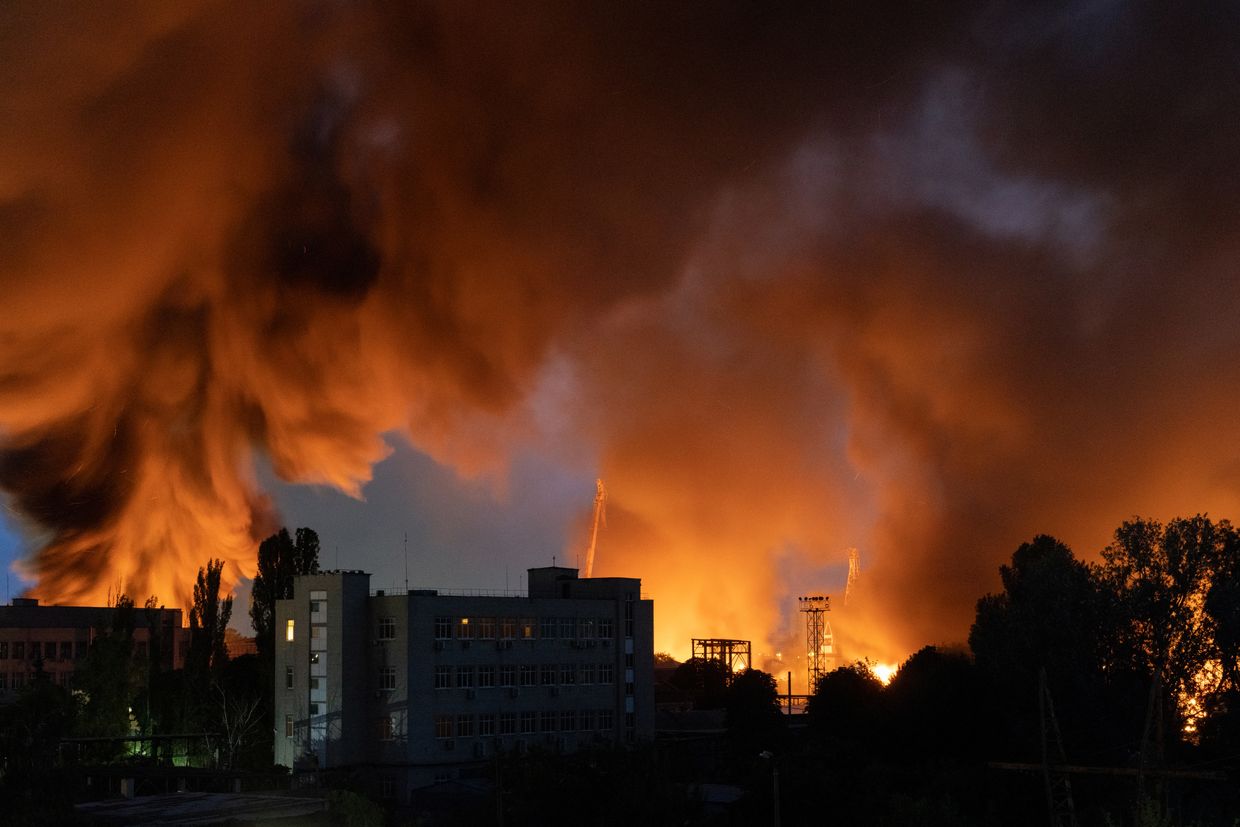

Russia deliberately targeted a building used by the U.S. aerospace and defense giant Boeing in a recent attack on Kyiv, the Financial Times reported on June 15.
Overnight on June 9-10, Russian forces launched hundreds of drones and seven missiles in one of the biggest attacks on Ukraine, damaging buildings across the capital. One of the targets included Boeing’s office, according to two Boeing employees, three Ukrainian officials, and the head of the American Chamber of Commerce (ACC) in Ukraine, whom the FT spoke with.
"This is not just an attack against Ukraine, but also an attack where American business is being hit," Andy Hunder, President of the ACC in Ukraine, which represents nearly 700 U.S. and international investors and corporate members, told the Kyiv Independent.
"This is a war against a world where American businesses are making money and thriving," he added.
The strikes on Kyiv came after Ukraine surprised Russia with Operation Spiderweb that saw hundreds of drones target four airbases in Russia and damage 41 war planes. Moscow promised to retaliate in response.
Boeing, one of the largest American companies operating in Ukraine, cooperates with the Ukrainian aerospace and defense company Antonov, with the two companies exploring several joint ventures and opportunities, including in defense.
Boeing told the FT that none of its employees were injured in the attack and that it continues to operate in Ukraine, where it employs some 1,000 people.
Antonov has also suffered from Russian strikes, as have other defense production sites. As Ukraine pushes for domestic defense production instead of relying on foreign imports, Ukrainian officials say that Moscow is attempting to hinder Ukraine’s efforts to manufacture arms.
German defense company Rheinmetall opened up a factory in Ukraine last October to produce a batch of Lynx infantry fighting vehicles. Moscow threatened the company, saying it was a legitimate target, although Rheinmetall said its facilities are well protected.
Russia has repeatedly targeted other Western businesses. Nearly half of the ACC’s members have had facilities damaged or destroyed, but 90% still continue to operate in Ukraine, Hunder said.
"The American business community is here, it continues to operate, and it's united," he added.
 The Kyiv IndependentKateryna Hodunova
The Kyiv IndependentKateryna Hodunova
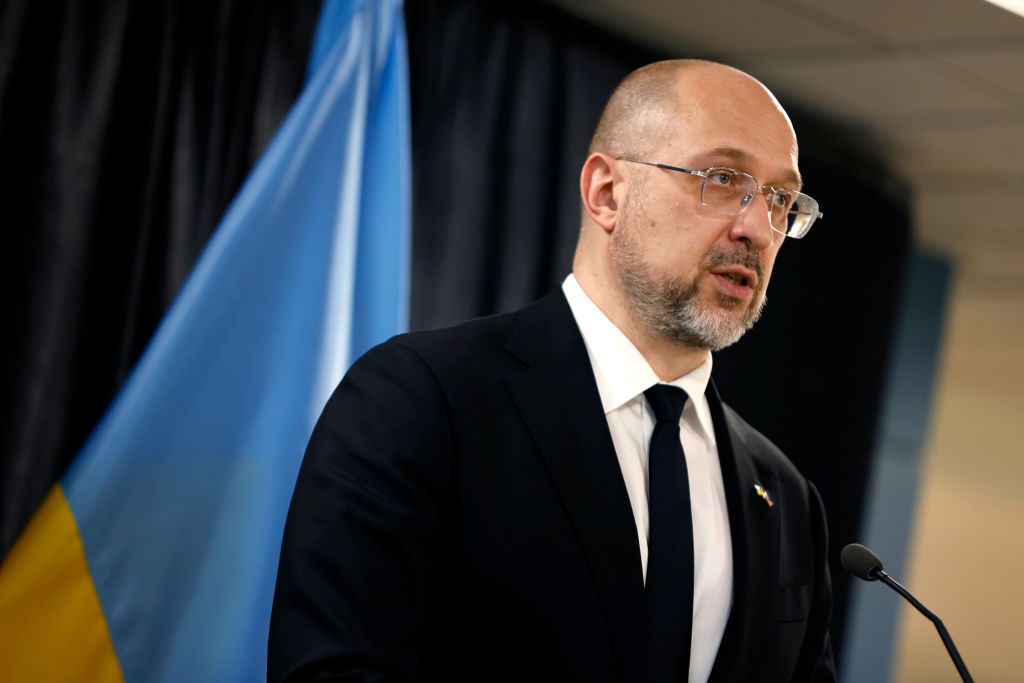

Ukraine has received another 1 billion euros ($1.1 billion) in macro-financial assistance from the European Union as part of a G7 loan, Prime Minister Denys Shmyhal announced on June 13.
"This is the fifth tranche of macro-financial assistance from the EU under the ERA Extraordinary Revenue Acceleration) initiative," Shmyhal wrote on social media. "The funds will be directed toward key expenditures of the state budget."
Shmyhal thanked Ukraine's partners for their "consistent and reliable support," adding, "Together, we will make (Russia) pay for all the damage caused to Ukraine."
According to Shmyhal, Ukraine has received a total of 7 billion euros ($8 billion) from the European Union under the ERA initiative, which is funded by the windfall profits generated from immobilized Russian sovereign assets.
The ERA mechanism, launched by the G7 and backed by the EU and the United States, is a $50 billion program designed to support Ukraine through loans repaid using future income from frozen Russian assets. Since Russia's full-scale invasion in 2022, G7 countries have frozen around $300 billion in Russian sovereign assets.
Ukraine received the previous 1-billion-euro tranche on May 8 as part of the fourth installment of EU aid under ERA.
 The Kyiv IndependentKateryna Hodunova
The Kyiv IndependentKateryna Hodunova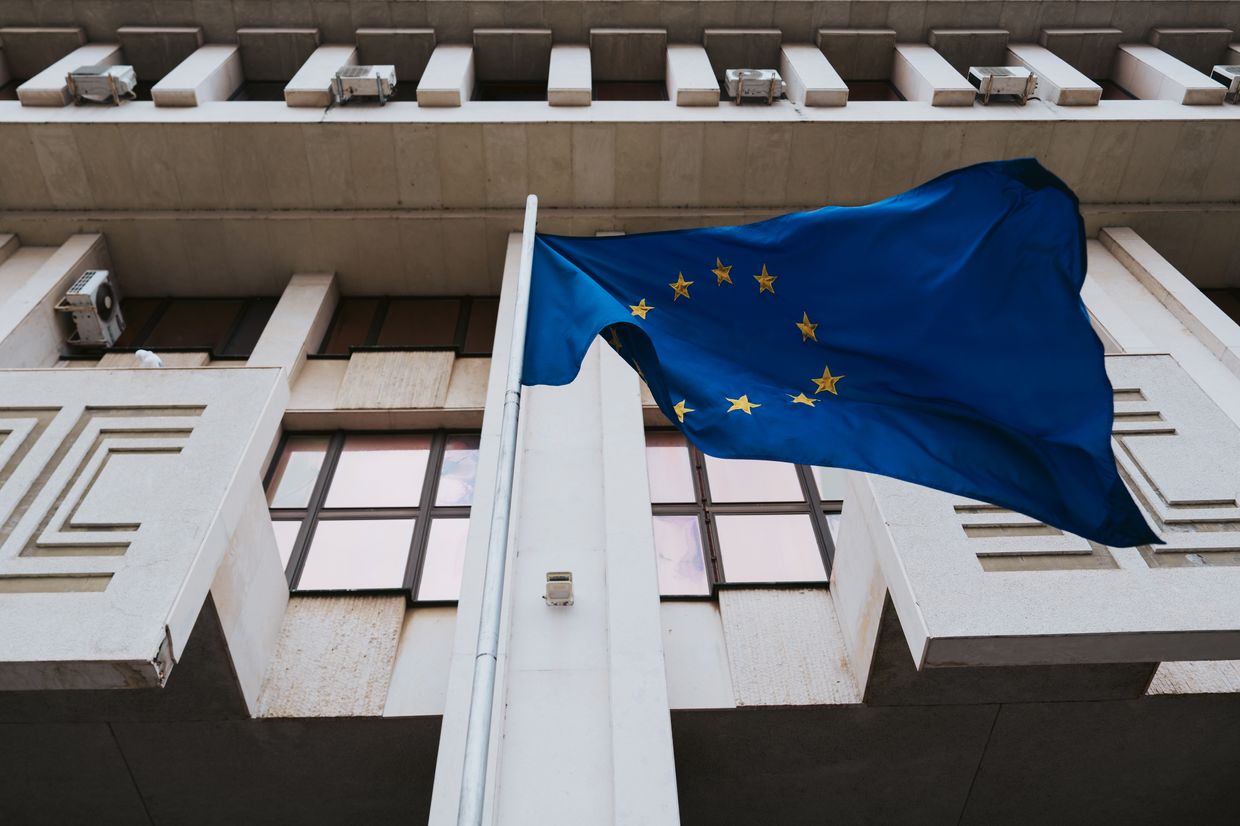
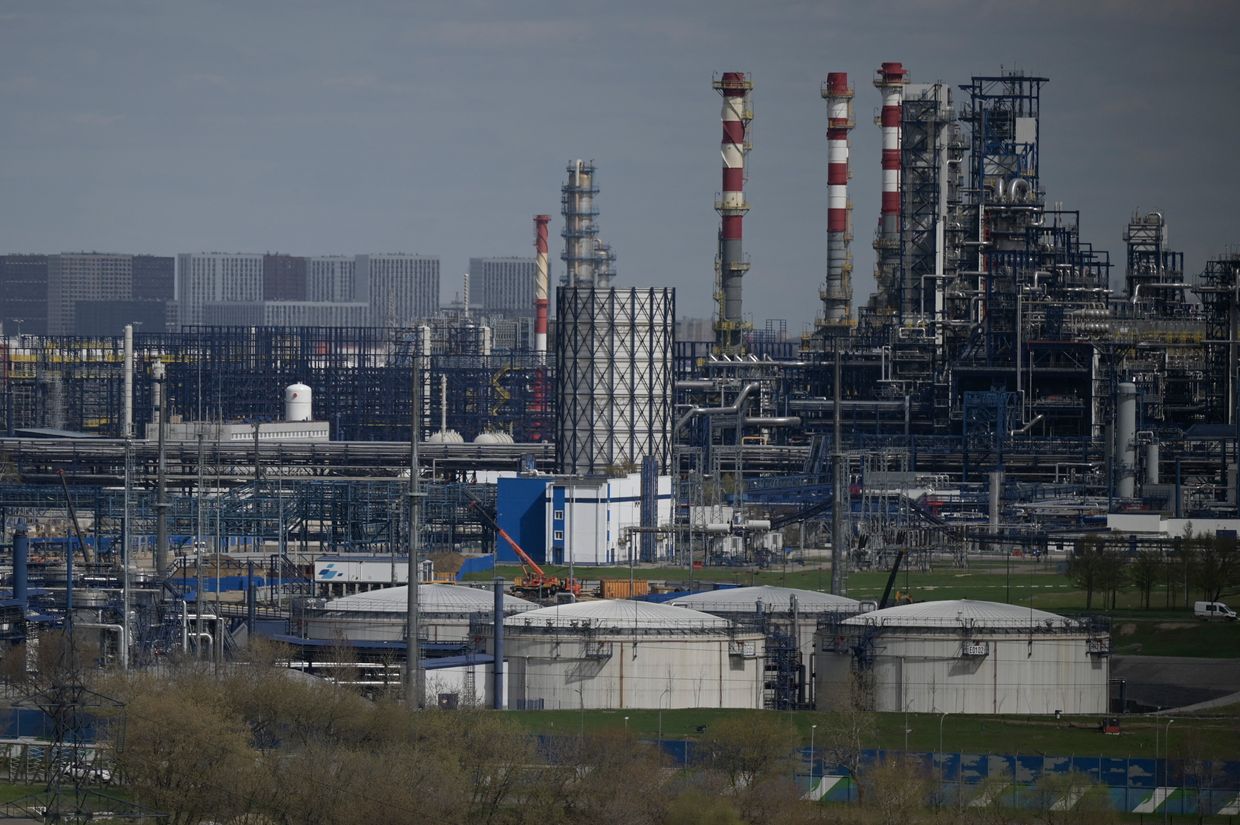

Global oil prices soared on June 13 after Israel launched a strike on Iran, triggering fears of a broader conflict in the energy-rich Middle East that could disrupt global supplies, the BBC reported.
The spike threatens to undermine Western efforts to choke off a vital revenue stream for Russia, which relies heavily on oil profits to sustain its war in Ukraine.
According to the BBC, Brent and Nymex crude prices jumped by more than 10% following the Israeli attack, reaching their highest levels since January. Prices later stabilized but remained about 7.5% higher, with Brent at $74.50 a barrel and Nymex at $73.20.
The price surge comes at a crucial time for Ukraine and its Western allies, who are intensifying efforts to minimize the Kremlin's oil revenues — the backbone of Russia's wartime economy.
President Volodymyr Zelensky urged the European Union on June 11 to impose tougher sanctions on Russia, including a more aggressive price cap on oil exports.
"A ceiling of $45 per barrel of oil is better than $60, that's clear," Zelensky said at the Ukraine-Southeast Europe Summit in Odesa. "But real peace will come with a ceiling of $30. That's the level that will really change the mindset in Moscow."
The EU's current $60 per barrel cap, introduced in December 2022, prohibits Western companies from shipping, insuring, or servicing Russian oil sold above the threshold. While this measure has curtailed some of Russia's profits, the Kremlin continues to earn significant revenue, especially when market prices rise.
European Commission President Ursula von der Leyen said on June 10 that the EU is considering lowering the cap to $45, a move that will be discussed at the G7 summit in Canada between June 15 and 17. According to Reuters, most G7 countries, excluding the U.S. and Japan, are prepared to proceed with the reduction regardless of Washington’s stance.
Israeli Prime Minister Benjamin Netanyahu said early on June 13 that Israeli forces had launched "Operation Rising Lion," a preemptive strike targeting Iran's nuclear program. In a televised address, Netanyahu claimed Israeli forces struck Iran's main nuclear enrichment site in Natanz and targeted key nuclear scientists.
 The Kyiv IndependentWojciech Jakóbik
The Kyiv IndependentWojciech Jakóbik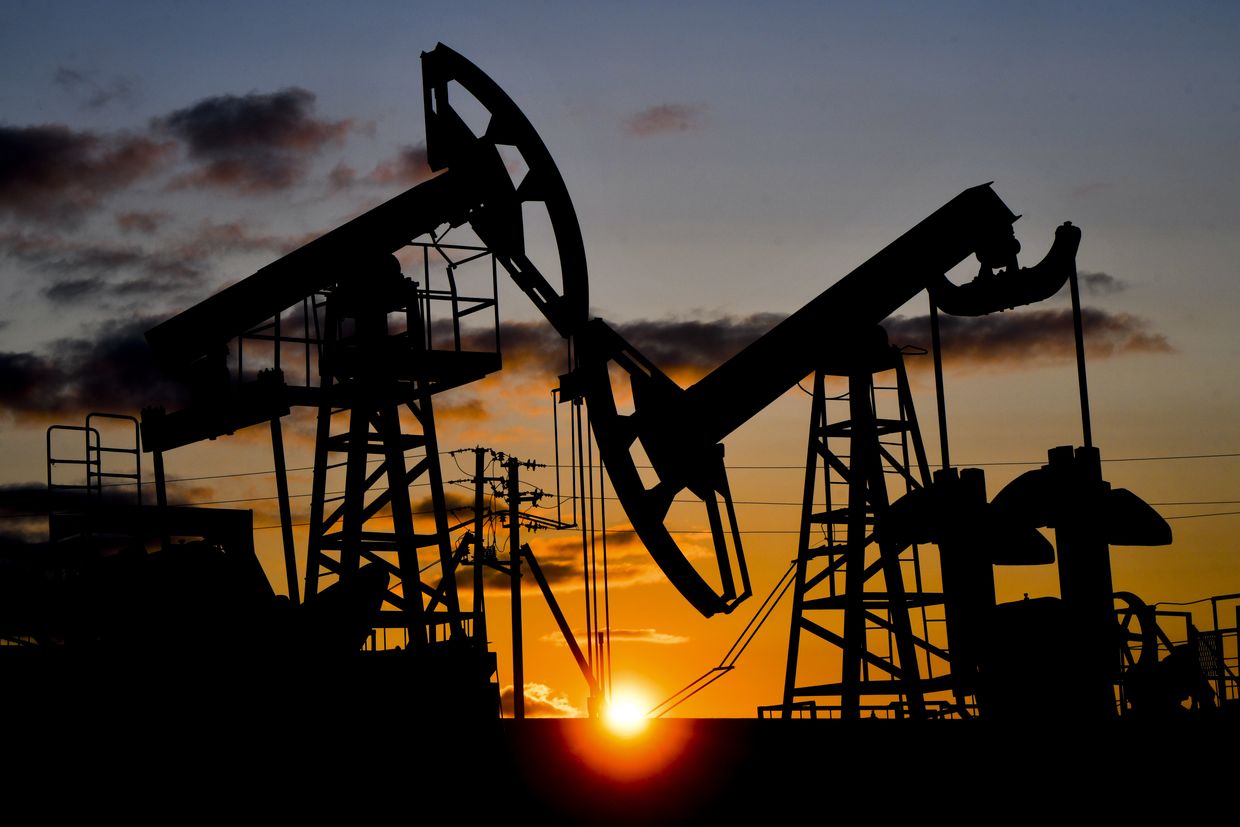
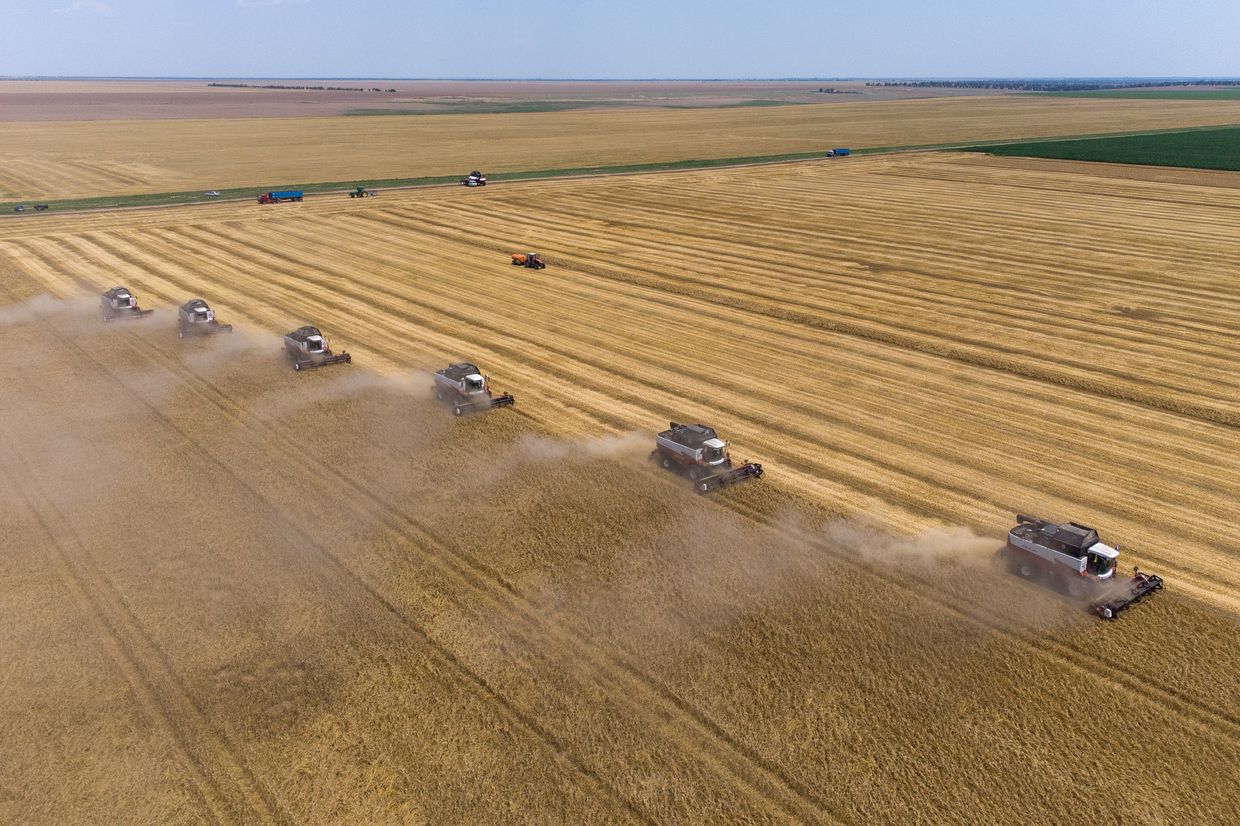

The Council of the EU on June 12 approved fresh tariffs on fertilizers and remaining agricultural goods from Russia and Belarus, aiming to reduce Russian export revenues.
The measures target those goods that have not yet been subject to additional customs duties and will enter into force on July 1. The tariffs on fertilizers will increase gradually over the next three years.
The step comes as the EU readies additional sanctions against Russia as it continues to wage its all-out war against Ukraine.
"Polish Presidency motto is 'Security, Europe!' and these measures increase our economic security by reducing dependencies from Russia," said Michal Baranowski, the trade undersecretary at the Polish Economy Ministry.
"We are further reducing Russia’s export revenues and therefore its ability to finance its brutal war. This is united Europe at its best," he said in a statement.
The new tariffs will apply to goods that made up around 15% of all agricultural imports from Russia in 2023. Fertilizer tariffs will focus on certain nitrogen-based products, the Council said in a statement.
Russian fertilizers accounted for more than a quarter of all of the EU's imports in this sector in 2023, worth almost $1.5 billion.
Apart from stifling Russia's trade revenue, the step also aims to reduce the EU's dependence on Russian and Belarusian goods, protect European farmers, and diversify the supply.
The EU adopted higher tariffs on cereals, oilseeds, and some other products from Russia and Belarus in May 2024. Earlier this year, the European Commission proposed imposing similar measures on all remaining agricultural products from the two countries.
 The Kyiv IndependentKate Tsurkan
The Kyiv IndependentKate Tsurkan